
Santorini Safety 2024: Is Santorini Safe to Visit?
With over 811,000 visitors every year, Santorini’s distinctive beauty stems from a volcanic eruption thousands of years ago, the source of its unique landscape and famous caldera.
However, looks can be misleading—so it’s wise to stay vigilant. Santorini, like any tourist haven, may pose a risk of petty theft and pickpocketing.
Of course, crime isn’t the only consideration for a safe getaway. There’s a whole checklist to get through carbon monoxide, natural disasters, tricky waves—and more.
Let’s delve into the details of staying safe in Santorini in 2024.
Is Santorini Safe?

Santorini is safe and has crime levels that are quite low. Still, stay on your toes while exploring and use some common sense. Here’s the lowdown on safety in Santorini:
- The crime rating of Santorini is very low, at 22.73.
- The most common crimes that may affect tourists are drug incidents, physical assaults, and theft.
- The public transportation on the island is extensive and reliable but requires a bit of caution to avoid getting pickpocketed.
- Taxis are the safest mode of transport, but you need to call one, as the ones parked on the street may not be licensed.
- Santorini is at a low risk of two natural disasters: volcanic eruptions and earthquakes.
- Carbon monoxide poisoning may happen in hotels and rentals that don’t have a CO detector installed, so carry a portable one.
- Beaches are safe and beautiful, but don’t walk barefoot on the black sand beaches as they tend to get really hot from the sun.
Travel Advisory for Greece
The United States travel advisory gives Greece a Level-One travel warning. This is the lightest warning reserved for countries with the lowest crime rates and minimal safety concerns. Basically, for tourists, it means exercising “normal precautions.”
Greece is categorized as a Level-One country in the Canadian travel advisory , too. But like anywhere else, the advisory warns tourists to keep an eye out for petty theft, drug-related incidents like spiking, and scams. Still, take only normal precautions to remain safe from these smaller crimes.
A Comprehensive Look at Santorini Crime Rates
Santorini boasts an impressively low crime rate of 22.73, with common offenses being drug-related incidents and theft.
Petty theft is the most common crime encountered by visitors, as confirmed by the Canadian travel advisory .
When it comes to violent crime, Santorini mirrors Greece’s overall low homicide rate, which is 0.85 incidents per 100,000 people. However, as highlighted by the Australian travel advisory , physical assaults may occur, primarily stemming from bar fights fueled by excessive alcohol consumption.
In addition to Santorini’s nightlife, large clubs also contribute to the sale and consumption of illegal narcotics. Do not purchase if offered because taking part in such a crime may not only pose safety risks but also legal consequences.
In any case, Santorini’s crime rates are significantly lower than those of several popular tourist destinations such as Paris , London , Barcelona , and Amsterdam.
Source: Numbeo , 2023 data
Police Presence in Santorini
The Greek police force, known as the Hellenic Police , operates throughout Greece, including the islands, and Santorini is no exception. The local police station on the island is named the “ Thira Police Station .”
The Hellenic Police has several departments that deal with various situations. These include the Criminal Investigation Department, focused on investigating criminal activities, the Traffic Police for road safety, and the Coast Guard for maritime security.
In addition to these responsibilities, the police force handles emergencies and provides assistance to those in need, including both residents and tourists. So, if you ever find yourself in Santorini and require police assistance, know that the Thira Police Station and its officers are there to help.
Public Transportation Safety in Santorini

The Canadian advisory deems public transportation in Santorini safe and reliable. The bus network is extensive, ferries traverse between mainland Greece and Santorini, and all of them meet European safety standards. However, be mindful of your belongings to prevent potential pickpocketing on public transportation.
When it comes to getting around Santorini, the advisory suggests that using a taxi is one of the safest and quickest modes of transportation on the island. There is no Uber in Santorini, only local taxis that you can call at +30 22860 22555.
Santorini taxis are metered. For instance, the average cost for a 15-minute ride from Thira Airport to Fira is approximately €17 – €22 or $18 – $24. Generally, taxi fares to other parts of the island are around 30€–40€ or 32$–43$ under normal traffic conditions.
All in all, a taxi is your best option for safe transportation around the island, but a bus, train, or ferry is more affordable.
Medical Care Quality in Santorini
The healthcare system in Greece is regarded as very good, with a total of 270 hospitals as of 2019. Keep in mind that private hospitals are often considered better than public ones. Additionally, private hospitals tend to have more modern equipment compared to their public counterparts.
Public hospitals in Greece may have longer waiting times due to higher patient volumes. Moreover, the likelihood of English-speaking doctors and nurses is higher in private hospitals. However, private facilities charge higher prices for their services so you may need to consider this cost when calculating the overall budget for your vacation.
For added peace of mind, consider getting travel insurance that includes medical coverage. So, before you embark on your vacation, take a moment to review your insurance coverage and confirm which hospitals fall under its umbrella.
Is It Safe to Travel Solo in Santorini?
Once again, the island is safe and secure, with minimal criminal activity. For solo travelers, Santorini is considered a very safe destination throughout the day, but common-sense precautions are still recommended, especially at night.
If you want easy access to the nightlife in the island’s heart, it’s a good idea to book at a hotel that’s in the center so you can walk home quickly. We also recommend that you don’t go overboard with alcohol consumption so that you can retain awareness of your surroundings. All in all, the locals are friendly and inviting, so you’ll generally have a good experience traveling alone there.
Perils of Nature: The Risk of Natural Disasters in Santorini
In Santorini, the primary natural disaster risks are associated with volcanic activity and seismic events, but the risk of both is very low.
Volcanic Eruption
Santorini is a volcanic island. Its distinctive crescent shape is the result of the Minoan eruption 3,600 years ago that caused the island’s center to collapse, resulting in the famed caldera. According to the Global Volcanism Program , the last eruption occurred in 1950, which is more than 70 years ago, so it’s relieving to know just how rare these disasters are.
Despite its volcanic history, the island is considered safe for tourism. Santorini’s monitoring systems detect all potential volcanic activity, and the island is well-prepared to manage such situations.
Earthquakes
Santorini is close to where the African and Eurasian tectonic plates meet, so earthquakes are possible but are usually on the mild side.
Historically, between 1994 and 2002 , Santorini experienced around 1,000 earthquakes coming from Nea Kameni and the caldera of Santorini. This timeframe is referred to as the “Crisis Period.” Still, none of the earthquakes were powerful enough to cause damage to property or locals.
That sort of frequent seismic activity hasn’t recurred in Santorini, but it’s still smart to keep an eye on earthquake trackers . Greece has seismographs and early warning systems to give you a heads-up if there’s any seismic activity. Safety first, but no need to worry about it.
Beware the Silent Threat: Carbon Monoxide Poisoning in Santorini
The good news is that Santorini has no recorded incidents from the toxic gas–carbon monoxide (CO). However, in another Greek hotspot, Corfu , there were two fatal cases. Two children were poisoned in their holiday bungalow because of a faulty water heater system.
The tricky thing about carbon monoxide is that it’s invisible and has no smell . At first, its leak might cause mild flu-like symptoms like a headache and nausea. But if you breathe it in for a long time, especially when you’re asleep and the gas is leaking, it can have serious consequences, even fatal ones. When inhaled, carbon monoxide stops the blood from carrying oxygen to cells and tissues, potentially causing paralysis, brain damage, or loss of life.
For your safety, we highly recommend getting a portable CO detector for your travels. You can put it in your hotel room and it’ll notify you if there’s a faulty gas leak in the air you’re breathing. While hotel rooms and rentals in Santorini may already have CO detectors, it’s a good idea to bring your own, just to be sure.
Serenity by the Shore: The Safety of Santorini Beaches
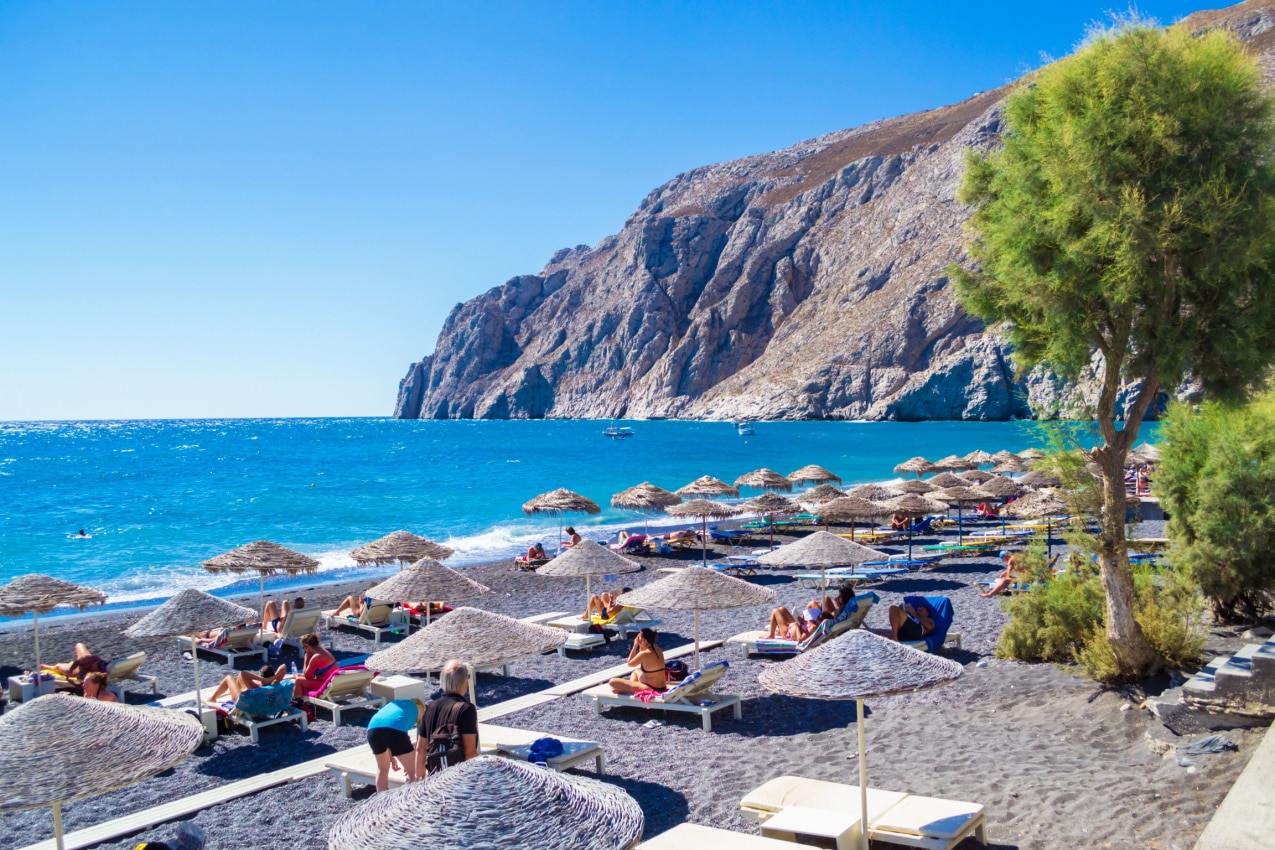
The Canadian government’s travel advisory highlights that most beaches in Greece, including those in Santorini, are supervised and have excellent safety procedures in place.
It’s still wise not to swim when there are strong winds and a wavy sea. Also, watch out for corals, urchins, and jellyfish, as they might sting or cause an infection if you touch or step on them.
The black sand beaches made of volcanic pebbles can get really hot under the sun, so when you go to the beach, resist the urge to walk barefoot. This includes the famous Perissa Beach, Kamari, and Monolithos Beach. So, keep those flip-flops at hand!
Santorini Weather Patterns: What to Expect
Santorini’s summers are hot and sunny, lasting from June to September. The average daily high temperature is above 80°F (26.6°C). July is the hottest month, with the highest temperature going up to 85°F (29.4°C).
Winter is colder and lasts from December to March–as in most areas with four-season climates. The average daily high temperature is around 63°F (17.2°C) during this period. February is the coldest month, with the lowest temperature reaching 49°F (9.4°C) and the highest reaching 58°F (14.4°C).
Santorini is cloud-free from the end of May to October. July is the clearest month, perfect for getting that golden tan–and even when it’s hot, it’s manageable. On the flip side, December is the cloudiest, with clouds covering the sky about 38% of the time.
Rainfall is rare in Santorini from May to the end of September. The driest and sunniest month is July, with an average rainfall of 0.0 inches (0mm). On the flip side, December, the cloudiest month, sees a bit more rain, with an average of 2.7 inches (68.58mm).
Monthly Average Temperatures in Santorini
When is the best time to visit santorini.
The best time to pack your bags and head to Santorini is during the shoulder season—late April to early June and September to early November. The weather is warm, sunny, and clear, and you can grab good deals on hotels and airfare.
If you’re into a more laid-back vibe and don’t mind cooler temperatures, consider visiting Santorini during the off-season—from late November to March. Some places might have reduced hours, but you’ll get a taste of a quieter side of the island. Bonus: this is the cheapest time for hotels, tours, and flights.
The peak season in Santorini, from July to August, is pure magic. It’s when the weather is at its absolute best, and the whole island comes alive. If you’re all about that summer adventure, with sunny days, vibrant streets, and lively beaches, then the peak season is perfect for you. Keep in mind that prices during the peak of summer are higher.
How to Stay Safe in Santorini
- Thieves might be lurking at tourist hotspots, restaurants, public transport, and beaches. Keep a close eye on your belongings
- Guard your drink. Criminals might try to spike it with drugs
- Locals might offer you a donkey ride. Politely decline
- Summers in Santorini are hot! Protect yourself with sunscreen and a hat, and stay hydrated
- When someone else is handling your cards, keep a close eye. Withdraw money from ATMs in malls or inside banks
- Stay up-to-date on media reports regarding any potential terrorism threats in Greece, as well as volcanic activity or earthquakes around Santorini
- If you’re steering a boat, know your boat’s weight capacity and don’t exceed it
- If you’re headed to the famous Red Beach, be aware of the potential danger of rockslides
Emergency Numbers
- Emergency: 112
- Police: 100
- Ambulance: 166
- Fire Department: 199
Farewell to Paradise
With these tips, your Santorini adventure will be nothing short of amazing and secure!
Remember, theft is the most common crime that may affect tourists, so while you’re basking in the sun, please don’t leave your valuables unattended. The same caution applies when you’re exploring charming streets, driving on public transport, or savoring a delicious meal in a restaurant.
So, rest assured, Santorini is a safe haven for travelers. But, as with any destination, good old common sense goes a long way! Safe travels.
Your email address will not be published. Required fields are marked *
Save my name, email, and website in this browser for the next time I comment.
Get Daily Travel Tips & Deals!
By proceeding, you agree to our Privacy Policy and Terms of Use .
Tips on Santorini Island Warnings or Dangers – Stay Safe!
Virtual Tourist
Travel Smarter! Sign up for our free newsletter.
Santorini Island Warnings and Dangers
Santorini is one of the Cyclades Islands and is located southeast of Greece’s mainland. While beautiful, there are plenty of dangers you need to be aware of before visiting Santorini .
Santorini’s streets can be treacherous. Many are too narrow to fit two vehicles. As a result, you’ll see more than a few locals moving around the city on mopeds, scooters, and bicycles. Give them space and don’t speed, especially while in the more populated areas. Kids play soccer in the streets and street lights and stop signs are scarce. Potholes are common obstacles throughout the island, so be alert if you choose to rent a car in Santorini . Before you get to the island, estimate how much you want to spend on transportation. You may find the safer, cheaper, and less stressful option is to hail a cab rather than fight with the traffic and chaos of Santorini’s bustling streets.
Despite all of these warnings, if you decide to rent a car, make sure you have an international driver’s license. Many rental agencies won’t ask you for one, but the police certainly will if you get pulled over or if you’re involved in an accident. You can obtain an international driver license through AAA or a similar organization.
You’ll be amazed by Santorini’s natural beauty. For generations, sheep, donkeys, and local wildlife have carved trails out of its hills. Tourists who want adventure will be more than satisfied with the many hiking trails scattered around the island. While worth the effort, many of the trails can be dangerous. Every year tourists are injured by falling rocks and crumbling trails. Talk to local guides before you decide where to go. Also, pay attention to road conditions and always carry a map.
Santorini is hot, especially in the summer. Pack plenty of sunscreen, hats, and flip flops. First-time visitors have found out the hard way that the pebbles, rocks, and sand on the beaches can be dangerous. Every year, more than a few people head home with serious burns and blisters on their feet. Santorini is also known for the “ Meltemi Wind.” This is the name given for the wind gusts that blow from north to south across the Aegan Sea. During the summer months, the wind is quite tolerable, and often a welcome distraction from the heat. Later in the year, however, the wind can be quite strong. Plan your trip accordingly and pay attention to the weather forecasts before you head to Santorini .
Editor’s Note: The information contained on this page was compiled using real traveler reviews about warnings and dangers on Santorini Island.
We hand-pick everything we recommend and select items through testing and reviews. Some products are sent to us free of charge with no incentive to offer a favorable review. We offer our unbiased opinions and do not accept compensation to review products. All items are in stock and prices are accurate at the time of publication. If you buy something through our links, we may earn a commission.
Top Fares From

Don't see a fare you like? View all flight deals from your city.
Today's top travel deals.
Brought to you by ShermansTravel
Australia: Upscale, 8-Night Cairns, the Gold...
Down Under Answers

Ohio: Daily Car Rentals from Cincinnati

Shop and Save with Country Inns...
Patricia Magaña

Trending on SmarterTravel
Is Santorini Safe?
Greece › Santorini › Safety Updated: March 21, 2021 By Santorini Dave
Best Hotels in Santorini Where to Stay in Santorini Maps of Santorini Videos of Santorini
Is Santorini safe to visit in 2021?
Yes, Santorini is a very safe destination. Of course, there are risks everywhere and Santorini has its share of freak accidents: falling rock, aggressive donkeys, crazy young guys on ski jets. And like everywhere the biggest risk in Santorini is vehicle accidents. Always wear a seat belt, don’t drink alcohol and drive, don’t tour wineries while driving, give local buses a wide berth while walking (there are many spots around the island where buses and pedestrians share the road), and don’t rent a motorbike, ATV, or scooter if you don’t regularly use or drive one at home. The jet ski tour to the volcano is one of the best things to do on Santorini but jet skis can be dangerous if you do stupid stuff.
An Extra Word About Motorbikes and Scooters
This is the number one way people (at least people I know) get injured while traveling. I’ve had friends, family, readers, and many many people I’ve met while traveling that were seriously injured riding a motorcycle or scooter when they’re not used to driving one. Actually, I’m not sure I can think of someone who went to the hospital while traveling where a motorbike or scooter wasn’t the cause. The roads in Santorini are narrow, have lots of loose gravel, and locals drive fast and carelessly. This is not the place to learn how to drive a motorbike.
Is Santorini safe at night?
Any place where there is alcohol, there is some risk. Usual precautions apply but Santorini has very few problems with fights, violence, drugs, or organized criminal activity. The biggest risk at night is walking home down the caldera after too many drinks. (I’m only half-joking.)
Is Santorini safe for single travelers and female travelers?
Once again, yes, Santorini has a safe vibe and little outright criminal activity. Single female travelers will be fine throughout the day in every corner of the island. At night common-sense precautions are still advised. If you want easy access to the nightlife in Fira while staying at a nearby hotel these are good choices: Cosmopolitan Hotel (luxury hotel on the caldera a 2 minute from clubs) and Petini’s Place (nice budget hotel a 1 minute walk from clubs). Both hotels are a short walk down busy pedestrian lanes from the main Fira clubs like 2 Brothers, Koo Club, Kira Thira Jazz Club, Tropical, and Enigma.
The Best Hotels on Santorini Santorini Hotel Reviews Maps of Santorini The Best Tours and Things to Do in Santorini The Best Hotels on Mykonos The Best Hotels on Crete The Best Luxury Hotels in Athens
About Santorini Dave

Do you know any places for camping at any of these destinations in Greece? I am thinking of and wanting to travel there this September. And would be on a really tight cheap budget if I did. Any suggestions on resources? Thanks!!!
One of the nicest places to camp in the Greek islands is at Coralli Bungalows in Serifos. Right on the beach, nice pool and restaurant, fun vibe, walking distance to port.
💗💗💗💗 Love your response to that question about refugees. Thank you!!! 💗💗💗
Dave, Hi. I.wonder if you could help. We visit Hersonnisis every year from the UK. We’d love a 2 day one night stay in Santorini with a photo shoot.
Problem. My partner is on dialysis Tuesday, Thursday, Saturday mornings in Heraklion so we can’t book a regular tour.
My thoughts are this. He goes to dialysis Thursday morning, I meet him at the ferry port afterward and we take an afternoon sailing. Arrive Santorini, take a bus to Oia and stay overnight in a mid-range hotel, come back on the Friday afternoon sailing to Crete.
Is this possible do you think and can you advise on photographers, hotels?
Best wishes.
Sounds good. My thoughts: with limited time it would be better to stay in Fira where there are direct buses to and from the ferry port. Adding the additional bus to Oia adds more time. Ferries can be canceled due to high winds, so probably better to visit Saturday and Sunday. If your return ferry is canceled you’ll still have Monday to get back for dialysis on Tuesday. For photographers on Santorini I have a page on that so take a look.
Worrying about safety for upcoming trip to Santorini. Are the refugees from Syria a problem for travelers to Santorini?
First off, the refugees are not a risk to travelers – Greece, Turkey, or anywhere. They are families and people looking for a better life. They’re not criminals. Second, the number of refugees crossing into Greece has plummeted over the last two years. And Third, Santorini is a long way from Turkey and has never had any number of refugees (these people are not looking to go to one of the most expensive destinations in Europe).
Leave a Reply Cancel reply
Your email address will not be published. Required fields are marked *

- Catamaran cruises TOP
- Volcano tours
- Sunset cruises & boat tours
- Private boat tours TRENDING
- Yacht charter & boat rental
- Motor Yacht cruises
- See all Santorini tours
- Honeymoon experiences
- Horse Riding
- Food & drink experiences
- Photo tours
- Sailing cruises
- Water sports & activities
- Hotels with Private Pool TOP
- Hotels with Infinity Pool
- Santorini Villas
- Santorini Suites
- Hotels on the Caldera TOP
- Honeymoon Hotels POPULAR
- Hotels with Swimming Pools
- Best Santorini Hotels
- Affordable Hotels with Caldera View
- See all hotels
- 1. Watch the Sunset
- 2. Join a Catamaran Cruise
- 3. Walk on the Caldera
- 4. Visit Volcano and Hot Springs
- 5. Swim in the Black Beach
- 6. Visit Red Beach
- 7. Delish Dinner at Ammoudi
- 8. Visit a Winery on Caldera
- 9. Visit the Charming Prophet Elias Monastery
- 10. Visit Akrotiri Excavations
- Attractions
- Bars & Night Clubs
- Volcano & Hot Springs POPULAR
- First time in Santorini
- How to get there
- Where to stay
- Getting around
- Best time to visit Santorini
- Where to eat
- Where is Santorini?
- Airport transfer
- Port (Athinios) transfer
- Visit Santorini on a Cruise Ship
- Santorini with your Family
- Solo Travel in Santorini
- Low-Budget Trip in Santorini
- See all travel guides
- Fly over Fira
- Fly over Oia
- Fly over Firostefani
- Fly over Imerovigli
- Explore Santorini's Caldera
- Log in

Travel Guides
Traveler information, santorini and covid-19 (updated): stay safe while on vacation.

Welcome to Greece! All travellers arriving in Greece, regardless of their country of origin, are no longer required to display a valid certificate of vaccination or recovery from COVID-19, or evidence of a negative test result from SARS-CoV-2 infection (PCR or Rapid Antigen test).
During this difficult time for humanity, due to the pandemic of the new coronavirus, the Greek authorities took measures to protect the lives of all citizens and visitors right away !
The Greek government has introduced health protocols and measures to ensure the safety of visitors , which must be followed by hoteliers, tour operators, restaurants, cafes, etc.
If you are concerned about social distancing, there are plenty of outdoor spaces and activities in Santorini to have a great time with your loved ones!
Top Question Q: Where can I get the PCR test or Antigen (Rapid) test for Covid-19 in Santorini?
A: There are medical diagnostic centres in Santorini where you can get the molecular-based test (RT-PCR test) or Antigen test for Coronavirus (COVID-19): - Santorini Central Clinic , Fira (Monday-Sunday 08:00-20:00, Tel. +30 2286021728 , Book online ) - PROLIPSI Lab , Mesaria (Monday-Friday 08:00-20:00, Saturday 08:00-18:00) & Emporio (Monday-Friday 08:00-14:00 and 17:30-19:00 , Saturday 08:00-13:00, Tel. +30 2286033374 , Book online )
- Santorini MedLife Clinic , Mesaria (Monday-Sunday 09:00-20:00, Tel. +30 2286030403 ) - Santorini Iatrica , Mesaria (Monday-Friday 07:30-19:00, Saturday 07:30-14:30, Tel. +30 2286030637 )
2 Reasons why Santorini is a safe holiday destination!
Welcome to santorini, best tours & activities.
We provide the best tours, cruises and activities in Santorini, at the best possible prices you can book online. Our friendly support team is there for you throughout the whole procedure, from booking to completing the experience.

Hand-picked hotels
We have compiled hotel lists, perfectly tailored to suit any budget or interests. We are the only website to have collected hotels located on the caldera offering uninterrupted views to the volcano. Browse the list of the Hotels on the Caldera .

Travel guides
We have created detailed travel guides for you, featuring up-to-date travel information on attractions, hotels, restaurants, wineries, nightlife, travel tips, things to do, including how to get there, written by our local travel experts.

Get any local advice. We live here!
Our awesome support team will be more than glad to help you select the right hotel, organize your experience/tour or provide any local advice.

Fly over Santorini's caldera
We have recorded the hotels of Santorini’s Caldera for you from above, so that you can choose the hotel that provides the view of your desire. We help you locate the ideal place for your stay in a fun way.

Explore Santorini with the highest rated Tours and Activities
Our picks will help you make the most of your visit to santorini.

What to do in Santorini
Discover the most popular sights, places and activities in santorini, hand-picked hotels for you, browse through our hotel lists, perfectly crafted to suit your interests and budget, santorini travel guides, discover santorini island with our travel guides, aerial view of santorini's caldera, suggested hotels & villas in santorini, from budget-friendly suites and villas to 5-star hotels - there's something here for everyone.

Experience Santorini your way with our FREE personalized trip planner ! Just enter your travel dates and style, and you'll get instantly a custom itinerary, tailored to your desires!
My Trip Plan
Hey! We’re here for you!
Our travel experts from santorini will be more than glad to help you select the right hotel and find the best experiences on this heavenly greek island.

We’re Santorini’s leading marketplace to explore and book unforgettable travel experiences. Santorini View is operated by Atlantis Software E-Services, a reliable travel agency licensed by the Greek National Tourism Organization with registry number ΜΗ.Τ.Ε. 0206E70000659501.
We offer top-quality , personalized tours and activities tailored to our guests' preferences and interests, with invaluable advice from our team of local experts. Our goal is to ensure that travellers, have the best possible experience in Santorini with access to the island's finest offerings.
Tours & Cruises
- Catamaran cruises POPULAR
- Sunset cruises & boat tours
- Bus & minivan tours
- Water sports
- Hotels with Private Pool
- Hotels on the Caldera
- Honeymoon Hotels
- See all Santorini hotels
Plan your trip
- How to get to Santorini
- Weather in Santorini
- Interactive Santorini Map

Is Santorini Safe to Visit in 2024? | Safety Concerns
Written by: Author Andrew Helling | Reviewed by: Editorial Team

Andrew Helling is a licensed pilot, travel enthusiast, and the founder of Travellers Worldwide whose travel expertise has been quoted in countless publications across the web. Armed with a laptop and a Wi-Fi connection, he loves exploring the world with his wife and son and is always on the hunt for cheap flights and new adventures... Learn More

The Editorial Team is comprised of several freelance travel enthusiasts that share a love of visiting new places. Using both personal experience and third-party research, the team brings a unique perspective to their writing that might even feel like your travel agent is talking to you themselves... Learn More
Posted on Last updated: January 12, 2024 - Travellers Worldwide is reader-supported. If you buy a product we link to, we may earn a commission. Learn more
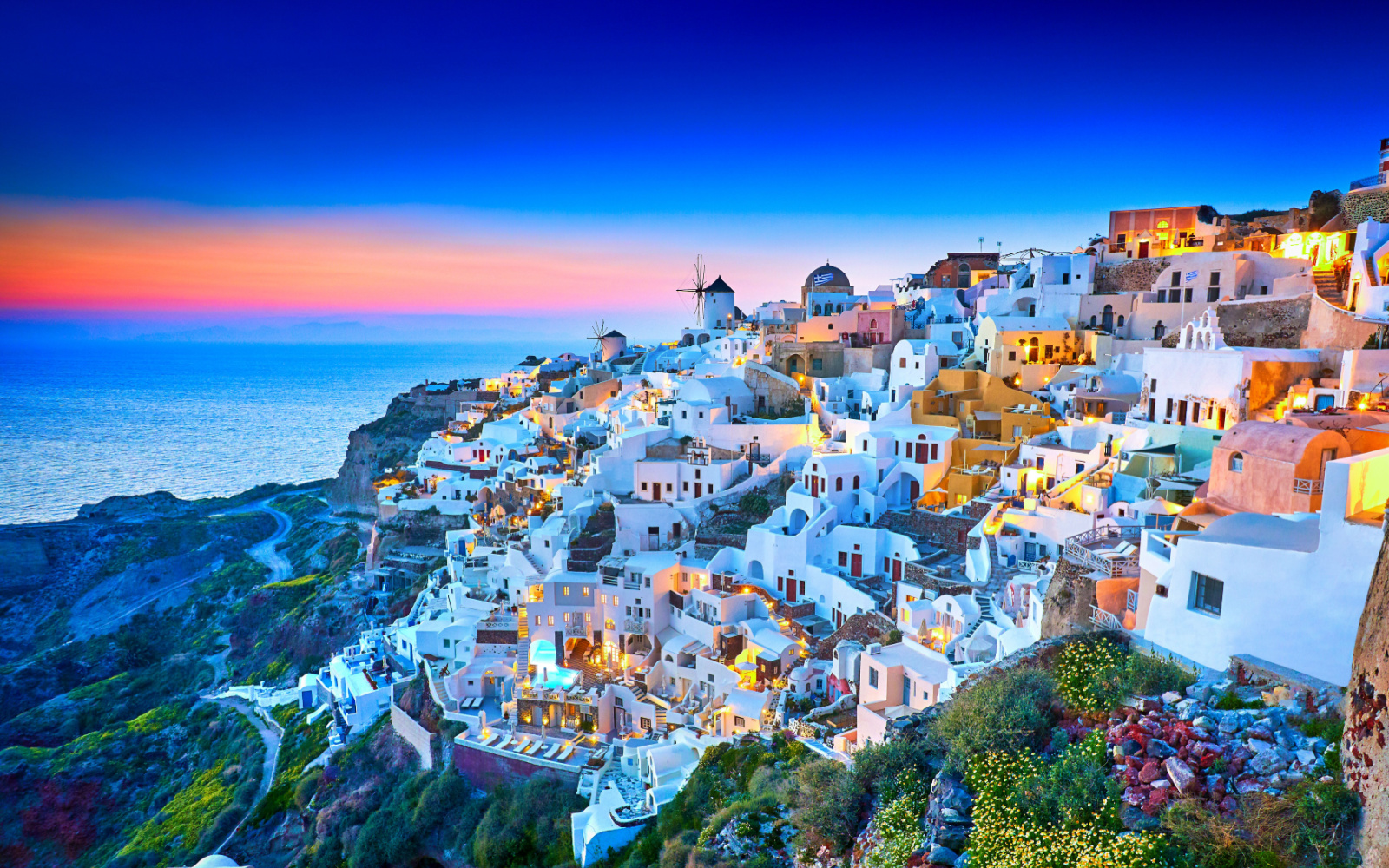
Is Santorini safe to visit in 2024?
Santorini is generally very safe for tourists, with low crime rates and a close-knit community. However, during the high tourist season, there can be petty theft, scams, drug-related issues, and occasional personal assaults due to the influx of crowds. Despite these concerns, Santorini remains relatively safe.
The Greek island of Santorini is one of the country’s most popular tourist destinations. Every year, an estimated 811,000 passengers pass through the island’s airport — and thousands more visit by ferry and cruise ship.
Most tourists flock to this storied island thanks to the iconic views of Oia, the main town, with its whitewashed houses, blue roofs, and stunning sunset views.
The volcanic island also has some of the best beaches in the Aegean, including the famous Kamari Beach. But while it’s beautiful, is Santorini safe to visit? We’ll explain below.
Is Santorini Safe to Visit in 2024?
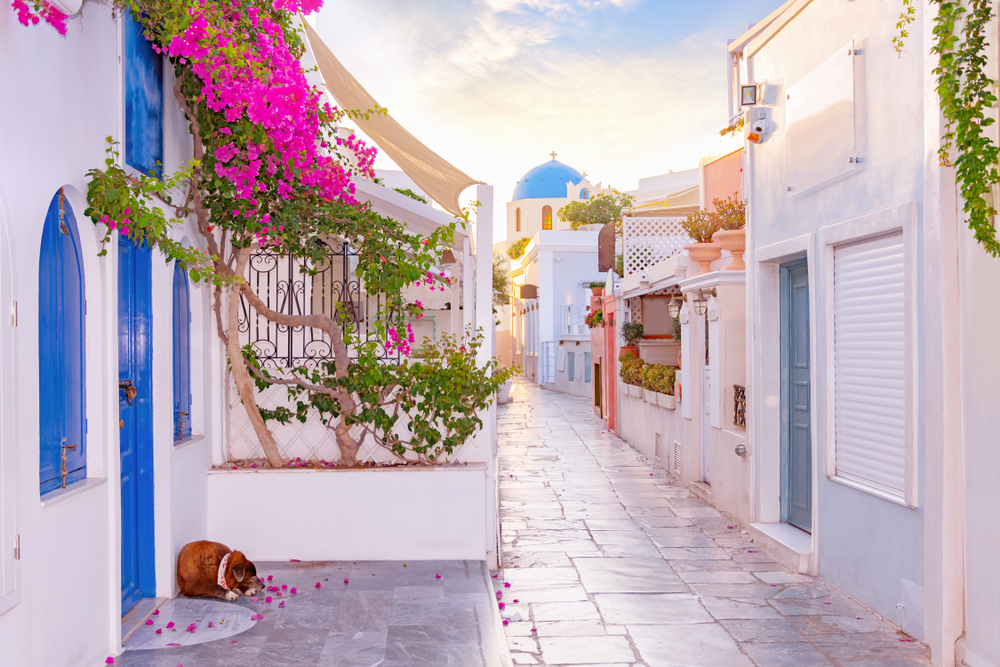
Marina Datsenko/Shutterstock
Yes, Santorini is very safe to visit! The island is safe and welcoming and has a very low crime rate.
However, you may meet with some annoyances during your trip, such as crowds and very hot weather, especially if you visit during the summer.
In general, the country of Greece is very safe to visit. Most countries, such as the United States , just tell their citizens to exercise a few normal precautions while they are visiting.
The United States State Department, like many other countries, places the entire country of Greece under a Level One travel advisory. Greece experiences some problems, such as high crime in certain areas and the threat of civil unrest.
However, these risks are confined to Greece’s big cities such as Athens or Thessaloniki. For some perspective, the permanent population of Santorini is just about 25,000 people .
Santorini is a small, close-knit community with little political importance for Greece as a whole, making it an extremely unlikely target for crime, terrorism, or violent demonstrations.
However, the island does experience some problems, which get exacerbated by the influx of crowds during the high tourist season. The most common crimes are:
- Petty theft
- Personal assault
Although the Santorini community takes precautions to keep visitors safe, with so many crowds, it is hard to eliminate all crime. However, despite the risk of some forms of crime, Santorini overall is still fairly safe.
Besides crime, you should be prepared for the risk of extreme weather and natural disasters when visiting Santorini. In their travel advisories for Greece, some countries such as the United Kingdom mention the risk of extreme heat waves during the summer.
If you are traveling during the summer, make sure you take precautions to protect yourself from the heat. Summer in Greece is also wildfire season.
It would be a mistake to think that wildfires are just a mainland problem as islands such as Rhodes were devastated by the 2023 wildfire season.
Santorini has a lower risk of wildfires than many other islands due to its low vegetation, and the Cycladic Islands in general are at low risk of wildfires. However, the situation could change at any moment if you travel during the summer.
So make sure that you follow weather alerts and government advisories.
Santorini is also a volcanic island, and there is some risk of volcanic or seismic activity. Although the caldera itself is dormant, there is an active underwater volcano just a few kilometers away from the island that scientists are monitoring .
The risk of a volcanic eruption affecting your trip to Santorini is still fairly low, although it might be a good idea to read the news right before your trip to see if scientists put out any alerts.
Crime in Santorini
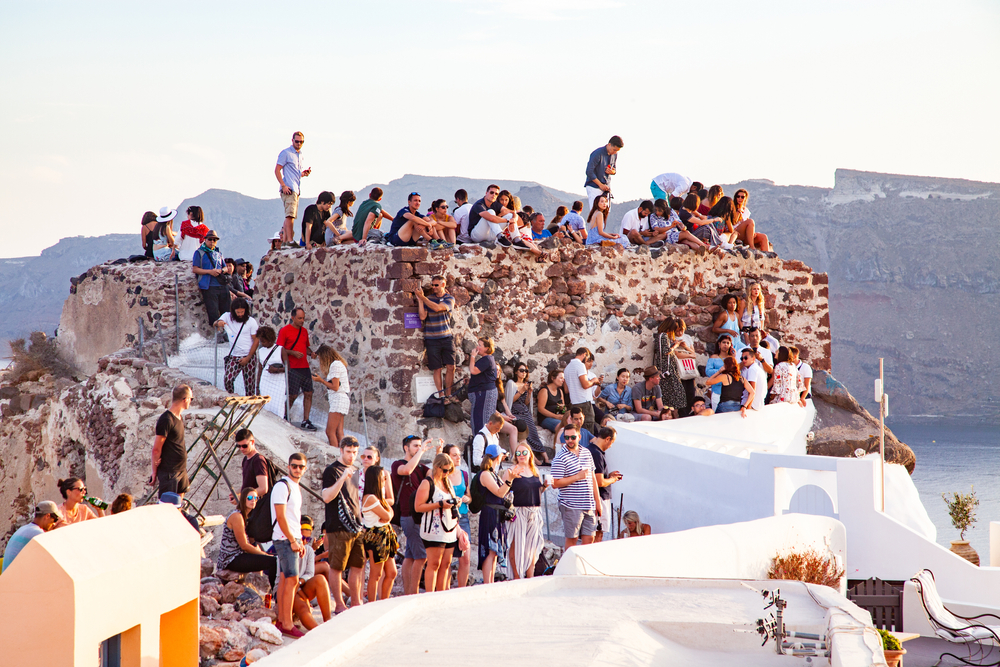
Melinda Nagy/Shutterstock
Santorini has a fairly low crime rate, even by Greek standards. Although crime still happens, you don’t have to be constantly vigilant because it is not omnipresent.
According to Numbeo, Santorini has a low crime rate. It scores a 22.73 out of 100 on the site’s crime index, which is a low value. Although the site issues the caveat that it doesn’t have enough data to paint a complete picture of crime in Santorini.
Numbeo also offers a breakdown of crime according to type. People are generally most worried about petty crimes and property crimes. The most common offenses are corruption, drug offenses, and theft.
People report some concern about crime increasing over the past few years, but that is a trend felt globally as places come out of COVID-19 lockdowns.
The good news is that violent crime is fairly low in Santorini, although incidents can happen. The overall violent crime rate in Greece is low. The country only has a homicide rate of 0.85 incidents per 100,000 people .
When the homicide rate is this low, the rate of other violent crimes is usually very low as well. As a tourist, you should be aware of some crime trends in Santorini.
Many petty crimes such as theft and scams do tend to target tourists. That’s because tourists are perceived as easier targets since they are less familiar with the island than the locals, especially around party beaches where they tend to be inebriated.
It would be a mistake to assume that all locals you meet are out to get you, since many are friendly and welcoming, but it’s a good idea to be on your guard.
Crime rates tend to be higher during the summer, which is the high season for tourism. That is because the bigger crowds provide both a more attractive target for criminals and better cover for thieves (many pose as fellow travelers, not locals).
The presence of large clubs and Santorini’s reputation as a party destination also attracts illicit activities such as the drug trade. That doesn’t mean that the summer is a danger zone, but just be prepared for a bit more crime than usual.
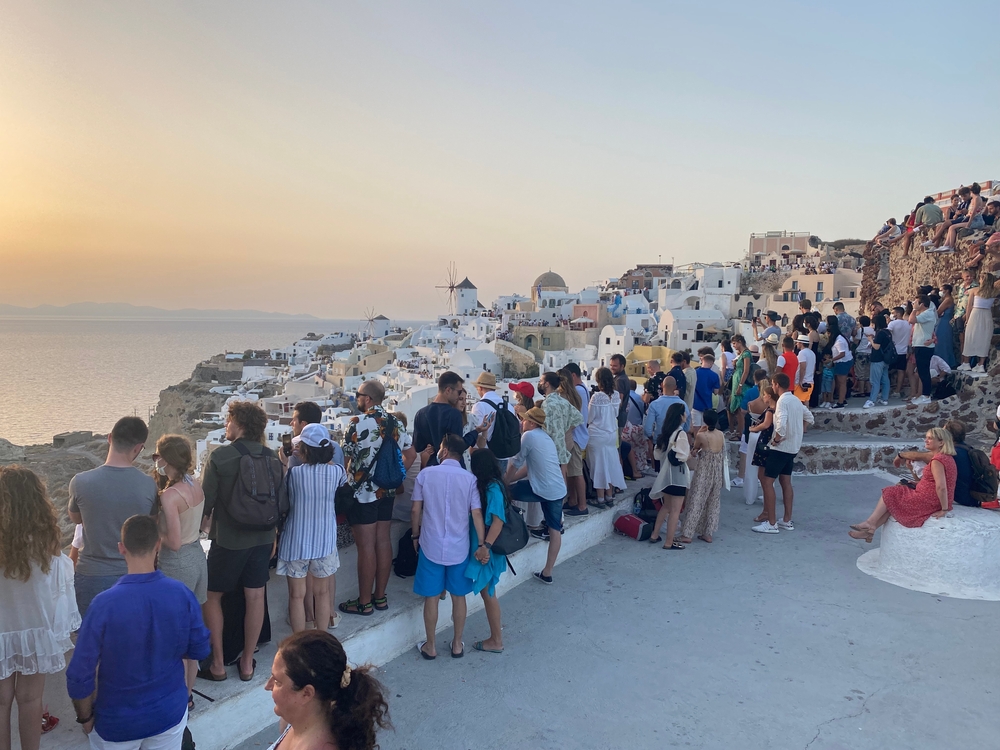
Santorini, Greece, August 2, 2021. Crowd waiting to photograph the sunset at Oia/ Eric Isselee/Shutterstock
Petty theft is the most common crime you might encounter during your trip to Santorini. As the Canadian government warns in its travel advisory for Greece, petty theft is common in popular tourist attractions including Santorini.
Common forms of petty theft in Santorini include pickpocketing, bag snatching, and scams. Thieves often target tourists because they know they are more likely to have valuables on their person and be lucrative targets.
You don’t have to invest in money belts, locks for your things, and pepper spray for your trip to Santorini, but some basic precautions are enough to keep you safe.
One important precaution to take is to make sure that you don’t leave your things unattended. Thieves take advantage of people’s distraction when they put down their bags to take a photo or leave their wallet out at the beach.
Another precaution to take is to make sure that you have physical contact on your valuables while moving around the town. Don’t put your valuables in places where a thief can easily take them without your notice, such as your back pocket or a loose, open bag.
When you sit down in a local business, keep your bag in your lap instead of hanging off the back of your chair.
Break-ins can also happen in Santorini. Visitors have complained about break-ins in their accommodation before. Read the reviews before booking a private apartment or villa to see if there have been thefts before.
Hotels tend to be safer because they have security, and most rooms will have safes for your valuables.
If you do end up staying in a private accommodation, make sure that you always lock the doors and close the windows when you leave the room or go to sleep.
Put your valuables in your room safe if you have one or put them somewhere out of sight if you don’t have one. Try not to advertise the fact that you have expensive camera equipment, jewelry, or lots of cash, and don’t tell people where you are staying.
Although violent crime in Santorini is rare, assault does happen and sometimes involves tourists. The Australian government warns tourists that physical and sexual assaults have happened in Santorini in its travel advisory for Greece.
Most cases of assault happen around the party scene in Santorini. Physical assaults sometimes happen when drunken bar fights get out of control. While you should enjoy your time in Santorini, make sure that you don’t go overboard with alcohol.
Limit your drinks and consume less than you would at home as you want to keep some situational awareness.
Unfortunately, female tourists are at additional risk in Santorini of sexual assaults, although men are at risk as well. If you are a woman traveling in Santorini, take precautions, especially when going to the clubs or bars.
Check out the nightlife with a group, make sure you check on each other, and don’t go off with strangers or let your friends do so.
Drink spiking occurs in Santorini’s bars and clubs. The targets can be men or women. Criminals often spike drinks so they can rob, physically assault, or sexually assault their victims.
Try to prevent drink spiking by keeping an eye on your drink at all times, physically covering your cup while dancing, and not accepting drinks from strangers.
Avoiding Bad Areas
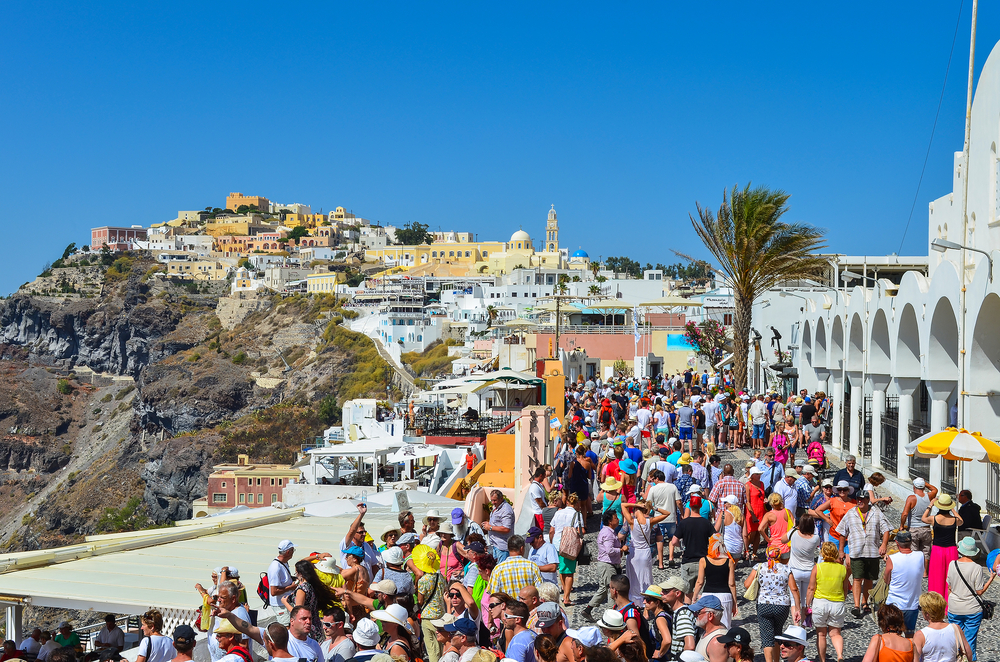
SANTORINI – GREECE, SEPTEMBER 13 2013: Many tourists and visitors arrive from the cruise ships to Santorini island./Pit Stock/Shutterstock
There are no areas in Santorini that are so dangerous that you have to avoid them completely. However, there are areas where the crime rate is a bit higher, and you might want to exercise some caution.
Rates of pickpocketing and theft tend to be higher in popular tourist destinations such as Oia than more out-of-the-way villages. The crime rate also tends to be higher around nightlife areas or party beaches such as the village of Perissa or near Perivolos Beach.
Frequently Asked Questions

Zigres/Shutterstock
Here are a few common questions people ask before visiting Santorini:
Is it safe to walk in Santorini at night?
It is mostly safe to walk in Santorini at night. However, you should be careful around popular party areas as they can get rowdy after dark.
Is Santorini safe for female travelers?
Santorini is mostly safe for female travelers. However, women have to take additional precautions when exploring the island’s nightlife.
What should I be careful of in Santorini?
In Santorini, be careful of pickpockets and scammers. Make sure that you are mindful of visiting respectfully, which means not trespassing, disturbing the locals, or participating in animal abuse and riding the donkeys.
Is it safe to walk alone in Santorini?
Traveling alone is safe in Santorini. However, you shouldn’t go to clubs alone, especially if you are a female traveler. Try to find a group from your hostel to go with.
Is seven days in Santorini too much?
If you are hoping to spend a lot of time relaxing on the beach, seven days in Santorini will be very relaxing. However, if you’re a more active traveler, you may get bored after two days on the small island.
So, Is Santorini Safe to Visit?
Santorini is a mostly safe Greek destination to visit. While you should be aware of some risks, such as theft, your vacation will go smoothly.
So, with so much to see and do, what are you waiting for — book your trip today and experience for yourself all that Santorini has to offer. Happy travels!
When to Go: The Best & Worst Times to Visit Santorini (Updated for 2024) Where to Stay: Where to Stay in Santorini in 2024 | Best Areas & Hotels What to Do: 15 Best Restaurants in Santorini (Our Favorites in 2024) What It Costs: What a Trip to Santorini Costs in 2024 | Average Prices
Day Trips from Athens
48 Hours in Athens
Top Things to Do
Top Temple Sites
Best Beaches
Mount Olympus
Ancient Greek Theaters
Foods to Try
Top Restaurants in Athens
Best Bars in Athens
Best Time to Visit
Weather & Climate
Athens International Airport Guide
Cities to Visit
Neighborhoods to Explore
Traveling Safely in Greece
Despite periods of unrest, Greece remains relatively safe
:max_bytes(150000):strip_icc():format(webp)/50283_10150115088505451_4770943_n-56a3b1065f9b58b7d0d3321d.jpg)
Pedro Szekely/Flickr
Over the years, Greece has had occasional periods of unrest that have led travelers to wonder how safe the country is.
The bottom line: There are risks in traveling to Greece , including some unique to the country, but as of April 2020, the U.S. Department of State does not discourage American travelers from visiting the country and urges travelers to exercise normal precautions.
Concerns About Greece's Safety
Greece has been the site of many domestic terrorist attacks. In addition, the U.S. Department of State warns of the potential of transnational terrorist attacks in European countries. The warning indicates that all European countries are potentially vulnerable to terrorist attacks focused on public areas where tourists and locals may gather and provides detailed safety information to help tourists avoid becoming an opportunistic target.
The State Department also notes the following safety concerns about Greece:
- Strikes and demonstrations are common and they can escalate to violence. On Nov. 17 every year, you can expect to see demonstrations. This is the anniversary of the 1973 student uprising against the military regime.
- Beware of violent anarchist groups. Some use university campuses as a refuge. They may join in with peaceful demonstrations which then turn violent.
As in many European cities, there are warnings about crimes targeting tourists. The U.S. Department of State urges caution in Greek cities as crimes like pick-pocketing and purse snatching are known to take place in tourist areas, on public transportation (especially the Metro), and in Thessaloniki shopping areas. Car break-ins have been reported and the U.S. Embassy has received reports of alcohol-related attacks targeting individual tourists at some holiday resorts and bars.
Be careful, also, of the dangerous and often homemade celebratory fireworks for Greek Orthodox Easter celebrations at midnight on Holy Saturday.
Areas to Avoid in Greece
If there is rioting for any reason, these are the areas to avoid:
Downtown metropolitan areas: These areas are often the site of protests. In Athens, avoid the area around Syntagma Square, Panepistimou, and Embassy Row. Unfortunately, this also includes some of Athens' finest hotels.
University campuses: Violent anarchist groups have used campuses as a place of refuge and so the State Department warns that demonstrators frequently gather in the Polytechnic University region. The department also warns against going near Aristotle University.
While TV images can be scary in times of unrest, Greece has a long "tradition" of vigorous civil protest. Usually, no one gets hurt and the violence is directed at property, not people. If there are demonstrations and tear gas is used, that can affect the air quality of the immediate area. If the streets are filled with demonstrators, you can expect closures and transportation difficulties. Needless to say, sightseeing will be curtailed.
Spots For a Peaceful Trip in Greece
The large Greek cities are the most affected by demonstrations and strikes. Avoid the big cities and plan your trip to one of these more peaceful destinations:
- The Greek Islands : Santorini, Crete, Rhodes, Lesbos, and Corfu are all good options. On the larger islands, such as Crete and Corfu, there may be some disturbances in the major towns in times of stress, but nothing like what you would experience in Athens or Thessaloniki. If it concerns you, choose a hotel outside of the city centers of Heraklion, Chania, Thessaloniki, Rhodes City and Corfu Town, though the last two are rarely involved in civil disturbances.
- The Greek countryside: Places with older populations and spots that are a bit out of the way are likely to remain quiet. Nafplion, on the Peloponnese peninsula , is a pleasant town providing a good base for day trips to Corinth, Epidaurus and even across the Rio-Antirio Bridge to Delphi.
- A Greek Islands cruise: A Greek cruise is a great option, as the ships have the ability to skip a port stop if there are any problems developing. You get the full benefit of sea and sun, and you have mobility in your favor.
Tips for a Safer and Easier Trip
Consider these tips when traveling to Greece:
- Have a cell phone that works in Greece . Buy a pay-as-you-go phone there if necessary. An innkeeper trying to alert you to a situation may not want to make a pricey international call. Enter your hotel numbers and other important numbers in your cell phone, like sightseeing locations and restaurants, so you can call and ask if they are open, if they are accessible or if there is an alternate route. Keep your cell phone charged and have a backup power source.
- Travel light and smart. Dragging lots of luggage makes everything harder. Take half of what you think you'll need. Scale it down. Take the smaller camera. Tear out the chapter of the guidebook that you need or take a digital picture of it and avoid papers altogether. Forget the shoulder bag. Use a small backpack; you may want one with a strong metal grid inside.
- Buy a good map before you go. And keep it with you. If you do find your route blocked, you'll have options and if you call someone for assistance, you can understand their directions better. The Athens map provided by the GNTO office at the airport is excellent, and it's free. A paper map is still the best way to orient yourself without endlessly zooming in or out on a small screen and using up what may be precious battery power. Use your cell phone or another device alongside the paper map for detail.
- Take enough medication with you for twice the length of your trip. Pack one amount in your luggage and one in your carry-on. Keep at least a day or two's supply on you in a small pill container.
- Have a color copy of your passport with you and another copy in your luggage, along with extra copies of your itinerary. Email digital copies to an email account you can access via the internet.
- Enroll in the Smart Traveler Enrollment Program ( STEP ) to receive security messages and make it easier for the American Embassy to locate you in an emergency.
- Learn a few words of Greek and enough of the Greek alphabet to decipher street signs. It can warm your welcome and at the same time, help you stay on your route, which is crucial if you have to make last-minute changes.
- Talk to the Greeks. They likely know what is going on and will be happy to tell you, share their opinions, their politics and their advice. Keep tabs on things by reading English language newspapers, watching the local news station and asking questions at your hotel.
Travel Insurance and Trip Cancellation
If you become aware of unrest in Greek cities or develop concerns, you may decide to cancel your trip. Whether or not your travel insurance covers you if you cancel depends on your policy. Many travel insurers allow a cancellation if there is civil unrest in your destination or a region you must travel through. Contact your insurance company directly for details.
Note: If a protest or strike is predicted before you get on your plane, your travel insurance company may refuse to cover your expenses. Make sure you ask if the company excludes any planned incidents. And remember: Independence Day (March 25) and Nov. 17 often see protests in Greece.
2020 Travel Warnings for Countries in Africa
What Travelers Need to Know About Earthquakes in Greece
Is It Safe in Germany?
Is It Safe in Europe?
Is It Safe in Colombia?
Is It Safe in Africa?
Greece Travel Advisories and Warnings
Is it Safe in France?
Is it Safe in Kashmir?
Is Bangkok Safe?
Is It Safe in South America?
Hurricane Season in Mexico
Avoid these Dangerous Places in Southeast Asia
Travel to Mexican Border Towns From the American Southwest
Is It Safe to Travel to Morocco?
How to Stay Safe on a Trip to the Dominican Republic
Cookies on GOV.UK
We use some essential cookies to make this website work.
We’d like to set additional cookies to understand how you use GOV.UK, remember your settings and improve government services.
We also use cookies set by other sites to help us deliver content from their services.
You have accepted additional cookies. You can change your cookie settings at any time.
You have rejected additional cookies. You can change your cookie settings at any time.
- Passports, travel and living abroad
- Travel abroad
- Foreign travel advice
Warnings and insurance
The Foreign, Commonwealth & Development Office ( FCDO ) provides advice about risks of travel to help British nationals make informed decisions. Find out more about FCDO travel advice .
Before you travel
No travel can be guaranteed safe. Read all the advice in this guide as well as support for British nationals abroad which includes:
- advice on preparing for travel abroad and reducing risks
- information for women, LGBT+ and disabled travellers
Follow and contact FCDO travel on X (formerly known as Twitter), Facebook and Instagram . You can also sign up to get email notifications when this advice is updated.
Travel insurance
If you choose to travel, research your destinations and get appropriate travel insurance . Insurance should cover your itinerary, planned activities and expenses in an emergency.
Related content
Is this page useful.
- Yes this page is useful
- No this page is not useful
Help us improve GOV.UK
Don’t include personal or financial information like your National Insurance number or credit card details.
To help us improve GOV.UK, we’d like to know more about your visit today. We’ll send you a link to a feedback form. It will take only 2 minutes to fill in. Don’t worry we won’t send you spam or share your email address with anyone.
Nomadic Matt's Travel Site
Travel Better, Cheaper, Longer
Santorini Travel Guide
Last Updated: March 12, 2024
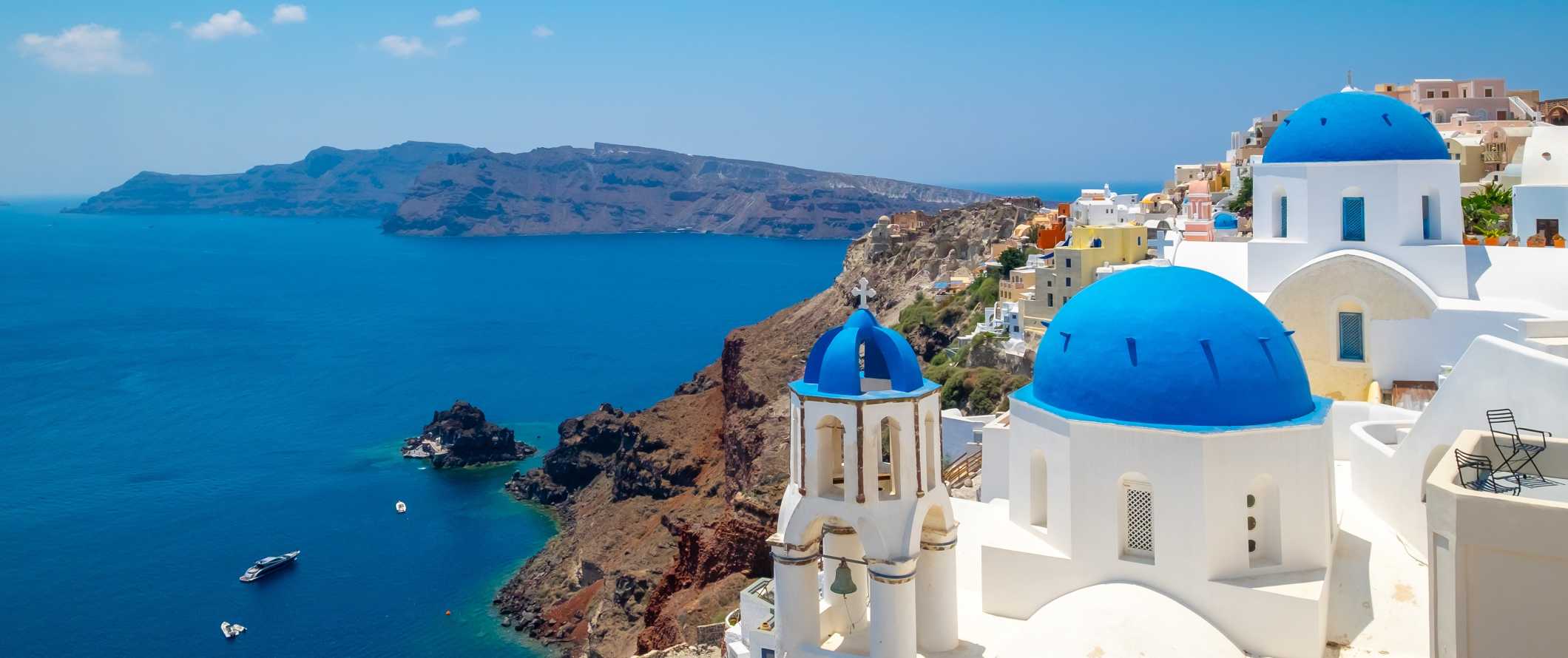
Santorini is perhaps the most famous Greek Island. It sees a lot of older tourists and honeymooners (it was made famous as a honeymoon spot by the 1982 movie Summer Lovers ), and is a frequent stop for cruise ships.
From its iconic sunsets to its historical ruins to its numerous vineyards, Santorini is a picturesque island with plenty to see and do. While one of Greece’s most popular islands, it’s big enough that you can find quiet places away from the overwhelming crowds.
Moreover, if you visit outside the hectic summer months, you can enjoy this postcard-perfect island without the huge crowds — and pay lower prices in the process.
Personally, this isn’t my favorite island but it’s still worth a visit because it has some of the best wine, views, and activities in the region.
This travel guide to Santorini can help you plan your trip and ensure you make the most out of your time here without breaking the bank!
Table of Contents
- Things to See and Do
- Typical Costs
- Suggested Budget
- Money-Saving Tips
- Where to Stay
- How to Get Around
- How to Stay Safe
- Best Places to Book Your Trip
- Related Blogs on Santorini
Top 5 Things to See and Do in Santorini
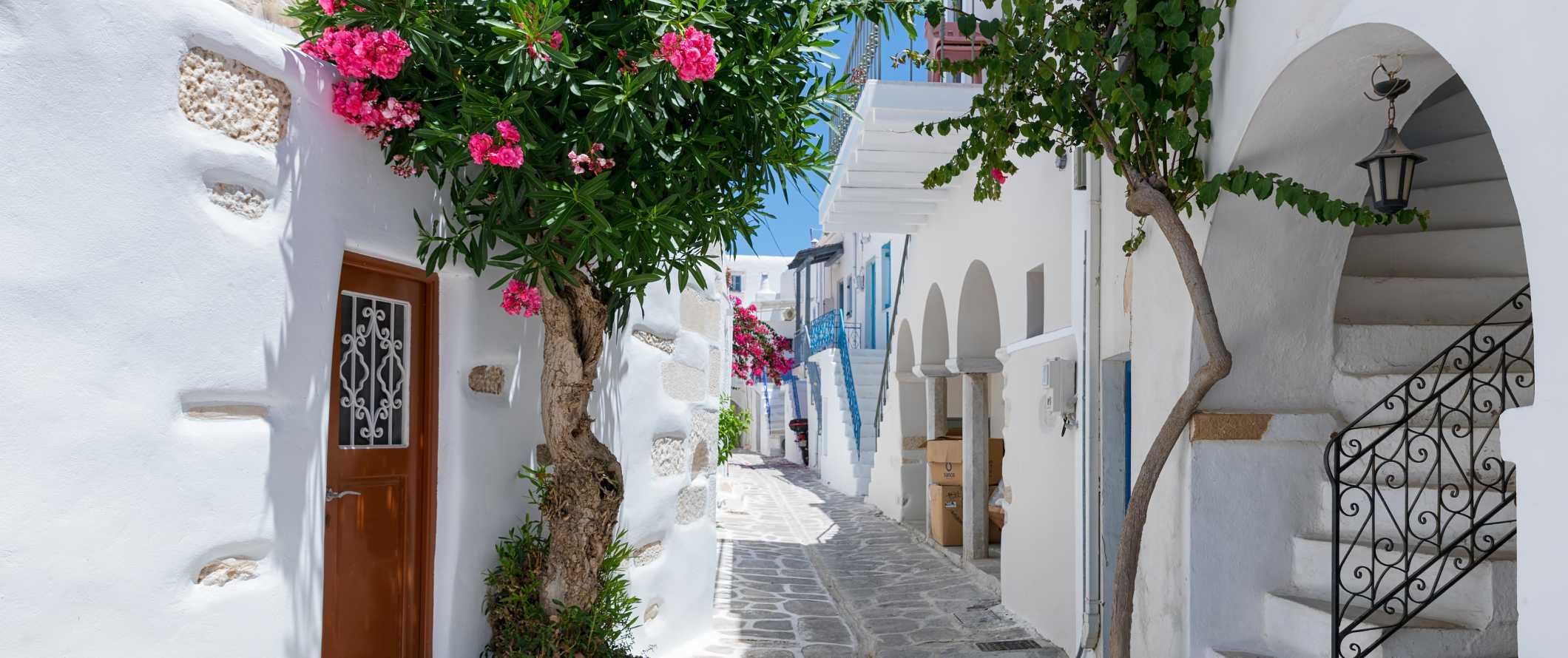
1. Spend the day in Oia
The picturesque town of Oia is famous for its white houses, blue-domed churches, and windmills. There’s not much to do but wander around the pedestrianized streets, snap pictures, enjoy an (expensive) drink or meal on the caldera’s edge (Santorini exists on the remnants of a volcano), and watch a spectacular sunset. Keep in mind that as the most visited (and second-largest) town on the island, it can become quite crowded in the summer months.
2. Visit Akrotiri
Akrotiri is a 3,500-year-old town that was one of the most significant Minoan cities and ports in the Aegean Sea. In the 17th century BCE, it was covered in volcanic ash from an eruption, earning Akrotiri the moniker the “Greek Pompeii.” Streets, buildings, stairs, and even second floors of buildings are still in perfect condition. The excavation site is covered by a roofing system, which makes it comfortable to visit in the summer heat. Skip-the-line tickets are 15 EUR.
3. Explore Red Beach
Red Beach is famous for its vivid red volcanic cliff framing the bright blue Mediterranean Sea. I think Santorini’s other beaches are better for swimming and sunbathing, but Red Beach’s natural beauty is definitely worth a quick visit. It’s also a great spot for snorkeling. Located a 20-minute drive from Fira, near Akrotiri, it’s just a short (yet rocky) hike down to the beach.
4. Tour a winery
Santorini’s fertile, volcanic landscape is perfect for growing grapes. The vineyards here are unique: to protect their crops against harsh winds, vine growers wrap the vines into a sort of wreath low to the ground. Most wines are made from the island’s indigenous Assyrtiko grape variety, and Santorini is especially known for its Vinsanto wines. A tour is the best way to learn about the island’s wine production tradition, as well as visit a few different wineries (there are over a dozen). A half-day winery tours start at 150 EUR.
5. See the Santorini Volcano
Other things to see and do in santorini, 1. hang out on the beaches.
As far as Greek beaches go, Santorini lacks the idyllic, white sandy beachfront that other islands have. Instead, the beaches here are made up of volcanic rock and pebbles. They’re still perfectly enjoyable though and you’ll find most beaches full of people in the summer. Kamari and Perissa have the most action, especially since the bars and restaurants are right on the water. To escape the crowds, go to Monolithos. You can also head to Ammoudi Bay. It’s not a beach but there are lots of rocks and cliffs you can jump from.
2. Go scuba diving
You probably won’t see a great deal of marine life or coral around Santorini, but the island has tons of shipwrecks. You can dive down about 14 meters (45 ft) and see sunken ships, caves, and endless drop-offs around the caldera. Adiavatous Reef, The Caves, and White Island are some of the most popular dive sites. Scuba diving in Santorini starts at 90 EUR.
3. See the Museum of Prehistoric Thira
Located in Fira, this museum is home to a massive collection of artifacts that were found in the ruins of Akrotiri. Its highlights include wall paintings, pottery, an intricately carved gold ibex figurine (an ibex is a wild mountain goat), and fossilized olive tree leaves dating back to 60,000 BCE. My favorites are the frescoes of blue monkeys, although interestingly enough, there is no evidence of monkeys ever having lived on this island. Admission is 6 EUR.
4. Hike from Fira to Oia
The caldera hike from Fira to Oia is the most popular hike you’ll do in Santorini. It follows the caldera’s edge with sweeping views over the island and the volcano. It’s an easy 10 kilometers (6 miles), but you’ll want to give yourself time to stop and enjoy the viewpoints. Much of the trail is cobblestone or sidewalk, however, there are narrow dirt sections as well as some small elevation gains. Budget at least three hours for the hike and bring sunscreen and water as it’s completely exposed.
5. Visit the Akrotiri Lighthouse
Built in 1892, the Akrotiri Lighthouse is located at the southern end of Santorini (it’s close to the Akrotiri ruins). Standing 10 meters tall (33 ft), it’s used by the Greek Navy so you can’t enter it. However, it makes for a good photo opportunity with its whitewashed walls and its position perched precariously on the cliff’s edge.
6. Hike up to Ancient Thera
Ancient Thera is an ancient city built on a steep ridge. The Dorians (one of the four historic Greek ethnic groups) first settled Thera in the 9th century BCE. The city’s remains consist of Hellenistic, Roman, and Byzantine ruins at the top of a giant hill. You can visit houses, temples, a market, a theater, and even a gymnasium. You can drive to the top, but the most rewarding way to visit is via the footpath from Perissa. It’s less than 3 kilometers (2 miles), but it’s a steep climb with a visit to a lovely little chapel along the way. Admission to the archaeologist site is 6 EUR.
7. Explore Pyrgos
If you want the full picturesque experience of Oia without the crowds, head to Pyrgos. This used to be the island’s capital and it still has all the whitewashed homes, pristine chapels, and narrow alleyways that you imagine when you think of Santorini but without the crazy crowds. The village is surrounded by wineries, so duck into one of the wine bars or tavernas to sample a local variety.
8. Take a sailing trip
On a sailing trip, you’ll get unique views of Santorini’s calderas and cliffside buildings you otherwise wouldn’t see from shore. There are lots of sunset cruises available, and the best ones include a BBQ and drinks (and sometimes snorkeling too). They usually include pick-up and drop-off as well. Cruises start at 35 EUR and go up from there. If you want to splash out, catamaran cruises can be found for as little as 85 EUR.
9. Try a cooking class
Mediterranean food is some of the most popular in the world. If you’re a foodie like me and want to learn more about the cuisine and culture behind it, try a cooking class. You’ll get to try your hand at some traditional recipes (including favorites like tzatziki and moussaka) while learning about the importance of each dish directly from the local chef. Petra Kouzina has classes that last around 4 hours and cost 120 EUR.
10. Hike to the highest point on Santorini
Profitis Ilias is the tallest mountain on the island, standing 565 meters (1,900 feet) above sea level. Atop the mountain is a monastery that offers the best views of the island. The Prophet Elias Monastery was built in 1711 and you can drive to the top to enjoy the view. You can also hike if you want to stretch your legs. The monastery is in use so you can’t explore it, however, there is a small chapel and a museum with relics from the Byzantine era. You can also purchase items the monks make, including their wine.
11. Take an e-bike tour
Santorini is hilly, but that doesn’t mean you can’t bike around it! There are several companies offering e-bike tours (and rentals) so that you can pedal across the island terrain, stopping at picturesque villages to refuel with local bites, wine, or coffee. Santorini Adventures and EcoBike Santorini tours both offer a variety of tours, starting at 90 EUR for a half-day tour (includes bike rental).
For more information on other destinations in Greece, check out these guides:
- Athens Travel Guide
- Corfu Travel Guide
- Crete Travel Guide
- Ios Travel Guide
- Mykonos Travel Guide
- Naxos Travel Guide
- Sparta Travel Guide
Santorini Travel Costs

Hostel prices – During peak season, hostel prices here are considerably higher than in the rest of Greece. A bed in any size dorm costs at least 45 EUR per night in Fira. If you want to stay further away from Fira (like in Perissa), 10-bed dorms start at 25 EUR.
In the off-season, beds in dorms around Fira start at 35 EUR per night while beds in hostel dorms further away from Fira start at 20 EUR.
In peak season, outside of Fira a private double room with a shared bathroom costs 45 EUR per night (35 EUR in the off-season). Prices are considerably higher in Fira (95 EUR and more) and they don’t change much between seasons.
Budget hotel prices – Hotels in Santorini are also more expensive than in the rest of Greece. Budget two-star hotels start at 60 EUR everywhere except in Oia, where rooms are closer to 100 EUR. In the off-season, prices drop by around 30-40%. If you’re coming in peak season, don’t wait to book.
Airbnb is available everywhere on Santorini, however, prices for both private rooms and entire homes/apartments are expensive. I’d skip Airbnb while you’re here as it’s not a budget-friendly option. You’ll get better value from B&Bs and hotels if you’re looking for private accommodation.
Food – Traditional Greek cuisine is very healthy with a lot of fresh vegetables, olive oil, lamb, fish, pork, cheeses (especially feta), and yogurts. Filo pastries stuffed with meat or spinach and cheese are a local favorite as are souvlaki and gyros.
You can find street food like gyros for under 5 EUR. A hearty pita or Greek salad costs around 7.5 EUR while a fast food like McDonald’s (yes, there is a McDonald’s here) costs around 8 EUR for a combo meal.
Restaurants on Santorini can be crazy expensive, especially in Fira or Oia. During the day, you can find a lot of the small tavernas around the island offering lunch specials for around 15 EUR. A breakfast of eggs and coffee costs around 11 EUR. Your typical Greek main dish costs around 10 EUR, with the traditional Greek salad around 7-9 EUR.
If you’re looking for seafood, don’t get it by the kilo. It’s around 55 EUR or more for a kilo. Get the fillets instead. A fish dinner will cost around 20-25 EUR. A glass of wine at a restaurant will be around 4 EUR while a bottle will start at around 20 EUR.
If you’re eating in Oia or Ammoundi Bay, don’t go there on a budget. You’ll spend at least 50 EUR on a meal.
Beer can be found for around 3-5 EUR while a latte/cappuccino is around 4 EUR. Bottled water at the supermarket is around 0.50 EUR. Cocktails are around 10 EUR.
Supermarkets are few and far between on Santorini. If you cook for yourself, expect to spend around 55 EUR on groceries per week. This gets you basic staples like pasta, rice, bread, veggies, and meat.
Backpacking Santorini Suggested Budgets
Santorini is one of the most expensive places in Greece so you need to budget accordingly.
If you’re backpacking, expect to spend at least 60 EUR per day. This is assuming you’re staying in a hostel dorm, cooking most meals and eating some cheap fast food, using the bus to get around, limiting your drinking, and doing mostly free activities like hanging out at the beach or hiking. Add at least 5-10 EUR to your budget per day if you plan on drinking.
On a mid-range budget of 130 EUR per day, you can stay in a private hostel room or B&B, eat out for all your meals, enjoy more drinks, take the occasional taxi, and do more paid activities like visiting Akrotiri or touring the volcano.
On a “luxury” budget of 285 EUR per day, you can stay in a hotel, drink as much as you want, eat out anywhere you want, rent a scooter to get around, and do more tours and activities like scuba diving or a winery tour. This is just the ground floor for luxury though. The sky is the limit!
You can use the chart below to get some idea of how much you need to budget daily, depending on your travel style. Keep in mind these are daily averages – some days you’ll spend more, some days you’ll spend less (you might spend less every day). We just want to give you a general idea of how to make your budget. Prices are in EUR.
Santorini Travel Guide: Money-Saving Tips
Santorini is Greece’s most iconic island. That means it gets super crowded in the summer and prices rise drastically. Fortunately, it’s easy to save money here if you know a few tricks (or if you come off-season). Here are some of my best ways to cut your costs in Santorini:
- Hit Happy Hour – Drinks get very expensive on Santorini. Drink your fill during happy hour, when they have 2 for 1 drinks and 1 EUR shots.
- Use the Greek Salad/Bread Rule – If the bread cover at a restaurant is .50 EUR or a Greek salad is less than 7 EUR, the restaurant is cheap. If the cover is around 1 EUR and a salad is 7-8.50 EUR, the prices are average. Anything more than that and the place is expensive.
- Eat super cheap – Gyros (and other street snacks) usually only cost a few euros. They are quick and easy and can keep you full for less than 10 EUR per day!
- Buy wine at the store – You can buy a great bottle of wine from the stores for as little as 4 EUR. It’s a lot cheaper than drinking at the bar, so drink before you go out to save money.
- Rent a moped – If you’re going to be here for a while, rent a moped or quad. It’s cheaper than a car and more convenient than the bus. It’s a fun way to see the various towns and cities and the best way to get off the beaten path.
- Avoid staying in Oia – The main town is the most expensive place to stay. Avoid staying and eating here and you’ll find yourself cutting your costs down significantly.
- Visit in the off-season – June-August are the most expensive months so if you can visit before June or after August you can cut your costs significantly.
- Stay with a local – While there are not a lot of hosts on the island, if you look in advance on Couchsurfing you might be able to find a local to let you stay for free. Not only will you save money but you’ll be able to connect with a local who can share their tips and insider advice!
- Book in advance – Santorini gets a lot of tourism and things tend to fill up quickly (especially in the summer). If you want to secure that ultra-cheap hostel room, book in advance!
- Use points if you can – If you have points, use them to book accommodation. For only a few thousand points per night, you can save a ton of money. This post has more info on getting started .
- Get a ferry pass – Eurail/Interrail has a ferry pass that has 4- and 6-trip options. The only caveat is that you can only take Blue Star and Hellenic Seaways ferries. Those tend to be the larger, slower ferries and, depending on the islands, might require you to connect somewhere. You’ll need to research routes in advance to see if the pass is worth it. I would search routes on FerryHopper to see if it works for you. You can purchase your pass on Eurail (non-EU residents) or Interrail (EU residents).
- Skip the cliffside restaurants – The restaurants along the caldera’s edge are way more expensive than the restaurants away from the cliffside. Avoid them!
- Go to museums on their free admission days – Most of the museums have some days when admission is free. Check the Odysseus Culture website for details as they vary from museum to museum.
- Have an ISIC Card – To save on the cost of admission to museums and other tourist attractions, be sure to present a valid student card. The ISIC is typically accepted in places where a foreign student ID is not and can save you a lot of money.
- Bring a water bottle – The tap water here is safe to drink so bring a reusable water bottle to save money and reduce your plastic use. LifeStraw is my go-to brand as their bottles have built-in filters to ensure your water is always clean and safe.
Where to Stay in Santorini
Santorini is a big island so if you’re planning on spending more than a few days here it’s a good idea to switch up your location. If you want a quiet part of town, stay on the south or east sides of the island. Here are my suggested places to stay in Santorini:
- Youth Hostel Anna
- Bedspot Hostel
- Asterolithos Hotel
How to Get Around Santorini
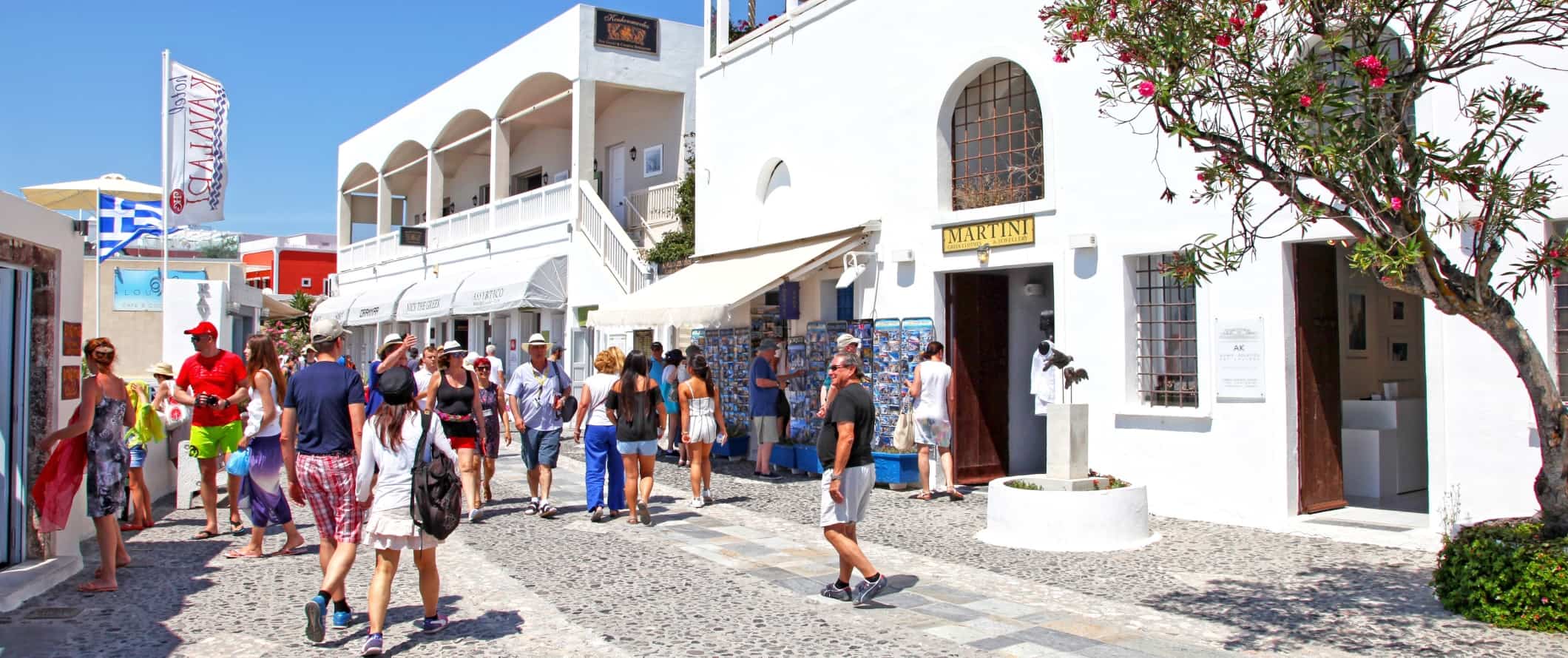
Routes are limited, especially during the off-season and shoulder season, so be sure to check the latest times at the main bus station in Fira. Buses also don’t run late into the night so plan accordingly. Buses are cash only.
Scooter/Quad rentals – There are lots of scooter and quad rental shops in Santorini. Rentals start from 17 EUR per day in the off-season for scooters and 30 EUR per day for an ATV. In the peak season, scooter rentals start from 22 EUR and ATVs from 45 EUR.
Bicycle – Regular bicycles cost around 20 EUR per day from Santorini Adventures. Their eBike rentals start from 40 EUR per day.
Taxi – Taxis are available everywhere but they’re expensive. A taxi from the port to Fira costs about 25 EUR while Fira to Perissa costs the same. Fira to Oia is about 30 EUR! In short, if you take taxis around the island, you can spend 60+ EUR a day. Avoid them if you can and rent your own ride or take the bus!
When to Go to Santorini
Summer (June-August) is the most popular time to visit Santorini. Temperatures average 30°C (85°F), making the Mediterranean perfect for swimming and sunbathing. This is also when most of the cruise ships and tourists arrive, however, so the island gets busy and prices skyrocket.
Santorini’s shoulder seasons (April-May and September-November) are the best times to visit the island. The Mediterranean weather is pleasant so you’ll still get warm temperatures. The tourist crowds are much less oppressive and prices are less inflated. Expect daily highs around 18°C (64°F).
Winter in Santorini is chilly. The average daily low is 9°C (48°F), but sometimes it can dip even lower. Pack some sweaters if you’re visiting between November to February. On the upside, you won’t have to compete with tourists for hotel rooms during this time. Just keep in mind that many businesses and services shut down in the off-season so the island is dead. In short, I would avoid visiting in the winter unless you have no other choice.
How to Stay Safe on Santorini
Santorini is a very safe place to travel. Violent crime is rare so your only concern is petty theft/pickpocketing. Keep your valuables close at the beach or leave them in your hotel room when you go swimming. If you go out at night, only bring the cash and cards you need.
If you’re an inexperienced driver, you may want to pass on the scooter/quad rental. Locals zip around chaotically and the hairpin turns and hills sometimes make for dangerous driving.
Solo female travelers should generally feel safe here, however, the standard precautions apply (never leave your drink unattended at the bar, don’t walk home alone intoxicated, etc.)
Scams here are rare but if you’re worried about getting ripped off you can read about common scams to avoid here .
Much of Santorini is exposed to the elements, so if you’re visiting during the summer months and plan on spending lots of time outdoors, wear a hat, drink lots of water, and put on sunscreen.
Always trust your gut instinct. Make copies of your personal documents, including your passport and ID. Forward your itinerary along to loved ones so they’ll know where you are.
If you experience an emergency, dial 112 for assistance.
The most important piece of advice I can offer is to purchase good travel insurance. Travel insurance protects you against illness, injury, theft, and cancellations. It’s comprehensive protection in case anything goes wrong. I never go on a trip without it as I’ve had to use it many times in the past. You can use the widget below to find the policy right for you:
Santorini Travel Guide: The Best Booking Resources
These are my favorite companies to use when I travel. They consistently have the best deals, offer world-class customer service and great value, and overall, are better than their competitors. They are the companies I use the most and are always the starting point in my search for travel deals.
- Skyscanner – Skyscanner is my favorite flight search engine. They search small websites and budget airlines that larger search sites tend to miss. They are hands down the number one place to start.
- Hostelworld – This is the best hostel accommodation site out there with the largest inventory, best search interface, and widest availability.
- Booking.com – The best all around booking site that constantly provides the cheapest and lowest rates. They have the widest selection of budget accommodation. In all my tests, they’ve always had the cheapest rates out of all the booking websites.
- HostelPass – This new card gives you up to 20% off hostels throughout Europe. It’s a great way to save money. They’re constantly adding new hostels too. I’ve always wanted something like this and glad it finallt exists.
- Get Your Guide – Get Your Guide is a huge online marketplace for tours and excursions. They have tons of tour options available in cities all around the world, including everything from cooking classes, walking tours, street art lessons, and more!
- The Man in Seat 61 – This website is the ultimate guide to train travel anywhere in the world. They have the most comprehensive information on routes, times, prices, and train conditions. If you are planning a long train journey or some epic train trip, consult this site.
- Rome2Rio – This website allows you to see how to get from point A to point B the best and cheapest way possible. It will give you all the bus, train, plane, or boat routes that can get you there as well as how much they cost.
- FlixBus – Flixbus has routes between 20 European countries with prices starting as low 5 EUR! Their buses include WiFi, electrical outlets, a free checked bag.
- SafetyWing – Safety Wing offers convenient and affordable plans tailored to digital nomads and long-term travelers. They have cheap monthly plans, great customer service, and an easy-to-use claims process that makes it perfect for those on the road.
- LifeStraw – My go-to company for reusable water bottles with built-in filters so you can ensure your drinking water is always clean and safe.
- Unbound Merino – They make lightweight, durable, easy-to-clean travel clothing.
- Top Travel Credit Cards – Points are the best way to cut down travel expenses. Here’s my favorite point earning credit cards so you can get free travel!
- Ferry Hopper – If you’re looking to book your ferries, this website is an easy way to search the various companies, piece together routes, and book your tickets.
Santorini Travel Guide: Related Articles
Want more info? Check out all the articles I’ve written on backpacking/traveling Greece and continue planning your trip:
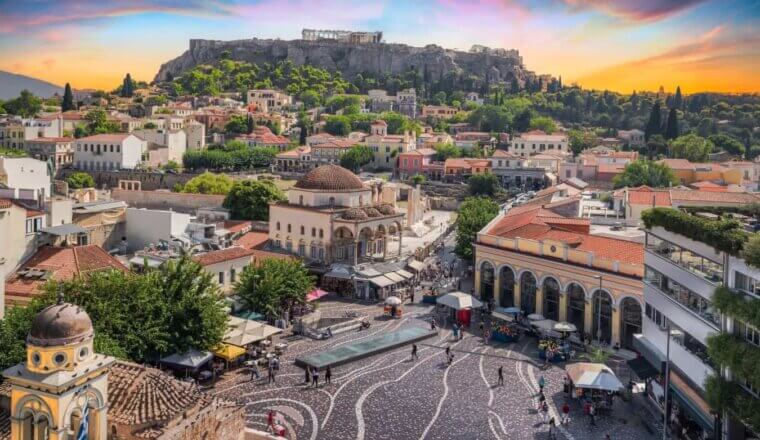
The 6 Best Hotels in Athens
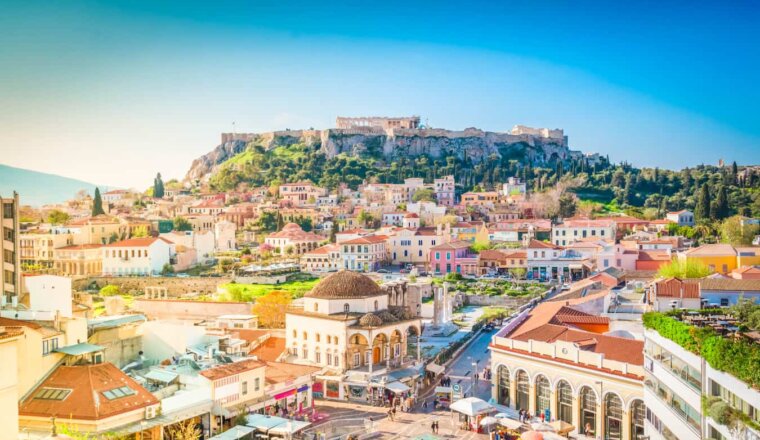
The 6 Best Hostels in Athens
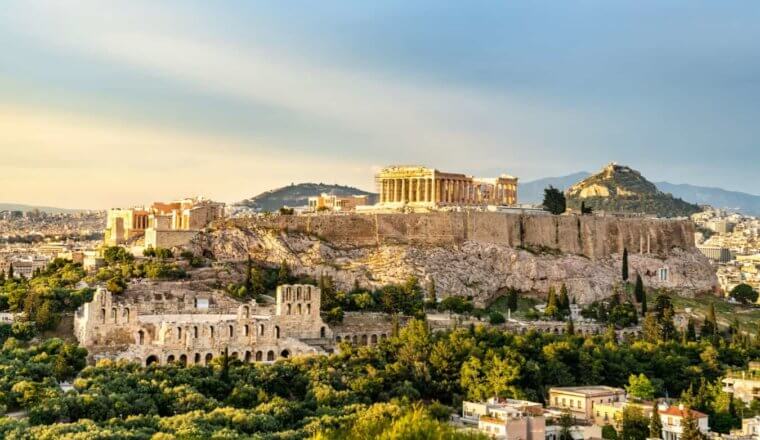
Where to Stay in Athens: The Best Neighborhoods for Your Visit
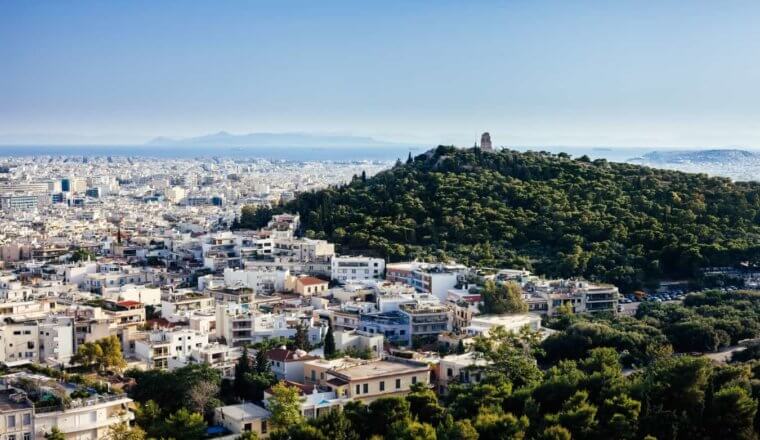
The Best Walking Tours in Athens
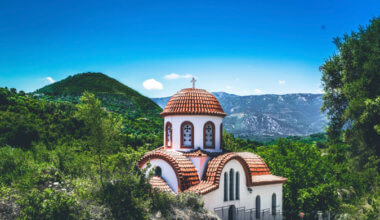
Traveling Greece: How Much Does It Cost?
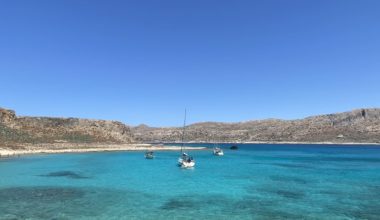
Fulfilling Childhood Dreams in Crete
Get my best stuff sent straight to you, pin it on pinterest.
- Where To Stay
- Transportation
- Booking Resources
- Related Blogs

A Blissful Wanderer
Travel & Lifestyle Blog
Greece , Travel · May 2, 2019
The Ultimate Santorini Travel Guide for First-Time Visitors
Santorini is an idyllic Aegean paradise that’s been enchanting travellers for centuries. This breathtakingly beautiful Greek island is the perfect destination for a romantic getaway or a family vacation. With pristine white-sanded beaches, rugged red-hued cliffs, and iconic cobalt-domed churches, it’s no wonder why this volcanic Greek island is a favourite spot for adventurers. Whether you’re planning your first ever trip to Santorini or your fifteenth, this guide will tell you everything you need to know for a relaxing and memorable stay. In this article, we’ll provide you with a comprehensive Santorini travel guide for the best tips and tricks to make your trip a success. From where to stay, to what to eat, to how to get around, this guide will arm you with the knowledge you need to plan a dream vacation in Santorini. So, get ready to pack your sunscreen and camera, and let’s go explore this magical and majestic destination.

What is Santorini Famous For?
Santorini is globally known for its cliff draping towns, and jaw-dropping sunsets that melt into the horizon. Their traditional Mediterranean food also deserves a mention. Expect freshly caught seafood, colourful greek-salads with mountains of creamy feta, gyros, fried cheese, pita, tzatziki, and rich lamb dishes. Yum! I’m not kidding when I say that the food alone is worth a trip to Greece.
Overall, Santorini is a place you HAVE to visit at least once in your lifetime. Since it’s a town built on top of a volcanic island, it is truly unlike anywhere else in the world. And I must add, pictures of this place don’t do it justice. Seeing Santorini in real life is breathtaking! After two trips to Greece, this country has forever stolen my heart and earned its place as my favourite country in Europe. I hope this Santorini travel guide will help you plan a wonderful holiday in Santorini, and you will love it as much as I do!

FAQ About Travelling to Santorini Island
Drinking water in santorini greece.
Our Airbnb host told us it wasn’t safe to drink the water, so buy bottled water. Hopefully, this will change in the coming years. I hate buying bottled water, due to the plastic waste, which is why we always travel with our own re-usable water bottle with a built-in filter straw .
Electrical Plugs in Greece
Requires European Plugs. So if you don’t already have a universal adaptor plug that works worldwide , I recommend bringing this on all your travels. We have this one and love it! Not only does it work with my computer and hair curler, it has the additional four USB plugs at the top, to charge all your phone and any other gadgets!
Currency in Greece
Euros. I recommend having cash on hand, however, most major restaurants, stores and hotels accept credit cards.
Best Time to Go to Santorini Greece
Greece’s summers sizzle with vibrant tourism from June to September. However, brace yourself for scorching hot days and crowded beaches in July and August, as they are peak tourist months with inflated prices. So choosing to explore Santorini during the tranquil months of spring or fall promises a more serene and budget-friendly vacation experience.
Getting to Santorini Island
To get to the Greek Island of Santorini there is a 99% chance you will first have to fly into Athens . From Athens, you can then either catch another flight or take a ferry to Santorini. Since Santorini has a very small airport, flights can be expensive, so most people opt for the ferries.
There are two types of ferries, either fast (5 hours – €80) or slow ferries (8 hours – €30) . We booked with Seajet Fast Ferries , even though it was €50 more expensive, but it saved us 3 extra hours on a very bumpy and uncomfortable ferry ride. So if you get sea-sick, prepare yourself accordingly or pay the extra for the flight.
Tip: If you tend to get seasick on boats, get these acupressure motion sickness wrist bands . I swear by them! Plus they are low cost, and you can re-use them.
Lastly, most ferries from Athens leave super early in the morning, forcing travellers to spend a night in Athens. Because of this, we decided to add a full day in Athens to explore the history mecca of Greece. If you decide to spend some time exploring Athens, which I highly recommend you do, make sure to read The Perfect Itinerary for 24 hours in Athens.
Getting to your Accommodation from the Port
A lot of accommodations do not include pick-up from the port. So you need to catch a taxi or bus, which can be quite a nightmare when disembarking a ferry with hundreds of other clueless backpackers and tourists. Instead, save time and avoid stress by pre-booking a transfer to be waiting for you on arrival. We pre-booked this 1-way transfer through Get Your Guide and it got us from the Port to our Airbnb quickly, so we could make the most of our time on the island. I typically use GetYourGuide when I want to uncover new things to do, or in this case for a safe transfer. They’re easy to use and book with, and I’ve had amazing experiences with their tours.
How Long Do You Need in Santorini?
For this Santorini Travel Guide, I recommend staying on Santorini Island for at least 3 days. However, if you are looking for a more relaxed stay, you’ll be happier with 4-5 days. There is so much to see and do on the island, plus you’ll want some time to relax. Also, keep in mind your first day will only a half-day, because it takes so long to get to the island. Luckily the ferries back to Athens or to other islands usually leave Santorini in the afternoon, so you’ll be able to enjoy the morning on your last day.
Santorini Travel Guide: Where to Stay in Santorini
In terms of where to stay, there are plenty of options on Santorini. It all comes down to price, who you are travelling with, and the experience you want to have. If you are on a budget a hostel might be more your style. For a family vacation, a resort will be just the ticket. Or if this is your honeymoon, perhaps splash out and get a romantic villa with a perfect view for sunset.
The two major towns of the island are Fira and Oia. This is where you will find the majority of accommodation on the island. Fira has a bit more action and nightlife, while Oia is more traditional and has the best viewpoint for sunset. The island is fairly small, so no matter where you stay, you can always drive or ATV to the neighbouring town.

Santorini Travel Guide: Getting Around Santorini
Similar to Milos , Santorini is best explored by ATV. You can also rent a car, but with the hot weather and beautiful scenery, I loved scooting around on an ATV. At first, I was nervous. But just remember to be safe by wearing your helmet, and obey standard driving rules on the roads. A lot of tourists can be reckless with the ATVs, which is so disrespectful and dangerous for the locals who live there.
In the end, we settled on a shop that gave us our ATV for $20 a day , but the only problem is, I forget the name of it. I do remember it was on the main street heading into Fira, before you enter into the main Plaka area. It had a big green sign out front. It might be Martiou ATV Rental, or near there. We got an ATV with a little lock box on the back, so we could store our helmets, and bags when driving. My last tip when renting an ATVs is to make sure the gas tank is full when you first pick up the vehicle. We noticed our ATV tank was almost empty after we first left the store, and we had to circle back to make them fill it up.
Where to Eat in Santorini
This wouldn’t be the Ultimate Santorini Travel Guide without sharing where to eat! Greek food is one of my favourites, as it’s so fresh, flavourful, and usually healthy too. Plus, almost everywhere you eat in Santorini includes a stunning view, so try to plan to eat dinner around sunset to enjoy the view.
There are a lot of restaurants in Santorini, and some can be disappointing tourist traps. So to avoid you eating at one of those, here are several amazing places to eat in Santorini that won’t let you down.
Seafood Tavern at Ammoudi Bay
Our lunch at the Seafood Tavern was not only one of my most memorable meals in Greece, but in all of Europe. Yep, it was that good! Our table was located on a patio boarding the Aegean Sea, with waves lapping beside us. I swear if I knelt down I could have literally touched the ocean. Since we were in a fishing area, we treated ourselves to the seafood linguini. We were absolutely amazed by how fresh and flavorful it was. Plus the ambience of the restaurant was perfectly Greek. The Greek music, friendly staff, insanely delicious meal and beautiful scenery made it the ultimate place to have lunch. If you travel to Santorini, promise me you won’t miss out on this amazing food experience.
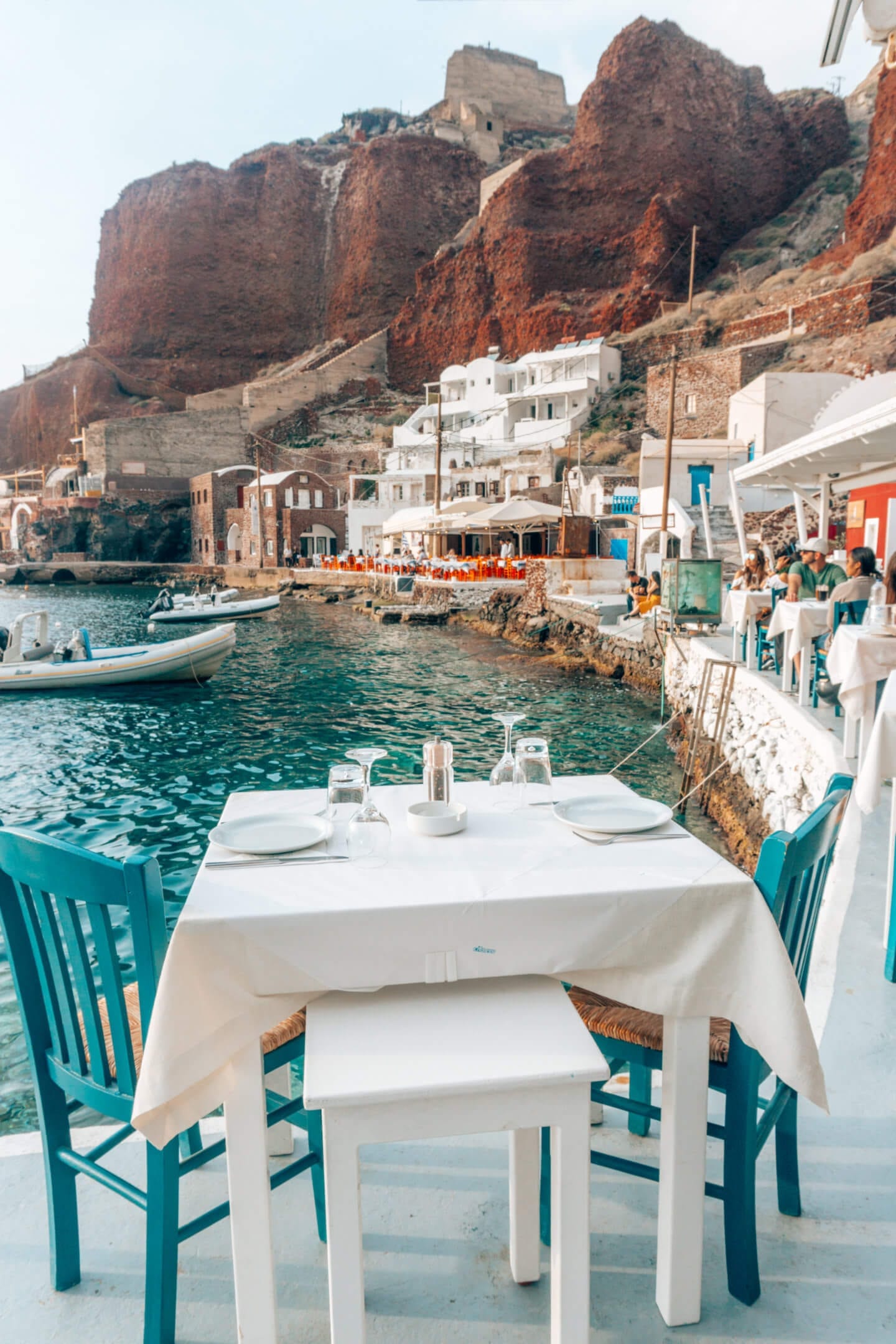
Melitini Restaurant in Oia
Unique Greek Tapas on a beautiful rooftop terrace set back from the main strip. The staff was incredible, and we met the loveliest travellers beside us. One was a lovely honeymoon couple from NYC, and the other was an older German couple that’d been coming to Santorini every year, for 30 years!! They knew the island inside and out, and this restaurant was one of their favourites. We knew if these regulars loved it, we were in for a treat. The final verdict – it was delicious! Highly recommend making a reservation before you go!
Lolita for Gelato in Oia
This gelato was so creamy and tasty, we went back twice!

Salt & Pepper in Fira
Salt & pepper is one of those place you go for the food, and not the view or ambiance. It is located off the main street in Fira, just outside of the busy Plaka area. The food was traditional Greek and absolutely delicious! We loved their grilled Houlomi with tomato jam & grilled zucchini.
Naoussa in Fira
Great for dinner with lovely live Greek music, and a great upstairs patio. We really enjoyed their moussaka (a Greek version of Shepard’s Pie) and the beef dish they had on special that evening. All the food was traditional and simply delicious. You may need a reservation in the peak season!
Art Café in Fira
A small cocktail bar, perfect for sunset drinks without crowds of crazy tourists.
The perfect ambiance and view for a sun-setter. This restaurant is gorgeous and has one of the best patios on the island. They even have a pool you can pay extra to use if your hotel doesn’t have one. Their menu looked amazing, however, it was a tad pricey for us, so we only stayed for drinks.

Best Things to Do in Santorini
In this next section of this Santorini Travel Guide, let’s dive into the must-see attractions and hidden gems that make this Greek Island an unforgettable destination. Known for its breathtaking sunsets, pristine beaches, and iconic blue-domed churches, Santorini is a dream destination for travellers seeking a mix of natural beauty, rich history, and vibrant culture. Whether you’re exploring ancient ruins, savouring delectable cuisine, or simply soaking up the sun on volcanic shores, this enchanting island offers an array of unforgettable experiences. Join us as we unveil the must-see attractions and hidden gems that make Santorini an unparalleled paradise for every wanderer.
See Santorini’s Highlights on a Day-Tour
If you are short on time in Santorini, embark on a full-day sightseeing tour to discover the best of the island. Uncover the island’s rich history at the Akrotiri excavation site and delve into the charm of traditional villages like Emporio. Soak up the sun and black sand at Perissa Beach, indulge in Santorini’s distinctive wines at a local winery, and ascend to the peak of Profitis Ilias for breathtaking views. Finally, make sure to savour the unforgettable experience of an Oia sunset, capturing the essence of Santorini’s magical allure. This tour really covers all the highlights in one day , so you can spend the rest of your time in Santorini relaxing.
Wine Tasting
Head to one of the island’s many wineries and learn about Santorini’s unique viticulture. The island’s volcanic soil gives the local wines a distinct taste you won’t find anywhere else. After the wine tasting, take a dip in one of the secluded beaches in the area.
Tip: If you don’t feel comfortable renting a car or ATV, then hop on this day tour that brings you to a variety of wineries, beaches, and then Oia for sunset! Travelling made stress-free.
Oia for Sunset
Santorini sunsets are globally known to be the best in the world, so you can’t miss them. In fact, it felt like our days always revolved around going somewhere to enjoy the sunset with a drink in hand. There are plenty of great spots to watch the sunset, some of which I’ve already mentioned in this Santorini travel guide; however, don’t miss seeing the sun go down in Oia. There is a great bar near one of the old windmills, but if you want to get that classic Santorini shot, you need to go over to the ” sunset lookout ‘. Warning, every night it is always packed with tourists, so either get there early to snag a seat, or expect to stand.

Hike from Fira to Oia
Unfortunately, I caught a cold on the tail end of our trip in Santorini, so we didn’t get a chance to do this hike. But from what I heard, the hike can take up to 2.5-4 hours to do and is best done in the morning, when the sun isn’t too hot. Wear running shoes, bring lots of water, and do not do it at sunset, as you need good light to see the trail. Lastly, don’t forget your camera – apparently, the views are absolutely spectacular!
Since I am travelling out of one suitcase for the year, I don’t have much room for shopping, however, that has never stopped me from browsing. 😉 What I noticed was the shops were a little less expensive in Fira than Oia . There is plenty of beautiful jewelry, pottery, sundresses and bathing suits. I actually found a store in Fira that had the most stunning linen dresses and jumpers, and at reasonable prices. I forced myself to leave the store after buying two pieces, but I could have easier bought a lot more. Some other things that are great to buy: leather sandals, olive oil, capers, and table cloths. Most things are cheaper in Athens if you are passing through this major city.

Explore Oia and Fira
Oia and Fira are the main Plaka towns, that are famous for their cascading whitewashed houses that run along the side of the island’s cliffs. Both of these areas offer terrific views for sunsets, and plentiful restaurants, bars and shops for tourists.

Take a break from all the site seeing and relax with a couple of hours at the spa. Since travelling full time, it has been a while since I’ve treated myself to a Mani and Pedi. I was delighted to find affordable treatments and shellac polishes at Spa Del Mar e Sol in Fira. Their staff and owners were so kind, and my nails lasted a month without a chip!
* What to Skip on Santorini*
Ride a donkey.
After seeing Sisterhood of the Traveling Pants, I always thought riding a donkey in Greece would be such an authentic experience. But when in Santorini, we saw how cruel the owners were to the donkeys, and quickly realized it was an abusive industry. Luckily, we never saw any tourists on the donkeys, so hopefully, it will be a tourist experience that naturally disappears in the near future.
Best Beaches to Visit in Santorini Island
In this next section of this Santorini Travel Guide, let’s visit the unique volcanic beaches for when you need some time to relax and cool down from the Santorini sun.
Ammoudi Bay
Ammoudi Bay is a fan favourite, especially if you love to cliff jump! To get here, you have to drive down to Ammoudi Bay, walk through all the restaurants and onto a path that leads you to another bay around the corner. There are no signs, so it may seem like you are going the wrong way, but I promise you, you aren’t. FYI this isn’t your typical sandy beach, but more of a rocky coastline that offers a unique view of Oia above you . Once you jump in the water you will also see on one of the rocky islands there is a small church you can walk up to. From here you can jump into the crystal clear Mediterranean.
After your swim, don’t miss eating at the Seafood Tavern , where we had the best Seafood Linguini I’ve ever had, in my entire life (see more details above).
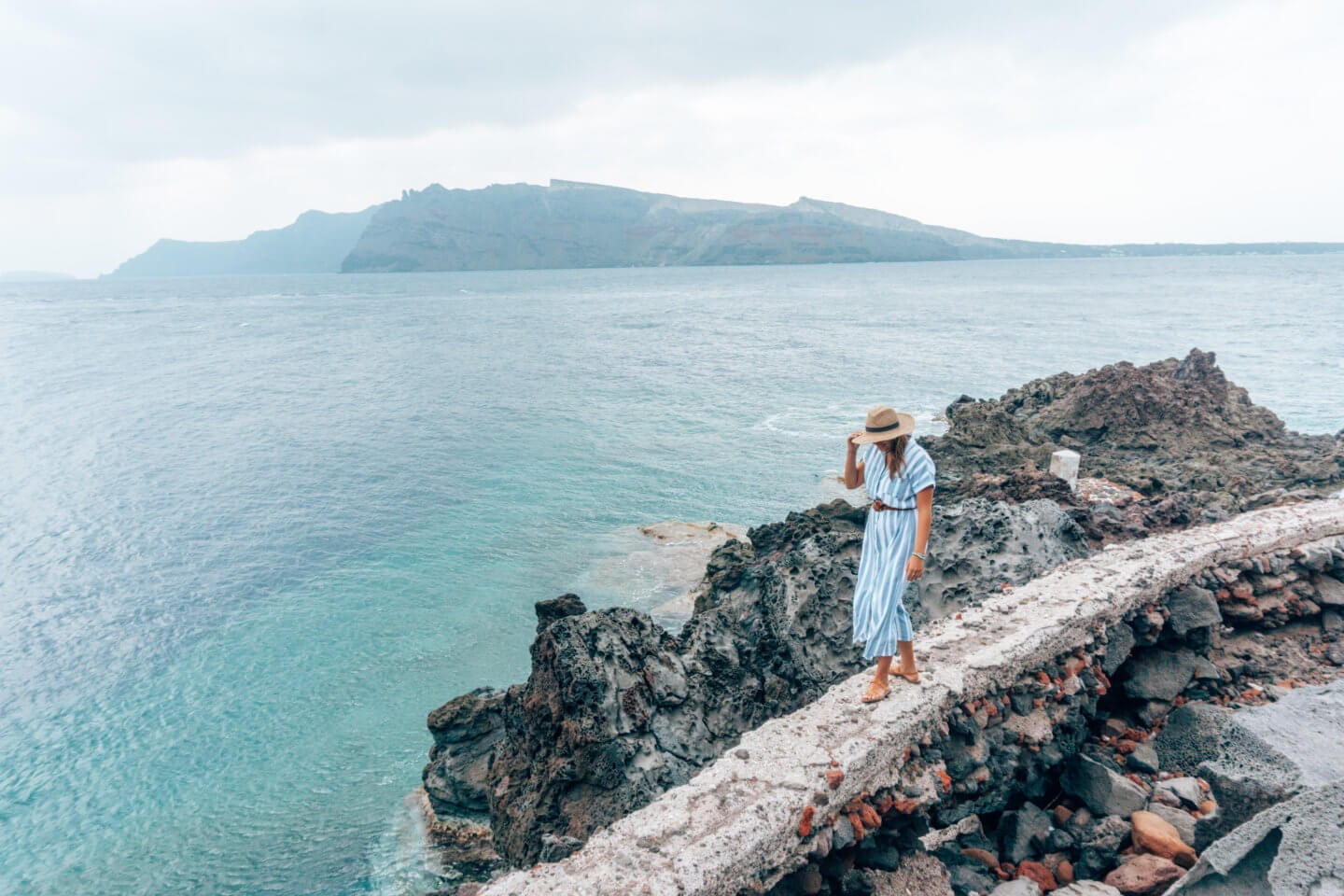
Red & Black Sand Beach
Santorini is one of the few places in the world that has a red, black and white sand beach. This is due to the fact that it is a volcanic island. The black sand is created by fragmented lava rock, while the red sand is rich in volcanic minerals. The Red & Black sand beach is located on the opposite end of the island from Oia, making it a bit of a trek to get to. This isn’t the most popular beach on the island, but it is interesting to see.
Catamaran Cruise
If you’re short on time, and want to see all these beaches, do a Catamaran Cruise around the island , which should take you to all these beach, and many others . Plus, you’ll get to enjoy sunset from the boat and see Santorini from a different perspective. This is one thing that was on our list to do, but by the time we got there, the one we wanted was booked up. So learn from our mistake and book this unforgettable experience before you go!
What to Pack for Greek Island Hopping
1. sun hat:.
A stylish sun hat is a must-have accessory for your Greek island hopping adventure. Not only does it add a touch of glamour to your outfit, but it also provides much-needed shade and UPF 50 to protect your face from the scorching Mediterranean sun.
2. Lightweight Cover-ups & Towel:
From beach to bar, you’ll want a versatile cover-up to throw on over your swimsuit. Choose a breezy dress, a flowy kimono, or a cute sarong to add a touch of effortless elegance to your island-hopping wardrobe. Also, a sarong can double as a lightweight towel. But if you don’t have one, you can also bring these lightweight and quick-dry towels to use at the beach. We found a lot of our hotels/Airbnbs didn’t supply us with beach towels, so these were handy to have!
3. Comfortable Sandals:
Exploring the charming cobblestone streets and ancient ruins calls for a pair of comfortable sandals. Opt for these ones that are not only cute but also sturdy enough to keep up with your island adventures. Your feet will thank you!
4. Stylish Swimwear:
Get ready to dive into the crystal-clear waters of the Greek islands in style! Pack your favourite bikinis and one-piece suits to make a splash and feel fabulous. Don’t forget to snap those Insta-worthy beach pics!
5. Travel-sized Camera:
Capture the breathtaking beauty of the Greek islands with a compact camera that fits in your purse . From stunning sunsets to picturesque landscapes, you’ll want to preserve those special moments forever. Get snap-happy and create memories that will make you smile long after you return home.
6. Flowy Dresses & Linen sets:
Embrace the carefree island vibes with a collection of flowy dresses and this trendy linen set . Perfect for exploring charming villages or sipping cocktails by the beach, these breezy outfits will keep you stylish and comfortable throughout your island hopping adventure.
Remember, the key to a perfect Greek island hopping adventure is to pack light, stay comfortable, and embrace the carefree spirit of summer! Pack these essentials, and you’ll be ready to make unforgettable memories while looking effortlessly fabulous.
Santorini Travel Guide Conclusion
When it comes to spectacular getaways, no place can compare to the beauty of Santorini. With its captivating history, stunning views, and diverse activities to enjoy, Santorini is the perfect destination for a romantic vacation, a family getaway, or an unforgettable adventure. From the iconic whitewashed villages to the mesmerizing sunsets over the caldera, there’s truly something for everyone in this magical Greek island. Whether you choose to stay in a luxurious five-star hotel or a cozy local apartment, you’ll be enchanted by Santorini’s beauty and hospitality. With a little bit of planning and an open mind, you’ll be able to create lasting memories that you’ll cherish forever. So take the plunge and explore the magnificence of Santorini – you won’t regret it!
I hope this Santorini Travel Guide has helped you plan your perfect vacation. If you have any further questions, asked them in the comments below.
Best Photo Spots on Santorini Island The top end of Fira – Google Maps Oia Sunset Lookout – Google Maps Ammoudi Bay – Google Maps
Read Next: O nward Travel from Santorini
10 Days in Greece Itinerary: The Best Greek Island Hopping Route
Milos travel Guide
24 Hours in Athens Itinerary
15 Top Things to Do in Crete, Greece – Your Ultimate Travel Guide!
Pin for Later: Santorini Travel Guide

You’ll Also Love

Our 2019 Travel itinerary & Update
Trending now.
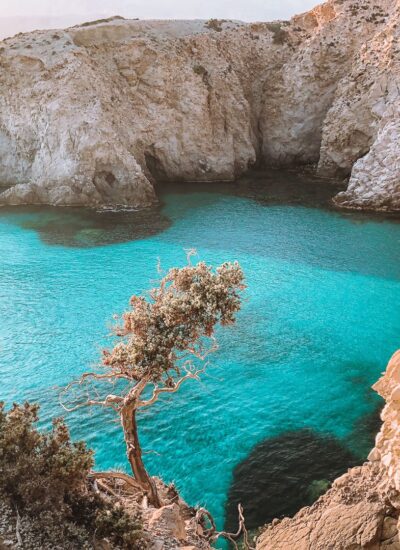
Follow @ amberstorie
Copyright © 2024 A Blissful Wanderer · Theme by 17th Avenue
Santorini Travel Guide

Courtesy of Artie Photography (Artie Ng) | Getty Images

Why Go To Santorini
A massive volcanic eruption around 1650 B.C. forced the center of what was then a single island to implode and succumb to the sea. Some say that this was the original home of the lost city of Atlantis, which long ago disappeared into the ocean's depths. Whatever remains of this mythological metropolis is now guarded by beautiful beaches and stately whitewashed homes. Today, Santorini consists of two inhabited islands and several islets. Most visitors spend their time on Thira (the archipelago's largest island), which is home to Santorini's major towns, including Fira and Oia. Sleepy Thirassia makes for a relaxing daytrip too. And don't count out the quieter islands: Nea Kameni and Palea Kameni are worth exploring.
Your first order of business in Santorini is to hit the colorful beaches – the black and red sands make for a memorable visit. Next up, indulge in the archaeological delights of the impressively preserved Ancient Akrotiri or hike to Ancient Thera to see the ruins of three empires, including the Romans. From there, catch a breathtaking view of the caldera, a brilliant turquoise pool of water that serves as the nucleus for the varied isles of this archipelago. Some would say you only need a day to enjoy these islands' charms (they are a popular port of call for cruise ships ), but to really drink in all Santorini has to offer, you'll need a few days to a week. Then you'll have plenty of time to learn there's more to these comely dots of the Cyclades than meets the eye.
Find Flight and Hotel Deals
Navigate forward to interact with the calendar and select a date. Press the question mark key to get the keyboard shortcuts for changing dates.
Navigate backward to interact with the calendar and select a date. Press the question mark key to get the keyboard shortcuts for changing dates.
- # 2 in Which Greek Island Should You Visit? Our 2024 Top Picks
- # 2 in Best Places to Visit in September 2024
- # 3 in Best Honeymoons in Europe for 2024
See All 8 Rankings
Best of Santorini
Best hotels in santorini.
- # 1 in Katikies Santorini
- # 2 in Andronis Luxury Suites
- # 3 in Andronis Boutique Hotel

Best Things to Do in Santorini
- # 1 in Kamari Beach
- # 2 in Amoudi Bay
- # 3 in Fira to Oia Hike
Popular Tours

Santorini Classic Catamaran Cruise with Meal Drinks and Transfers
(2654 reviews)
from $ 103.54

Santorini Luxury Caldera Cruise with Full Greek Meal and Sunset
(1387 reviews)
from $ 114.44

Private Tailor-Made Tour- Explore Santorini with comfort & style
(305 reviews)
from $ 130.46
Santorini Travel Tips
Best months to visit.
The best time to visit Santorini is from September to October and April to May when the weather is warm and the crowds are scarce. Like all of the Cyclades, Santorini welcomes the most visitors during the summer, so you'll need to make your reservations months in advance if you plan on visiting anytime from June through August. Looking for a bargain? Try winter, when room rates tend to plummet. Keep in mind that this season's average highs only reach the 50s (not good for sunbathing) and the region sees plenty of precipitation. However, all that rain does make for a very flowery (and warm) spring season. Crowds will be at a low in the spring as well, though tourists will begin invading the islands come May.
Weather in Santorini
Data sourced from the National Climatic Data Center
What You Need to Know
Drink up Santorini's rich volcanic soil is ideal for growing grapes, making wine the beverage of choice here. Head to a local taverna to try some of the best.
Don't go to the beach barefoot Santorini's beaches primarily made up of small rocks instead of sand, making them extremely hot after a couple hours in the sun. To avoid burns, make sure to wear sandals or water shoes.
Santorini isn't all cliffs The pictures you see of Santorini situated high on the cliffs are actually on the west coast of the island. The east coast, including Kamari and Perissa, are generally flat.
How to Save Money in Santorini
Vacation in the shoulder seasons The fall and spring are known for warm weather, but not as many tourists take advantage of it compared to summer. You can find some great deals on hotels if you skirt the summer crowds.
Hungry? Head inland While the thought of munching on fresh Greek fare beachfront or cliffside is no doubt tempting, these restaurants may charge higher prices solely for the location. Definitely take advantage of these scenic restaurants, but balance it out by heading inland, where you'll likely find more budget-friendly menus.
Stay on the east coast Hotels along the caldera in towns like the popular Oia tend to attract the most travelers, especially honeymooners. You'll find much more reasonably priced rooms in southeastern towns like Kamari and Perissa.
Culture & Customs
Greek is the official language, though considering the large influx of visitors the island receives (as many as 10,000 cruise ship tourists alone come ashore daily), you're more likely to run into English-speaking Greeks than not, especially in tourist areas. Understanding body language here though is key. Be very aware of your gestures. For example, using the thumb and index finger to signal "OK" is offensive, as is holding up your palm to anyone. If you want to wave goodbye, make sure your palm is facing you. As for indicating nodding your head to indicate 'yes' and shaking your head to indicate 'no.' Greeks do it differently. A slight downward means 'yes' while a slight upward nod means 'no.' These gestures are often subtle and quick, making it hard for foreigners to understand. The best thing to do is avoid trying to communicate with gestures here to avoid getting lost in body language translation.
Greeks are known to be very friendly, especially when meeting new people. When meeting a Greek in a social situation, shaking hands is customary. Two kisses, one exchanged on each cheek, is the norm when with acquaintances. Greeks tend to be very open and become deeply engaged when in conversation. They have also been known to get personal, fast. If you're uncomfortable with the dialogue, such as talking about sensitive subjects such as politics or if you're being asked too personal questions, simply try to change the subject. Lateness is also common here. If you have plans with Greeks, expect them to be at least 15 minutes late.
Shorts and T-shirts are acceptable when walking around the towns or the beaches, some of which are clothing optional. Dress continues to be casual even in restaurants, but Greeks tend to dress up a little more nicely when dining out in the evenings. Other than on the beach, never waltz into a restaurant or public space in your bathing suit or barefoot, even along a beachfront promenade.
Santorini's currency is the euro. Since the euro to U.S. dollar exchange rate fluctuates, be sure to check what the current exchange rate is before you go. Major credit cards are accepted at most restaurants and shops. When eating at a restaurant, a service charge may be included. As such, tipping isn't commonplace. Also, keep in mind the plumbing system in Santorini is not stellar – when at a hotel or restaurant, throw any used toilet paper in the waste basket rather than flushing it down the toilet to avoid any potentially embarrassing flooding situations.
What to Eat
While in Santorini, take full advantage of the fresh Greek fare. The island's climate in combination with its volcanic soil enhance flavors of the fruits and vegetables grown here. As such, Santorini has made a name for itself in the wine community, making a visit to one of the island's wineries a top attraction. In addition to delectable grapes, make sure cherry tomatoes (especially sun-dried), capers and white eggplant are part of one or more of your meals during your time in Santorini. The sweetness and white color of the eggplants here are a direct result of being grown in volcanic soil. Cherry tomatoes are another fruit that can attribute their taste to the unique soil. If you like eggplant, then you'll no doubt enjoy moussaka , a Greek-style lasagna that features layered eggplant, minced meat, fixins and spices topped with béchamel sauce. Other must-try Greek specialties include anything with olives and olive oil, especially a traditional Greek salad, as well as fava, a traditional dip made of fava bean puree.
Greeks are all about their dips. Along with fava and the famous tzatziki sauce (yogurt, cucumber and garlic), another must-try and uber-traditional dip is taramasalata, made from smoked fish roe and mixed with olive oil and lemon juice. Other popular small bites include dolmades and keftedes . Regularly served before meals, dolmades are seasoned rice often mixed with meat or vegetables and wrapped entirely in a grape or vine leaf. Keftedes are fritters commonly mixed with cherry tomatoes (tomatokeftedes) or grated zucchini (kolokithokeftedes). If you're after something heartier, you're in luck: The island, as well as the whole of Greece, have a penchant for grilled meats. Souvlaki, or seasoned skewered meat, often topped with tzatziki, can be found all over. Octopus, which you'll likely find hanging by its tentacles outside seaside tavernas, are also popular. And, of course, you can't leave without grabbing a gyro. Whatever you choose to eat, make room for dessert – baklava , a filo pastry layered with honey and ground nuts and loukoumades , or deep-fried donut holes sprinkled with hot honey and cinnamon, are local favorites.
You can find everything from quick gyros to casual eateries to upscale restaurants throughout Santorini. Head to Restaurant 1800 in Oia for fine dining and expertly presented Mediterranean cuisine. If you can, snag a table on the roof to enjoy sweeping views of the island's cliffs. Selene is another upscale option, conveniently located in Pyrgros, which houses a number of wineries. In Fira, the hundreds-year-old Taverna Nikolas is as traditional as it gets, offering classic Greek dishes at affordable prices. For a little romance, enjoy a candle-lit dinner at the edge of the caldera at Ambrosia .
Santorini is pretty safe. Travelers report feeling comfortable walking around the streets both day and night. Even pickpocketing is few and far between here. In terms of getting around, there are not many sidewalks in Santorini, so be careful when walking the streets as you may need to dodge the occasional wayward, speedy scooter. Use caution when navigating Santorini's beaches as well. Most of if not all of the beaches are composed of small rocks rather than sand, and during the summer, can become too hot for bare feet to touch. Bring with you sandals to wear on the sand or water shoes to avoid burns. Tap water here is not safe to drink.
Getting Around Santorini
The best way to get around Santorini is on foot or by bus. You'll see that it's easy to walk around the tiny seaside towns, but the bus is best to get from one town to another. There are KTEL bus routes from Fira (the capital city) to many different destinations around the main island. KTEL also services the Santorini (Thira) Island National Airport (JTR), but you might find it easier to rely on a cab to get you into town. If you're planning to do a little island hopping, you can catch a ferry from Athinios (about 5 miles south of Fira).
Entry & Exit Requirements
To enter Greece, you must have a passport that will be valid for your stay and for at least six months after. You won't need a visa, however, unless you're planning to stay longer than 90 days. Visit the U.S. State Department's website for more information on entry and exit requirements.
The neighborhood of Oia is what you often see in photos of Santorini. The neighborhood is filled to the brim with white- and pastel-colored buildings cascading down cliffsides. Considering its popularity and bounty of luxurious hotels, staying here will cost you a pretty penny.
Explore More of Santorini

Things To Do
Best hotels.

You might also like

# 1 in Best Cheap European Honeymoon Destinations

# 5 in Which Greek Island Should You Visit? Our 2024 Top Picks

# 9 in Best Honeymoons in Europe for 2024
If you make a purchase from our site, we may earn a commission. This does not affect the quality or independence of our editorial content.
Recommended
The 18 Best Napa Valley Wineries to Visit in 2024
Lyn Mettler|Sharael Kolberg April 23, 2024

The 25 Best Beaches on the East Coast for 2024
Timothy J. Forster|Sharael Kolberg April 19, 2024

The 50 Best Hotels in the USA 2024
Christina Maggitas February 6, 2024

The 32 Most Famous Landmarks in the World
Gwen Pratesi|Timothy J. Forster February 1, 2024

9 Top All-Inclusive Resorts in Florida for 2024
Gwen Pratesi|Amanda Norcross January 5, 2024

24 Top All-Inclusive Resorts in the U.S. for 2024
Erin Evans January 4, 2024

26 Top Adults-Only All-Inclusive Resorts for 2024
Zach Watson December 28, 2023

Solo Vacations: The 36 Best Places to Travel Alone in 2024
Lyn Mettler|Erin Vasta December 22, 2023

26 Cheap Beach Vacations for Travelers on a Budget
Kyle McCarthy|Sharael Kolberg December 4, 2023

The 50 Most Beautiful White Sand Beaches in the World
Holly Johnson December 1, 2023

First time Santorini: top tips to have the best time on this famed Greek isle
Dec 7, 2021 • 5 min read

Santorini is a dazzling star of the Greek Islands, and it's extremely popular with tourists © Andrew Mayovskyy / Shutterstock
Santorini is the supermodel of the Greek islands, a head-turner whose face is instantly recognizable around the world: multicolored cliffs soar out of a sea-drowned volcanic crater, topped by whitewashed buildings.
With its reputation for dazzling panoramas, romantic sunsets and volcanic-sand beaches, it’s hardly surprising Santorini features on so many travelers’ bucket lists. If you're planning to join the crowd, here’s what you need to know for your first trip to Santorini .
Part of the Cyclades island group, Santorini (officially known as Thira, a name that encompasses the volcanic islets within Santorini’s orbit) sits in the Aegean Sea, roughly halfway between Athens and Crete.
The island is shaped like a wonky croissant, and the neighboring islets hint at the fact that Santorini was once circular. It was known as Strongili (the Round One). Thousands of years ago, a huge volcanic eruption caused the center of Strongili to sink, leaving a caldera (or crater) with towering cliffs along the east side, now Santorini’s trademark landscape.

Beyond the views, Santorini's vineyards and volcanic beaches
Santorini’s commercial development is focused on the caldera-edge clifftops in the island’s west, with large clusters of whitewashed buildings nesting at dizzying heights, spilling down cliff-sides and offering gasp-inducing views from land or sea. Fira , the island’s busy capital, sprawls north into villages called Firostefani (about a 15-minute walk from Fira) and Imerovigli (the highest point of the caldera edge, about a 30-minute walk from Fira). A path running through these villages is lined with upmarket hotels, restaurant terraces and endless photo opportunities.
These three conjoined settlements draw most visitors, together with the stunning and quite exclusive village of Oia in Santorini’s north. There’s a growing number of hotels in the island’s south, offering caldera views to the north and northeast. Akrotiri’s views come cheaper than Oia’s, but it’s a fair way from the action of Fira.
Santorini’s east coast is lesser known than the celebrated, elevated west coast. Here, the caldera-edge heights have sloped down to sea level, and volcanic-sand beaches and resorts offer a very different drawcard. East coast resorts such as Kamari and Perissa have a more traditional (and more affordable) island-holiday appeal: sunlounger-filled beaches, water sports, bars and taverna-lined promenades. The east coast’s beaches are lined with black sand. On the south coast, there’s a string of beaches famed for their multi-colored sand. The dramatic Red Beach is a traveler favorite.
The island’s interior is dotted with vineyards and traditional villages that let you see beyond the tourist hustle. Make a stop in Pyrgos for great eats and a wander through charming backstreets.
Food, archaeology, open-air cinema: things to do in Santorini
Sure, Santorini's views will stop you in your tracks and you'll get great glimpses into how A-listers travel, but there’s plenty more to explore, from a gorgeous open-air cinema to a cool microbrewery , wine caverns adorned with artworks, and cooking demonstrations and classes that celebrate Santorini’s growing foodie culture.
The obvious prime activity on Santorini is to walk the caldera edge and admire the views. Walks in and around Fira are spectacular, particularly heading north to Firostefani and Imerovigli along the caldera-edge pathway. Keep walking and you’ll eventually reach Oia, but be aware that this is no small undertaking and the trail beyond Imerovigli can be rough. It’s about 5.6 miles (9km) in all, and a good four-hour walk, one way.
Santorini’s lauded wines are its crisp dry whites and the amber-colored, unfortified dessert wine known as Vinsanto. Both are made from the indigenous grape variety, assyrtiko . About a dozen local vineyards host tastings (usually with a small charge) and some offer food, with scenery and local produce combining to great effect. Start your investigations at SantoWines .
Santorini’s intrigue reaches deep into the past, with the fascinating site of Akrotiri displaying a Minoan city destroyed by the volcanic eruption of 1613 BC. In Fira, the impressive Museum of Prehistoric Thera helps piece together the story of ancient Akrotiri.
Nature’s handiwork is on display from any waterfront seat come sundown, but prime sunset-viewing on Santorini is in Oia, where thousands of tourists flock to admire (and applaud) nightfall.
Any tour your heart desires can be organized, and there are dozens of agencies ready to help with winery visits, archaeology tours, sunset-watching and more. The most popular option is a cruise, and the classic itinerary takes in the caldera’s volcanic islands of Nea Kameni and Palia Kameni, including a stop at the former’s crater and the latter’s hot springs.
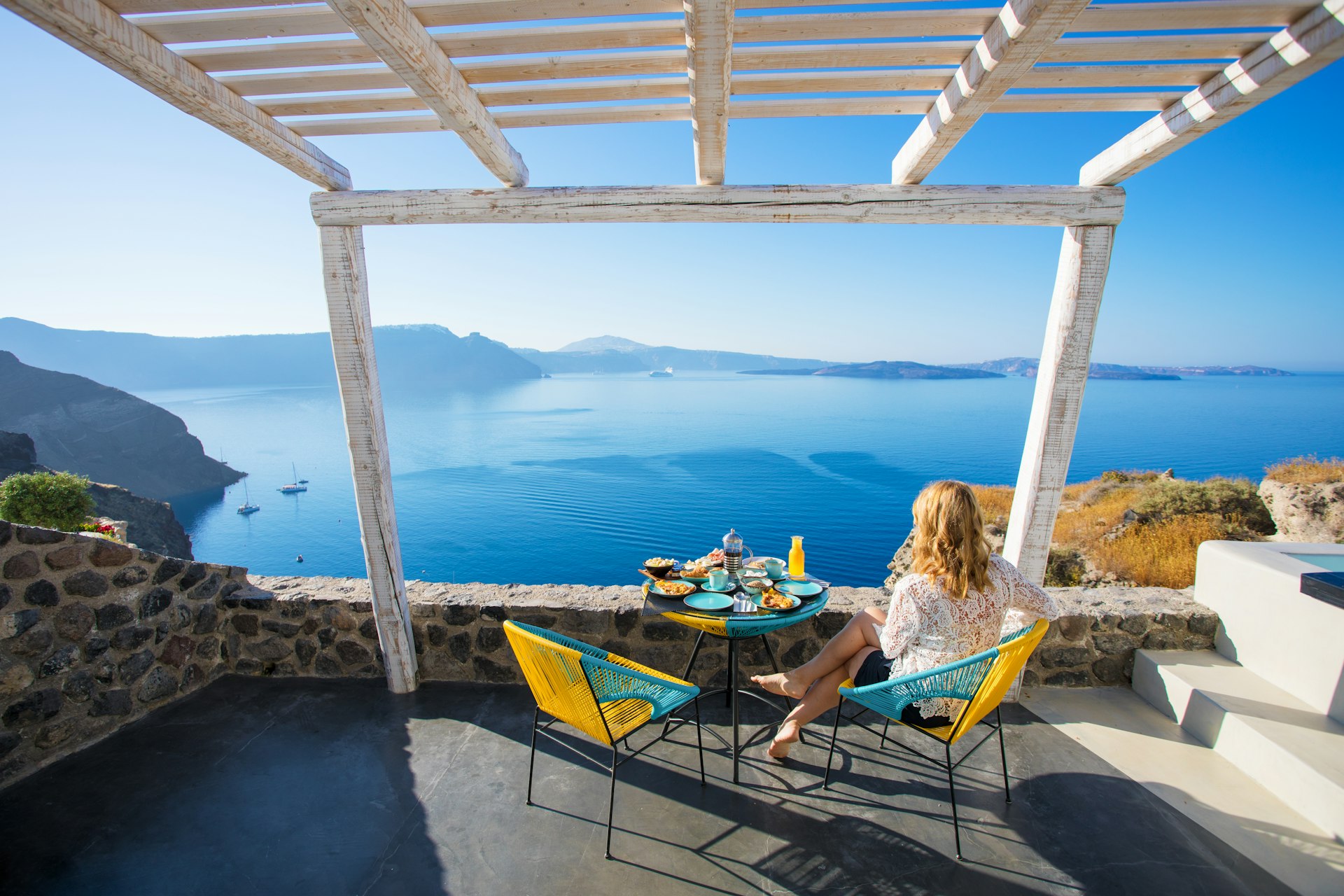
Accommodation with a view in Santorini comes at a price
If you can afford it, first-timers to Santorini should stay on the caldera edge to experience the full "wow" factor. Fira, Firostefani, Imerovigli and Oia have hotels and villas with whitewashed interiors, terraces and infinity pools that have inspired marriage proposals, high-fashion photo shoots and many Instagram posts.
Unfortunately there are not a lot of places to stay in these view-blessed locales for budget-conscious travelers: caldera-view accommodations come at a premium, and they are in hot demand. You'll also need to book well in advance.
There are decent midrange options in Fira and Firostefani (less so in Imerovigli and Oia), away from the front-row panoramas. There’s also a great hostel and a budget-friendly campground (with rooms) on the outskirts of Fira.
If you’re more interested in a beach break or activities, stay in Perissa or Kamari (and catch the bus into Fira). The advantage of this is some respite from the camera-toting caldera crowds, plus more reasonable prices.
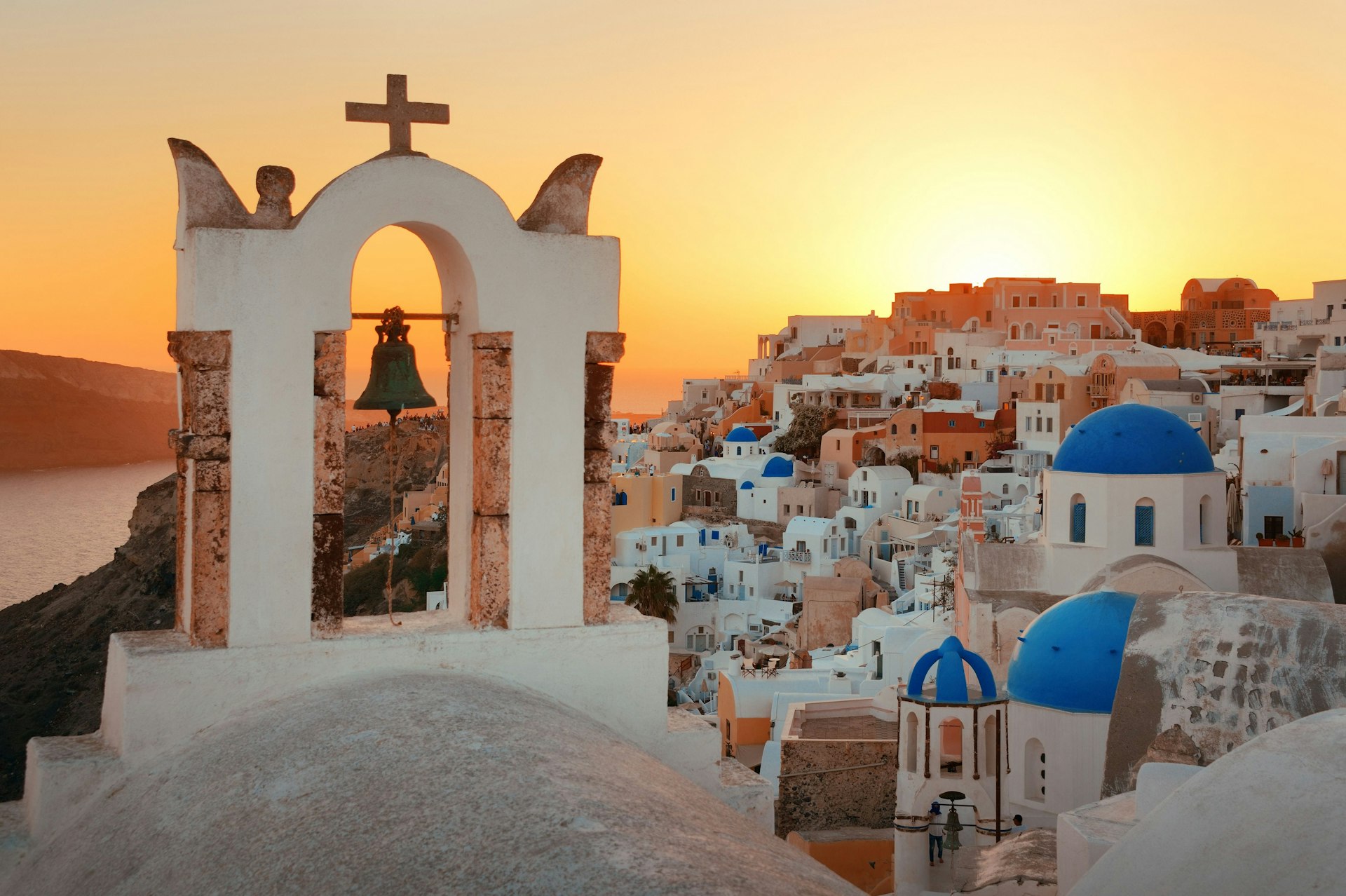
The best times to visit Santorini without the crowds
Peak travel time to Santorini is July and August, when prices soar and hotels, viewpoints and beaches are packed with tourists. The shoulder season months of April, May, early June, late September and October are better times to visit. Things are marginally quieter at the caldera edge, and considerably quieter on the east coast (where accommodation bargains are plentiful).
Don’t discount a winter break, when crowds are scarce (and prices low) while the scenery is still breathtaking. Santorini is working on positioning itself as a year-round destination.

Reach Santorini by ferry, catamaran or plane
Frequent ferries and high-speed catamarans link Santorini with Athens’ main port of Piraeus, Crete and various Cycladic islands. Check OpenSeas for ferry timetables. Santorini Airport has year-round flight connections with Athens, and summertime European connections. On the island, bus services are decent, if crowded in summer. Lots of companies also offer cars, mopeds and ATV four-wheeler bikes to rent.
You might also like: Plan your perfect Greek island-hopping adventure Finding the right Greek island The 10 best museums in Athens
This article was first published May 2019 and updated December 2021
Explore related stories
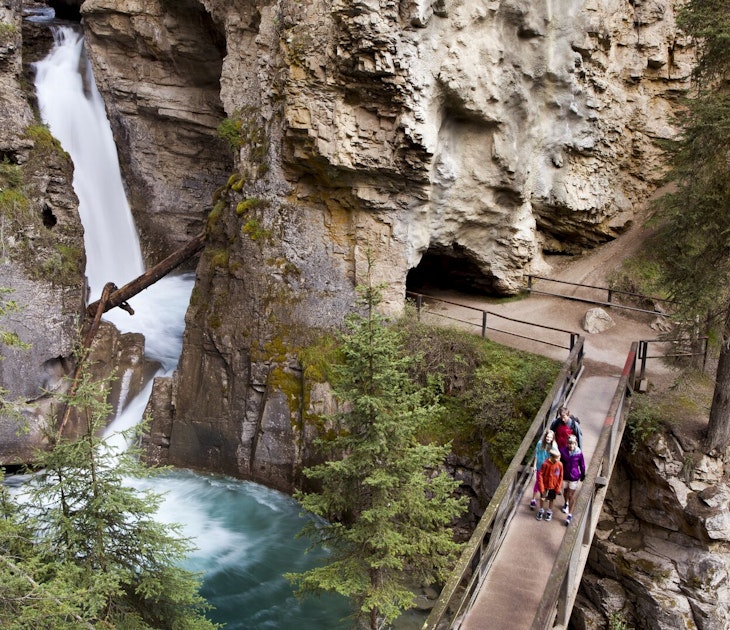
Apr 19, 2024 • 10 min read
Summer is just around the corner in the northern hemisphere. Here's where the Lonely Planet team is going.

Mar 22, 2024 • 7 min read

Mar 11, 2024 • 8 min read

Mar 6, 2024 • 8 min read
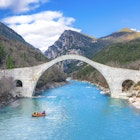
Mar 4, 2024 • 6 min read

Feb 19, 2024 • 7 min read
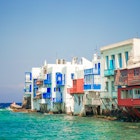
Feb 15, 2024 • 4 min read
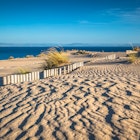
Jan 30, 2024 • 19 min read
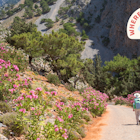
Sep 25, 2023 • 4 min read

Sep 12, 2023 • 6 min read
You are using an outdated browser. Upgrade your browser today or install Google Chrome Frame to better experience this site.
Greece Traveler View
Travel health notices, vaccines and medicines, non-vaccine-preventable diseases, stay healthy and safe.
- Packing List
After Your Trip
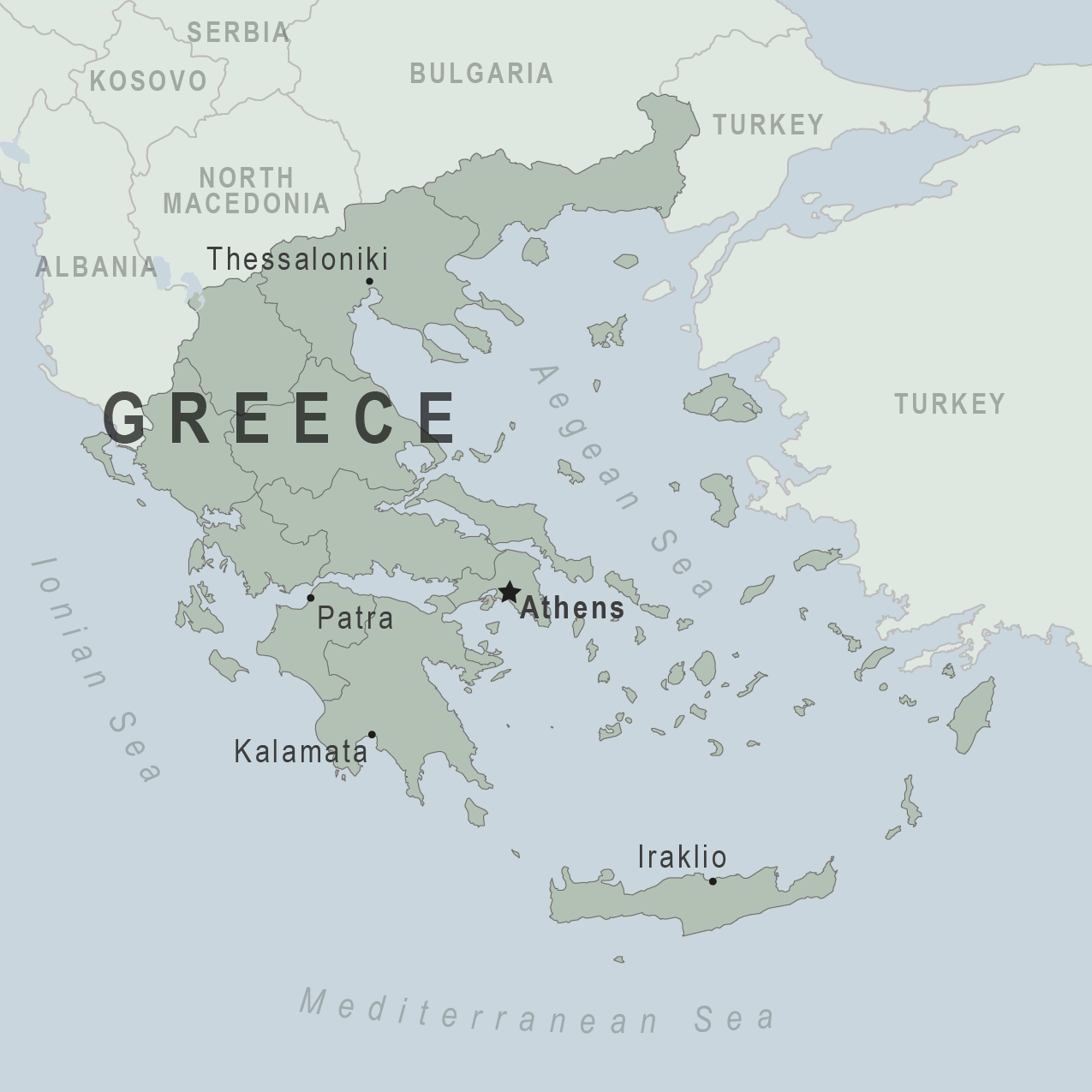
There are no notices currently in effect for Greece.
⇧ Top
Check the vaccines and medicines list and visit your doctor at least a month before your trip to get vaccines or medicines you may need. If you or your doctor need help finding a location that provides certain vaccines or medicines, visit the Find a Clinic page.
Routine vaccines
Recommendations.
Make sure you are up-to-date on all routine vaccines before every trip. Some of these vaccines include
- Chickenpox (Varicella)
- Diphtheria-Tetanus-Pertussis
- Flu (influenza)
- Measles-Mumps-Rubella (MMR)
Immunization schedules
All eligible travelers should be up to date with their COVID-19 vaccines. Please see Your COVID-19 Vaccination for more information.
COVID-19 vaccine
Hepatitis A
Consider hepatitis A vaccination for most travelers. It is recommended for travelers who will be doing higher risk activities, such as visiting smaller cities, villages, or rural areas where a traveler might get infected through food or water. It is recommended for travelers who plan on eating street food.
Hepatitis A - CDC Yellow Book
Dosing info - Hep A
Hepatitis B
Recommended for unvaccinated travelers younger than 60 years old traveling to Greece. Unvaccinated travelers 60 years and older may get vaccinated before traveling to Greece.
Hepatitis B - CDC Yellow Book
Dosing info - Hep B
Cases of measles are on the rise worldwide. Travelers are at risk of measles if they have not been fully vaccinated at least two weeks prior to departure, or have not had measles in the past, and travel internationally to areas where measles is spreading.
All international travelers should be fully vaccinated against measles with the measles-mumps-rubella (MMR) vaccine, including an early dose for infants 6–11 months, according to CDC’s measles vaccination recommendations for international travel .
Measles (Rubeola) - CDC Yellow Book
Greece is free of dog rabies. However, rabies may still be present in wildlife species, particularly bats. CDC recommends rabies vaccination before travel only for people working directly with wildlife. These people may include veterinarians, animal handlers, field biologists, or laboratory workers working with specimens from mammalian species.
Rabies - CDC Yellow Book
Avoid contaminated water
Leptospirosis
How most people get sick (most common modes of transmission)
- Touching urine or other body fluids from an animal infected with leptospirosis
- Swimming or wading in urine-contaminated fresh water, or contact with urine-contaminated mud
- Drinking water or eating food contaminated with animal urine
- Avoid contaminated water and soil
Clinical Guidance
Avoid bug bites.
Crimean-Congo Hemorrhagic fever
- Tick bite
- Touching the body fluids of a person or animal infected with CCHF
- Avoid Bug Bites
Leishmaniasis
- Sand fly bite
Tick-borne Encephalitis
Tickborne Encephalitis
Airborne & droplet
- Breathing in air or accidentally eating food contaminated with the urine, droppings, or saliva of infected rodents
- Bite from an infected rodent
- Less commonly, being around someone sick with hantavirus (only occurs with Andes virus)
- Avoid rodents and areas where they live
- Avoid sick people
Tuberculosis (TB)
- Breathe in TB bacteria that is in the air from an infected and contagious person coughing, speaking, or singing.
Learn actions you can take to stay healthy and safe on your trip. Vaccines cannot protect you from many diseases in Greece, so your behaviors are important.
Eat and drink safely
Food and water standards around the world vary based on the destination. Standards may also differ within a country and risk may change depending on activity type (e.g., hiking versus business trip). You can learn more about safe food and drink choices when traveling by accessing the resources below.
- Choose Safe Food and Drinks When Traveling
- Water Treatment Options When Hiking, Camping or Traveling
- Global Water, Sanitation and Hygiene | Healthy Water
- Avoid Contaminated Water During Travel
You can also visit the Department of State Country Information Pages for additional information about food and water safety.
Prevent bug bites
Although Greece is an industrialized country, bug bites here can still spread diseases. Just as you would in the United States, try to avoid bug bites while spending time outside or in wooded areas.
What can I do to prevent bug bites?
- Cover exposed skin by wearing long-sleeved shirts, long pants, and hats.
- Use an appropriate insect repellent (see below).
- Consider using permethrin-treated clothing and gear if spending a lot of time outside. Do not use permethrin directly on skin.
What type of insect repellent should I use?
- FOR PROTECTION AGAINST TICKS AND MOSQUITOES: Use a repellent that contains 20% or more DEET for protection that lasts up to several hours.
- Picaridin (also known as KBR 3023, Bayrepel, and icaridin)
- Oil of lemon eucalyptus (OLE) or para-menthane-diol (PMD)
- 2-undecanone
- Always use insect repellent as directed.

What should I do if I am bitten by bugs?
- Avoid scratching bug bites, and apply hydrocortisone cream or calamine lotion to reduce the itching.
- Check your entire body for ticks after outdoor activity. Be sure to remove ticks properly.
What can I do to avoid bed bugs?
Although bed bugs do not carry disease, they are an annoyance. See our information page about avoiding bug bites for some easy tips to avoid them. For more information on bed bugs, see Bed Bugs .
For more detailed information on avoiding bug bites, see Avoid Bug Bites .
Stay safe outdoors
If your travel plans in Greece include outdoor activities, take these steps to stay safe and healthy during your trip:
- Stay alert to changing weather conditions and adjust your plans if conditions become unsafe.
- Prepare for activities by wearing the right clothes and packing protective items, such as bug spray, sunscreen, and a basic first aid kit.
- Consider learning basic first aid and CPR before travel. Bring a travel health kit with items appropriate for your activities.
- If you are outside for many hours in the heat, eat salty snacks and drink water to stay hydrated and replace salt lost through sweating.
- Protect yourself from UV radiation : use sunscreen with an SPF of at least 15, wear protective clothing, and seek shade during the hottest time of day (10 a.m.–4 p.m.).
- Be especially careful during summer months and at high elevation. Because sunlight reflects off snow, sand, and water, sun exposure may be increased during activities like skiing, swimming, and sailing.
- Very cold temperatures can be dangerous. Dress in layers and cover heads, hands, and feet properly if you are visiting a cold location.
Stay safe around water
- Swim only in designated swimming areas. Obey lifeguards and warning flags on beaches.
- Do not dive into shallow water.
- Avoid swallowing water when swimming. Untreated water can carry germs that make you sick.
- Practice safe boating—follow all boating safety laws, do not drink alcohol if you are driving a boat, and always wear a life jacket.
Keep away from animals
Most animals avoid people, but they may attack if they feel threatened, are protecting their young or territory, or if they are injured or ill. Animal bites and scratches can lead to serious diseases such as rabies.
Follow these tips to protect yourself:
- Do not touch or feed any animals you do not know.
- Do not allow animals to lick open wounds, and do not get animal saliva in your eyes or mouth.
- Avoid rodents and their urine and feces.
- Traveling pets should be supervised closely and not allowed to come in contact with local animals.
- If you wake in a room with a bat, seek medical care immediately. Bat bites may be hard to see.
All animals can pose a threat, but be extra careful around dogs, bats, monkeys, sea animals such as jellyfish, and snakes. If you are bitten or scratched by an animal, immediately:
- Wash the wound with soap and clean water.
- Go to a doctor right away.
- Tell your doctor about your injury when you get back to the United States.
Reduce your exposure to germs
Follow these tips to avoid getting sick or spreading illness to others while traveling:
- Wash your hands often, especially before eating.
- If soap and water aren’t available, clean hands with hand sanitizer (containing at least 60% alcohol).
- Don’t touch your eyes, nose, or mouth. If you need to touch your face, make sure your hands are clean.
- Cover your mouth and nose with a tissue or your sleeve (not your hands) when coughing or sneezing.
- Try to avoid contact with people who are sick.
- If you are sick, stay home or in your hotel room, unless you need medical care.
Avoid sharing body fluids
Diseases can be spread through body fluids, such as saliva, blood, vomit, and semen.
Protect yourself:
- Use latex condoms correctly.
- Do not inject drugs.
- Limit alcohol consumption. People take more risks when intoxicated.
- Do not share needles or any devices that can break the skin. That includes needles for tattoos, piercings, and acupuncture.
- If you receive medical or dental care, make sure the equipment is disinfected or sanitized.
Know how to get medical care while traveling
Plan for how you will get health care during your trip, should the need arise:
- Carry a list of local doctors and hospitals at your destination.
- Review your health insurance plan to determine what medical services it would cover during your trip. Consider purchasing travel health and medical evacuation insurance for things your regular insurance will not cover.
- Carry a card that identifies, in the local language, your blood type, chronic conditions or serious allergies, and the generic names of any medicines you take.
- Bring copies of your prescriptions for medicine and for eye glasses and contact lenses.
- Some prescription drugs may be illegal in other countries. Call Greece’s embassy to verify that all of your prescription(s) are legal to bring with you.
- Bring all the medicines (including over-the-counter medicines) you think you might need during your trip, including extra in case of travel delays. Ask your doctor to help you get prescriptions filled early if you need to.
Many foreign hospitals and clinics are accredited by the Joint Commission International. A list of accredited facilities is available at their website ( www.jointcommissioninternational.org ).
Select safe transportation
Motor vehicle crashes are the #1 killer of healthy US citizens in foreign countries.
Be smart when you are traveling on foot.
- Use sidewalks and marked crosswalks.
- Pay attention to the traffic around you, especially in crowded areas.
- Remember, people on foot do not always have the right of way in other countries.
Riding/Driving
Choose a safe vehicle.
- Choose official taxis or public transportation, such as trains and buses.
- Make sure there are seatbelts.
- Avoid overcrowded, overloaded, top-heavy buses and minivans.
- Avoid riding on motorcycles or motorbikes, especially motorbike taxis. (Many crashes are caused by inexperienced motorbike drivers.)
- Choose newer vehicles—they may have more safety features, such as airbags, and be more reliable.
- Choose larger vehicles, which may provide more protection in crashes.
Think about the driver.
- Do not drive after drinking alcohol or ride with someone who has been drinking.
- Consider hiring a licensed, trained driver familiar with the area.
- Arrange payment before departing.
Follow basic safety tips.
- Wear a seatbelt at all times.
- Sit in the back seat of cars and taxis.
- When on motorbikes or bicycles, always wear a helmet. (Bring a helmet from home, if needed.)
- Do not use a cell phone or text while driving (illegal in many countries).
- Travel during daylight hours only, especially in rural areas.
- If you choose to drive a vehicle in Greece, learn the local traffic laws and have the proper paperwork.
- Get any driving permits and insurance you may need. Get an International Driving Permit (IDP). Carry the IDP and a US-issued driver's license at all times.
- Check with your auto insurance policy's international coverage, and get more coverage if needed. Make sure you have liability insurance.
- Avoid using local, unscheduled aircraft.
- If possible, fly on larger planes (more than 30 seats); larger airplanes are more likely to have regular safety inspections.
- Try to schedule flights during daylight hours and in good weather.
Helpful Resources
Road Safety Overseas (Information from the US Department of State): Includes tips on driving in other countries, International Driving Permits, auto insurance, and other resources.
The Association for International Road Travel has country-specific Road Travel Reports available for most countries for a minimal fee.
Maintain personal security
Use the same common sense traveling overseas that you would at home, and always stay alert and aware of your surroundings.
Before you leave
- Research your destination(s), including local laws, customs, and culture.
- Monitor travel advisories and alerts and read travel tips from the US Department of State.
- Enroll in the Smart Traveler Enrollment Program (STEP) .
- Leave a copy of your itinerary, contact information, credit cards, and passport with someone at home.
- Pack as light as possible, and leave at home any item you could not replace.
While at your destination(s)
- Carry contact information for the nearest US embassy or consulate .
- Carry a photocopy of your passport and entry stamp; leave the actual passport securely in your hotel.
- Follow all local laws and social customs.
- Do not wear expensive clothing or jewelry.
- Always keep hotel doors locked, and store valuables in secure areas.
- If possible, choose hotel rooms between the 2nd and 6th floors.
Healthy Travel Packing List
Use the Healthy Travel Packing List for Greece for a list of health-related items to consider packing for your trip. Talk to your doctor about which items are most important for you.
Why does CDC recommend packing these health-related items?
It’s best to be prepared to prevent and treat common illnesses and injuries. Some supplies and medicines may be difficult to find at your destination, may have different names, or may have different ingredients than what you normally use.
If you are not feeling well after your trip, you may need to see a doctor. If you need help finding a travel medicine specialist, see Find a Clinic . Be sure to tell your doctor about your travel, including where you went and what you did on your trip. Also tell your doctor if you were bitten or scratched by an animal while traveling.
For more information on what to do if you are sick after your trip, see Getting Sick after Travel .
Map Disclaimer - The boundaries and names shown and the designations used on maps do not imply the expression of any opinion whatsoever on the part of the Centers for Disease Control and Prevention concerning the legal status of any country, territory, city or area or of its authorities, or concerning the delimitation of its frontiers or boundaries. Approximate border lines for which there may not yet be full agreement are generally marked.
Other Destinations
If you need help finding travel information:
Message & data rates may apply. CDC Privacy Policy
File Formats Help:
- Adobe PDF file
- Microsoft PowerPoint file
- Microsoft Word file
- Microsoft Excel file
- Audio/Video file
- Apple Quicktime file
- RealPlayer file
- Zip Archive file
Exit Notification / Disclaimer Policy
- The Centers for Disease Control and Prevention (CDC) cannot attest to the accuracy of a non-federal website.
- Linking to a non-federal website does not constitute an endorsement by CDC or any of its employees of the sponsors or the information and products presented on the website.
- You will be subject to the destination website's privacy policy when you follow the link.
- CDC is not responsible for Section 508 compliance (accessibility) on other federal or private website.
3 Days in Santorini: Dream Itinerary for First-time Visitors (2024)
Santorini, Greece has to be one of the most romantic places in the world. Smooth, sparkling white houses baked into the side of cliffs, overlooking a crescent-shaped bay. Plus world-famous sunsets, ideally observed from your private jacuzzi with a glass of wine in hand.
On my first trip to Santorini, I was neighbors with a guy from Germany who’d been making an annual pilgrimage Santorni for over 40 years . At one point, he just decided to stick around and make the move permanent.
Honestly, I get it.
Santorini exceeded my expectations in every way – which is saying something as a seasoned traveler. This Santorini itinerary is the absolute best of this legendary island, packed into three days that balance adventure with leisure.
But the real questions you’re asking yourself at this very moment are probably:
- When’s the best time to visit Santorini during the year?
- Where should I stay in Santorni? Do I need to rent a car?
- How can I make sure I’m in the best spot for sunset?
- And most importantly, how do I do all this without going broke?
So let’s start with logistics before getting to the Santorini itinerary. If you’ve already researched how you’ll be getting here, where to stay, and how to rent a car, click here to jump to the itinerary .
Trip summary
- Duration: 3 days
- Dates visited: Early October, nearly everything was still open but with seasonal closing dates towards the end of the month. It was still extremely hot and I got a sunburn!
- Recommended accommodation: We stayed in The Architect's Cave House and absolutely loved it. It had a sunset view, overlooking the Caldera, daily breakfast delivery, superb A/C, and a hot tub. 10/10, I will book it again on our next trip to Santorni.
- Where to eat: Metaxi Mas was excellent, just be sure to arrive right after it opens because it fills up very quickly.
P.S. The best part of our cave house was that it’s situated over Ammoudi Bay at just the right angle for sunset. So you can watch all the tourists crowding to get the exact same view we had from our hot tub.
Check availability for this cave house
Should you rent a car in Santorini?
Yes, you should rent a car in Santorni. First, Santorni is HOT, so you’ll want something with good air conditioning and shade from the sun. Renting ATVs is popular but I would not advise it because of the pure sun exposure.
I always book my rental cars on DiscoverCars and also recommend getting insurance if you’re traveling in a country like Greece.
IMPORTANT TIP — Do NOT go with Hertz located at the Fira port! Their office doesn’t exist anymore, we had a painful time picking up our car when we found the empty office. Either book Hertz from the Santorini airport, or Sixt from the Fira Port
Santorini Itinerary: 3 days in Santorini
With that, all your pre-trip planning for Santorini should be taken care of: choosing a base, booking accommodation, and reserving a rental car. Now it’s time to actually start this Santorini itinerary right!
Here’s where you’ll go over the course of three days. For each spot, I’ll include restaurant recommendations, navigation tips, and everything else you need 😄
- Day 1. Oia and Pyrgos
- Day 2. Akrotiri, Red Beach, Ancient Thera
- Day 3. Imerovigli, Firostefani, Santo Winery, and Fira
Day 1. Oia, Pyrgos
Today we’ll start and end the day in Oia, the crown jewel of Santorni. We’ll head to Pyrgos to wander around and have lunch. On the way back to Oia, be sure to stop at a supermarket to pick up food and bottled water (as you’re not recommended to drink the tap water in Santorni).
Sunrise in Oia
Assuming you’re based in Oia, wake up early for some incredible sunrises over the southern part of the town. The Byzantine Castle Ruins is the best location to see both parts of Oia illuminate as the sun rises, and is easy to reach by foot from most of the town.
In our experience, the sunrises were often more spectacular than sunset. The reason is, the heat in Santorini can cause haze over the sea. Since mornings are cooler, that haze is gone and the colors are much more vivid.
Beautiful, right? The only thing you need to be careful of is that early morning is when all the donkeys assist with deliveries, so you’ll want to watch for droppings. It’s not excessive though, just watch your step 😉
These photos were taken between 6:00 AM and 6:30 AM in October, so the time you need to wake up isn’t unreasonable at all. We took photos for quite a while, before heading back to our cave house for breakfast being delivered at 9:00 AM.
For us, breakfast was included in our cave house booking, but there are a number of spots to pick up breakfast in Oia. You can also buy bread, cheese, salami, and fruit from local minimarts, though we suggest buying from proper supermarkets on the road as it’ll be substantially cheaper.
Pyrgos, Santorni
Also called Pyrgos Kallistis , Pyrgos is the best-preserved medieval settlement on the island. It’s got beautiful, blue-dome churches on every corner and a maze of stone streets for you to explore.
When you arrive in Pyrgos, you’ll be parking at the bottom of what’s basically a hill. The old down is accessible by stairs and pathways leading upwards. The most iconic Pyrgos sight is probably the Pyrgos Castle with the white tower you see here:
For a break from climbing, a fruity drink and some snacks, make a stop at Franco's Bar . It’s home to the most expensive Aperol Spritz I consumed on the entire trip, but came at a prefect time to escape from the heat in the afternoon.
From here you’ll spend more time wandering around Pyrgos taking as many photos as you please. As a reminder, people do live in these towns, so tresspassing on private property or climbing on buildings for a photo-op is a quick way to make people angry.
Don’t worry, you can get plenty of great photos without being a jerk 😉
From here, it’s time for an early dinner. Make sure you’ve got room in your stomach, because serves huuuuge portions worthy of sharing.
As a starter, I can highly recommend the Cretan salad, which contains Cretan myxithra cheese which is super delicious. Main portions can be split between two, and there’s a complimentary dessert. So as I said, come hungry.
It’s easily the most recommended place to eat in Santorni and didn’t disappoint. Since it’s so popular, be sure to arrive as soon as it opens so you can snag a spot with both shade and a view.
Back in Oia for Sunset
During our entire trip to Santorni, we never missed a single sunset from the hot tub. Can you blame us? Just make sure you’ve visited the supermarket on your way back from Metaxi mas so you’ve got all the goods for some evening snacks without spending a fortune at the mini market.
Day 2. Akrotiri, Red and White Beaches, Akrotiri Lighthouse, Imerovigli
This is probably the most active day of this Santorini itinerary, so make sure you bring plenty of sunscreen, bottled water, and have a good breakfast before setting out.
We’ll also visit two beaches, Vlychada and Kokkini, a white and red beach respectively.
Visit Akrotiri, the ancient Minoan city
Akrotiri was inhabited by the Ancient Minoans starting from 6,000 years ago. It became a major port to the Agean around 4,000 BC and is often referred to as the “Greek Pompeii”.
That said, it’s much, much older than Pompeii, making it that much more impressive. The inhabitants were wiped out in the volcanic explosion that formed Santorini’s Caldera, though there’s evidence than many of the inhabitants managed to flee in time.
The ruins of Akrotiri are thankfully covered from the elements, making is a suitable mid-day activity even when it’s hot outside. Unfortunately, the amount of information available printed inside is extremely minimal. If I were to go again, I would probably book a guided tour in advance with an expert on the site.
Akrotiri Lighthouse
The Akrotiri Lighthouse is about a 13-15 minute drive from the Akrotiri Archaeological site, and is one of the better-known spots for watching sunset on the southern part of the island.
Parking is really limited, and you’ll need to be comfortable parallel parking or backing in with very little room to spare! We watched a couple back into the wall just as we were leaving, so don’t miss that extra bit of insurance on your rental car 😉
Red Beach in Santorini (and safety considerations)
Red Beach is another spot to stop by while you’re on this side of the island. It’s famous for the sheer, red wall contrasting a blue and teal bay below. Most photos you see online are dramatically over saturated, here’s what it really looks like:
Red Beach is accessible in two main ways: first is a short hike by land along a rocky cliff, marked by ominous signs like the one below. The reason they warn against accessing the beach by the path is because this place is known for rockslides, as you can imagine when you see the sheer wall.
Or, you can take a boat tour that stops at the beach, such as this extremely popular Catamaran Cruise which lasts 5 hours. Honestly I was intimidated by the warnings, so we didn’t hike all the way down to the beach, and just observed it from above.
If I were to go again, I’d definitely book a boat tour. I’ve done boat tours on other trips and they usually end up as one of the highlights.
Vlychada Beach
If you’re on the hunt for lunch, we swung by Taverna Dimitris Vlichada for some typical Greek food and a beer to cool off. Prices and portions were reasonable, and the service as friendly as you’d expect.
It’s right next to Vlychada Beach , billed as the most beautiful beach on Santorini.
If you like spending your holidays snoozing on the sand, this is probably the beach I’d pick. The ammenities are good, you can get a spot with shade, and it’s easy and safe to reach. Just make sure you like the style of pounding techno music you’ll inevitably be subjected to by the beach bar 😉
Skaros Rock, Imerovigli
Imerovigli is one of the quieter towns in Santorini, but probably best known for having Skaros Rock as part of its scenery. You can choose to hike it, or just admire how it protrudes into the Caldera from afar. We were here during the hottest part of the day, so a hike wasn’t in order. But if you decide to book accommodation in Imerovigli, you could always go there for a morning hike.
Firostefani
Right next to Imerovigli is its sister town, is Firostefani. The two basically flow into one another, and are connected by footpaths. We didn’t have time to walk along the entire way (and again, it was scorching) but you can grab and ice cream cone and go to a number of lookout points to take in the view.
Dinner in Oia
One of our favorite meals in Santorini was at Roka where you’ll find fantastic home-cooked food and a “mediocre” sea view. I opted for the local pasta, which is topped with a local cheese. Prices are high like everywhere, but more reasonable than you might expect.
As with every restaurant in Santorini, either show up right at opening time or make a reservation in advance. We did the latter and entered a full house, and still got a great seat outside.
Day 3. Ancient Thera, Perissa, Santo Winery, and Fira
For our last day, we’ll be stopping in the better known towns we haven’t visited yet properly: Fira, Firostefani, and Imerovigli. To treat outselves for all the walking, we’ll also stop at Santo Winery to sample local wines and cheeses.
Ancient Thera
After starting at Akrotiri, Ancient Thera will give you an idea of what ancient ruins look like when they’re not perfectly preserved by volcanic ash.
Ancient Thera was originally founded in the 9th century BC, making it much newer than Akrotiri. It was used as a strategic lookout point for the Ptolemaic dynasty’s entire fleet of ships, who were watching over the Aegean Sea.
When you stand out over this cliff, you can imagine being able to see as far as Crete on a clear day. The visibility was a huge advantage.
What’s important to know is that you’ll have an interesting drive getting up here because it’s so steep. You’ll want to go easy on your breaks in the heat, we had a bit of dicey situation in that respect on the way down.
After that, our final stop of the day before dinner: Ancient Thera.
Perissa, Black Sand Beach on Santorini
From here you’re looking down on the Black beach, which you swing by on your way back to Oia for sunset. There are a few black and white sand beaches on Santorini, but this one is billed as one of the nicest. If you like beach bars and baking in the sun, you might enjoy it.
Santo Winery
Smack in the middle of the coast that runs along the Caldera, Santo Wines is one of the best known wineries on the island. It’s especially known for its sunset views, though we visited in mid-day and found it just as nice.
We opted for a single white and red wine tasting, shared between two people. Plus, a Cycladic cheese platter with local cheeses, grapes, dried figs, and tiny bread. The whole thing replaced our plans to have dinner later that evening, because it was massive.
Santorini is best known for its wine made from Asyrtiko grapes, such as the Vinsanto wine. Vines on Santorini can reach 70 years old, and are some of the oldest in the country.
Before wrapping up our trip to Santorni, you’ll want to pay a visit to Fira properly if you didn’t do so when you arrived by ferry. It’s the biggest town on the island, and as such has a lot of bars and restaurants. You’ll be able to see other parts of the island like Oia and Imerovigli from here as well.
For the most part, you’ll want to walk along the main street. There are also some popular churches and an archaeological museum in town, depending on how much time you have.
Ammoudi Bay in Oia
If you’re looking to finish your trip with seafood for dinner, check out the popular (but pricey) fish restaurants in Ammoudi Bay. You can reach the bottom by driving yourself, or walking down on some steps that’ll take you to the restaurants.
One popular option is to walk down and take a taxi up, but the taxis can be pretty pricey. As long as you don’t plan to drink, and you arrive early to get a parking spot, driving down and back up yourself can save some money.
Visit Santorini on a Budget
On a final note, if you’re wondering what kind of budget it takes to enjoy Santorni, it’s true that it’s not cheap, but it’s also not as expensive as you might think. If you’ve ever traveled to countries like Iceland or Sweden, the prices don’t remotely compare.
An average meal in Santorni will generally run you about 15 € and on upwards depending on where you are. There are still plenty of bargains to be found here, or at least places where your money will go further.
Naturally, if you decide to stay in a cave house like we did, the cost per night will be higher. A lot of places will give you a discount if you book more than two nights though, so simply planning a longer but slower trip can bring the cost per day down a little.
How to reach Santorini by plane or ferry
Santorini is a surprisingly short flight from Athens, Greece , just 45 minutes away by a local air service. It’s also popular to take a ferry from Crete (which is how we arrived in Santorini ourselves).
If you were determined, you could do it as a day trip from Athens , but I don’t recommend it. Even though Santorini is a small island, there is a ton to see and do outside the hotspots like Oia and Fira.
Where to go in Greece
If you’re planning to visit Greece but not quite sure where to put on your itinerary just yet, dont miss my other Greece city and region guides:
- Athens itinerary
- Athens Day Trips
- Visit Meteora, Greece
- Northern Greece
- Zagori Itinerary

About the author
Hi there! I'm Monica, an American expat living in Germany for over six years and using every opportunity to explore the world from my homebase in Berlin. My goal is to capture my memories in photos and posts that show how easy it is to start from scratch and travel the world by working abroad.
Follow along on Instagram , Twitter , Bloglovin , & Facebook .
You might also like...
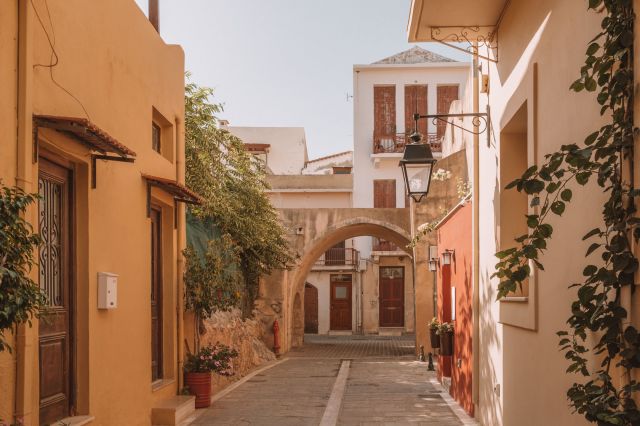
Where to Stay in Crete: Best Towns for 2024 Travel
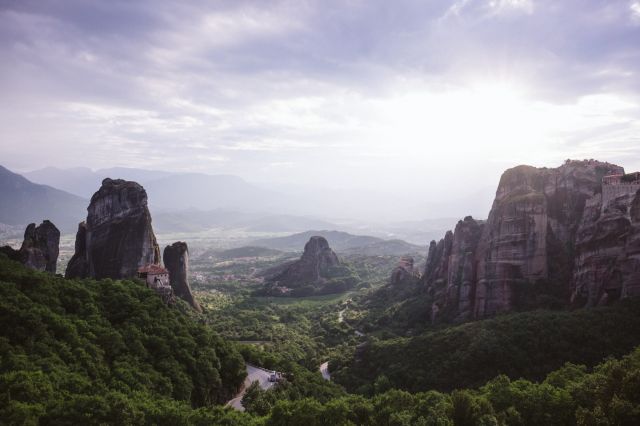
A Super Efficient Guide to Visiting Meteora, Greece in 2024
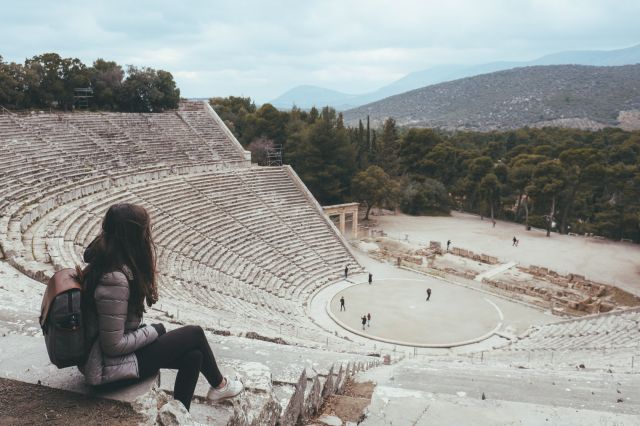
7 Most Exciting Day Trips From Athens in 2024

Search Smartraveller

Latest update
Exercise normal safety precautions in Greece.
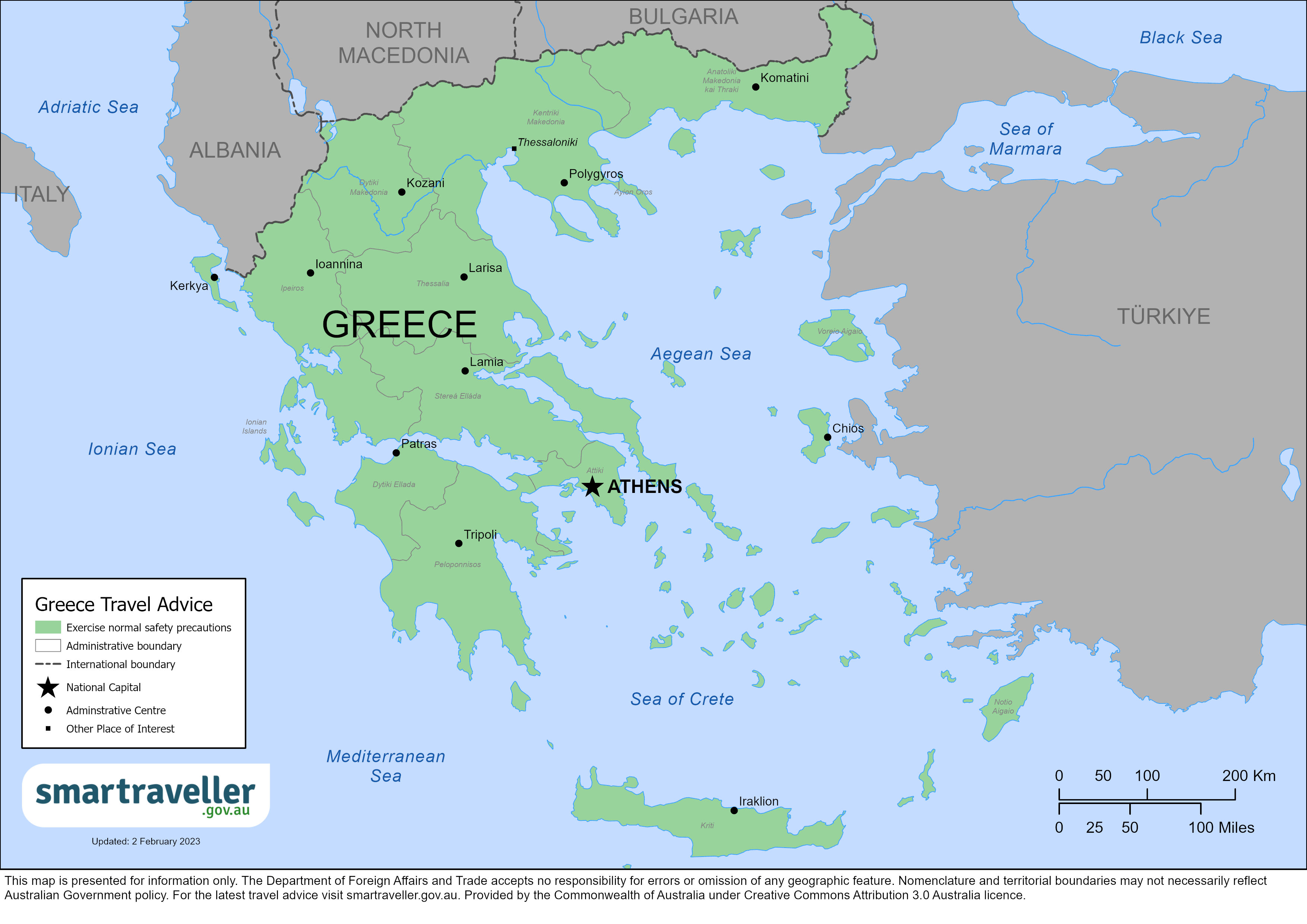
Greece (PDF 325.12 KB)
Europe (PDF 2.62 MB)
Local emergency contacts
Fire and rescue services, medical emergencies, advice levels.
Exercise normal safety precautions in Greece.
- Extreme temperatures are affecting many areas of Greece, and more wildfires are possible throughout the summer months. Contact your travel provider and monitor the media for the latest updates. Read our advice on what to do if you're overseas and there's a bushfire near you .
- Strikes, protests and demonstrations take place regularly and can turn violent. Rioting can break out with little warning. Violent clashes have occurred between supporters of rival football teams. Avoid affected areas, monitor media and follow the advice of local authorities.
- Petty crime and theft are serious issues in tourist areas and on buses and trains. Pickpocketing, bag snatching, and slashing luggage to steal belongings are common. Pay close attention to your belongings.
- Terrorist attacks have occurred at or near popular tourist areas in central Athens. Always be alert. Take official warnings seriously.
Full travel advice: Safety
- Heatwaves are becoming more frequent over the summer months. Drink plenty of water, wear light clothing, stay in air conditioning or shaded areas, and follow the advice of local authorities.
- Medications such as codeine are subject to special rules. Carry a prescription and a letter from your doctor.
- Measles is common in Greece. Make sure your vaccinations are up to date.
- The standard of medical care varies. Public hospitals are short on medical supplies and provide limited nursing care. Family or friends usually provide care.
Full travel advice: Health
- Always carry an ID, such as a photocopy of your passport.
- It's illegal to take photos of military sites and personnel. It's also illegal to smoke indoors.
- You may have to do military service if you're a male dual national. If you're of Greek descent and born outside of Greece, even if you don't think you're a Greek citizen, get advice from the nearest Greek Embassy or Consulate before you travel.
- Same-sex relationships are legal in Greece, though attitudes vary throughout the country. Avoid public displays of affection, especially in rural areas. Attitudes are generally more accepting on Greek islands such as Mykonos, Santorini and Ios.
Full travel advice: Local laws
- Greece is a part of the Schengen area . This allows you to enter without a visa in some cases. Get an entry stamp in your passport from border control when you first enter the Schengen area.
- Entry and exit conditions can change at short notice. Contact the nearest Greek embassy or Consulate for enquiries about your ability to enter Greece from your departure country.
Full travel advice: Travel
Local contacts
- The Consular Services Charter details what we can and can't do to help you overseas.
- For consular help, contact the Australian Embassy in Athens.
- To stay up to date with local information, follow the Embassy’s social media accounts.
Full travel advice: Local contacts
Full advice
Petty crime
Petty crime is a serious issue in tourist areas, including Monastiraki and Syntagma Square in central Athens. It also occurs on public transport and in accommodation, including short-term rentals.
Theft, including pickpocketing, bag snatching and slashing luggage, is common on buses and trains to and from the Athens airport.
Organised groups of thieves often use distraction techniques, such as crowding and pushing at metro stop exits.
To reduce the risk of theft:
- stay in physical contact with your belongings, particularly on public transport and on buses and trains to and from the airport
- be alert at tourist spots in central Athens and on the islands
- don't leave bags on the back of chairs or the floor in cafés or restaurants
- carry your day bag with one strap across your body and carry small backpacks at the front of your body
- if driving on holiday, keep your valuables with you, always lock your vehicle, and park in a well-lit area or a secure car park.
Tourist scams
Tourist scams exist in Greece, including taxis, hotels, restaurants, and vehicle hire services. If you've been the victim of a scam, report your claims to the nearest Police station and be prepared to support your claim with evidence.
Under Greek law, all suppliers of goods and services must issue you a receipt.
Physical and sexual assault
Serious physical and sexual assaults occur in Athens and on islands such as Mykonos, Santorini and Ios. There's also a risk of drink spiking with the intention of sexual assault.
Racially motivated and homophobic attacks have occurred.
To protect yourself:
- don't walk alone in isolated areas at night, especially in the Athens suburb of Omonia and at the railway and bus stations of Larissa and Peloponissos
- save the location of your accommodation on the maps app on your phone for easy access
- keep an eye on your drink and don't accept drinks from strangers or leave drinks unattended.
- create a shared communication chat with your fellow travellers to stay in touch if separated.
Before you travel, read our guidance on reducing the risk of sexual assault . We also have an advice page on what to do immediately after a sexual assault, reporting a sexual assault overseas, and available counselling.
More information:
- Partying safety
Cyber security
You may be at risk of cyber-based threats during overseas travel to any country. Digital identity theft is a growing concern. Your devices and personal data can be compromised, especially if you’re connecting to Wi-Fi, using or connecting to shared or public computers, or to Bluetooth.
Social media can also be risky in destinations where there are social or political tensions, or laws that may seem unreasonable by Australian standards. Travellers have been arrested for things they have said on social media. Don't comment on local or political events on your social media.
More information:
Cyber security when travelling overseas
Terrorism occurs in Europe. Targets across Europe have included:
- public transport
- transport hubs
- public places popular with tourists
European security services have disrupted some planned attacks in recent years.
Radical groups have staged attacks, mainly in Athens. Attackers have previously used bombs or guns. People have been injured but rarely killed. Substantial damage to buildings and vehicles can occur.
Terrorist targets have included:
- government institutions
- former government ministers
- the offices of members of parliament
- foreign diplomatic missions
Terrorists haven't targeted tourists. But some attacks have happened near popular tourist areas in central Athens, such as Syntagma Square.
To protect yourself from terrorism:
- be alert to possible threats, especially in public places
- take care around areas terrorists tend to target
- monitor the media for new threats
- take official warnings seriously
- follow the advice of local authorities
Report suspicious activity or items to the police.
If there's an attack, leave the area as soon as it's safe. Avoid the affected area in case of secondary attacks.
Terrorism is a threat worldwide.
Civil unrest and political tension
Protests and riots
Public protests, strikes, demonstrations and events that draw large groups of people occur regularly and often with little notice, mainly in central Athens around Syntagma Square, Omonia Square and Exarchia. They can also occur in major cities, including Thessaloniki around Aristotelous Square, Egnatia Street, the Arch of Galerius and the campus of Aristotle University. These protests can disrupt public transport and roads. Protesters and police could also clash. Sometimes petrol bombs and fireworks are thrown by protesters, and police deploy tear gas.
Civil unrest is more likely on days of national or commemorative significance, including:
- 1 May — Labour Day
- 17 November — the anniversary of the 1973 student riots
- 6 December — the anniversary of the 2008 riots
Violent clashes can occur between supporters of rival football teams. Molotov cocktails and stones have been thrown and people have been killed.
To protect yourself during periods of unrest:
- avoid public protests
- monitor local media for possible unrest or strikes
- keep a low profile
- plan to avoid areas known for unrest on days of national significance
- change your travel plans if disruptions arise
Road closures
Road closures are common in Athens. Officials don't always announce them in advance.
Contact your airline, travel agent or insurer for help with transport disruptions.
Monitor the media for news on strikes that may cause road closures.
- Demonstrations and civil unrest
Adventure activities
Transport and tour operators don't always follow safety and maintenance standards.
If you plan to do an adventure activity :
- check if your travel insurance policy covers it
- ask about and insist on minimum safety requirements
- always use available safety gear, such as life jackets or seatbelts
If proper safety equipment isn't available, use another provider.
Climate and natural disasters
Greece experiences natural disasters and severe weather .
Information on national disaster incidents and severe weather is posted by local authorities and @112Greece (in Greek) on social media. Alert messages (in Greek) may be sent by local authorities to mobile numbers advising of critical incidents. For updated information on natural disasters, see civilprotection.gov.gr .
Heavy rainfall can lead to flooding in some regions, with road closures and interruptions to power and other services. Seek shelter, monitor the media and follow the advice of local authorities.
Bush and forest fires occur during the summer months, from June to September. Fires can start close to cities and tourist locations with little warning and travel quickly. Fatalities have occurred.
Expect travel disruptions if you're due to travel to an area that might be affected by wildfires. Monitor the media and contact your travel provider for the latest updates. The air quality during these periods may deteriorate due to heavy smoke. Forest fires are highly dangerous and unpredictable.
- Floods and fires
- There's a bushfire
Earthquakes and volcanoes
Greece is in an active seismic zone and experiences earthquakes and volcanic activity .
Get updates from the Global Disaster Alert and Coordination System .
Natural disasters
If a natural disaster or severe weather happens:
- monitor local media and other sources
- keep informed about possible safety risks
- Travel insurance
Get comprehensive travel insurance before you leave.
Your policy needs to cover all overseas medical costs, including medical evacuation. The Australian Government won't pay for these costs.
If you can't afford travel insurance, you can't afford to travel. This applies to everyone, no matter how healthy and fit you are.
If you're not insured, you may have to pay many thousands of dollars up-front for medical care.
- what activities and care your policy covers
- that your insurance covers you for the whole time you'll be away.
Physical and mental health
Consider your physical and mental health before you travel, especially if you have an existing medical condition.
See your doctor or travel clinic to:
- have a basic health check-up
- ask if your travel plans may affect your health
- plan any vaccinations you need
Do this at least 8 weeks before you leave.
If you have immediate concerns for your welfare or the welfare of another Australian, call the 24-hour Consular Emergency Centre on +61 2 6261 3305 or contact your nearest Australian Embassy, High Commission or Consulate to discuss counselling hotlines and services available in your location.
- General health advice
- Healthy holiday tips (Healthdirect Australia)
Medications
Not all medication available over the counter or by prescription in Australia is available in other countries. Some may even be considered illegal or a controlled substance, even if prescribed by an Australian doctor.
If you plan to bring medication, check if it's legal in Greece. Take enough legal medicine for your trip in its original packaging. The name on the prescription should match the name on your passport.
Carry a copy of your prescription and a letter from your doctor stating:
- what the medicine is
- your required dosage
- that it's for personal use
Codeine and other prescription opiates can only be issued with a prescription from an accredited Greek medical professional.
For more information, contact the Greek National Organization of Medicines:
· By telephone: 0030 213 2040 395 / 285 / 225 / 000
· By email: [email protected] / [email protected]
- Australian Embassy in Athens
Health risks
Heatwaves are becoming more frequent over the summer months. They can cause heat exhaustion and heat stroke. Drink water, wear a hat and light clothing and stay in air conditioned buildings or shaded areas.
Many major tourist sites have little shade. At peak tourist periods, queues at major attractions can involve waiting over an hour in the sun. Plan your visit to these sites, keep an eye on the weather forecast, and follow the advice of local authorities.
Measles is common in Greece. The country is experiencing an increase in measles cases.
Make sure your vaccinations are up-to-date before you travel.
- Department of Health and Aged Care Measles Outbreaks 2019
- Department of Health and Aged Care Measles Immunisation Service
Insect-borne diseases
Cases of West Nile virus (WNV) have been reported in Greece. There's no vaccine to prevent it.
To protect yourself from disease:
- make sure your accommodation is insect-proof
- use insect repellent
- wear long, loose, light-coloured clothing
- Infectious diseases
- Hellenic Center for Disease Control and Prevention
Foodborne diseases
Outbreaks of foodborne diseases, including brucellosis , sometimes happen.
To protect yourself from illness, avoid:
- uncooked and under-cooked food
- unpasteurised dairy products
See a doctor immediately if you suspect food poisoning or have a fever or diarrhoea.
Medical care
Medical facilities.
Services provided by hospitals and medical centres aren't free, and payment is required before you leave the facility. Sometimes, the medical provider may ask you for payment before you receive treatment.
The standard of medical facilities and care vary in quality. Public hospitals in Greece are below the standard in Australia. Considerable delays may be encountered with non-urgent surgeries and other medical treatments at public hospitals.
Public hospitals can have shortages of medical supplies, including essential medication. They also have limited nursing care. You may be asked to pay a minor fee for medical treatment at a hospital or medical centre. Friends and relatives are usually required to give around-the-clock care.
If you become seriously ill or injured, you may need evacuation. This is more likely if you're in a remote area or on a Greek island. You might be moved to Athens or another place with better facilities. Medical evacuation can be very expensive.
Public ambulances can be slow to respond to emergencies and vary in quality. Private hospitals operate their own ambulances and provide better quality service.
Private hospital costs are high.
You're subject to local laws and penalties, including those that appear harsh by Australian standards. Research local laws before travelling, especially for an extended stay.
If you're arrested or jailed, the Australian Government will do what it can to help you under our Consular Services Charter . But we can't get you out of trouble or out of jail.
Breaking the law can lead to severe penalties, large fines and jail.
Penalties for drug possession, use or trafficking, even small amounts, include heavy fines and prison sentences.
- Carrying or using drugs
Commercial surrogacy is illegal in Greece.
- Going overseas for international surrogacy
In Greece, it's illegal to:
- not carry a photo ID, such as a clear photocopy of your passport
- carry weapons of any type (including pocketknives and pepper spray)
- smoke in indoor public places. The penalty is a fine of up to 500 euros.
- engage in sexual conduct with a person aged under 18
- breach customs rules about the export of Greek antiquities
It's also illegal to take photos of:
- military installations
- military personnel
- places with signs banning photography
Recreational and commercial flying of drones is regulated. Drones must be registered for use across the European Union.
Non-compliance may lead to fines and drone confiscation.
Useful links
- Information for visitors concerning drones - Hellenic Civil Aviation Authority (HCAA)
- Civil drones - European Union Aviation Safety Agency
Australian laws
Some Australian criminal laws still apply when you're overseas. If you break these laws, you may face prosecution in Australia.
Staying within the law and respecting customs
Dual citizenship
Dual citizenship is legally recognised in Greece.
Greek males aged 19 and above have military service obligations. You may have to do military service if you're a male Australian-Greek dual national. This can apply if you are of Greek descent and were born outside of Greece, even if you don't think you have Greek citizenship.
There are penalties if you don't comply, and you may be prevented from leaving Greece.
Get advice from the nearest Greek embassy or consulate before you travel if you:
- have Greek citizenship
- may be eligible for Greek citizenship
Local customs
Dress codes are relaxed in tourist areas and resorts. Dress modestly in places such as churches and religious buildings.
Take care not to offend. If in doubt, seek local advice.
Avoid public displays of affection, especially in rural areas.
Same-sex sexual activity is legal but isn't widely accepted.
Advice for LGBTI people
Visas and border measures
Every country or territory decides who can enter or leave through its borders. For specific information about the evidence you'll need to enter a foreign destination, check with the nearest embassy, consulate or immigration department of the destination you're entering.
Greece is a part of the Schengen area . This allows you to enter without a visa in some cases. Get an entry stamp in your passport from border control when you first enter the Schengen area.
Entry and exit conditions can change at short notice, and you'll need a visa in some situations. Contact the nearest Greek Embassy or Consulate for details about visas, currency, customs and quarantine rules.
- Visit Greece
- Embassy of Greece
Entry into Greece
Contact the nearest Greek Embassy or Consulate for the latest entry requirements.
Other formalities
Recognition of nationality.
If you were born in Greece, you might have problems entering if the place of birth stated on your Australian passport is no longer officially recognised by Greece.
Officials may deny entry, especially if you're entering Greece from the Republic of North Macedonia.
We can't intervene on your behalf if Greek officials refuse you entry to Greece.
Some countries won't let you enter unless your passport is valid for 6 months after you plan to leave that country. This can apply even if you're just transiting or stopping over.
Some foreign governments and airlines apply the rule inconsistently. Travellers can receive conflicting advice from different sources.
You can end up stranded if your passport is not valid for more than 6 months.
The Australian Government does not set these rules. Check your passport's expiry date before you travel. If you're not sure it'll be valid for long enough, consider getting a new passport .
Always carry your passport when crossing borders, even within the Schengen area .
Lost or stolen passport
Your passport is a valuable document. It's attractive to people who may try to use your identity to commit crimes.
Some people may try to trick you into giving them your passport. Always keep it in a safe place.
If your passport is lost or stolen, tell the Australian Government as soon as possible:
- In Australia, contact the Australian Passport Information Service .
- If you're overseas, contact the nearest Australian embassy or consulate .
Passport with ‘X’ gender identifier
Although Australian passports comply with international standards for sex and gender, we can’t guarantee that a passport showing 'X' in the sex field will be accepted for entry or transit by another country. Contact the nearest embassy, high commission or consulate of your destination before you arrive at the border to confirm if authorities will accept passports with 'X' gender markers.
LGBTI travellers
The official currency of Greece is the Euro.
You must declare amounts over 10,000 euros or equivalent if you're travelling between Greece and any non-European Union (EU) country. This covers all forms of currency, not only cash.
You don't need to declare it if you're travelling to or from another EU country.
You'll be fined if you don't declare it or declare the wrong amount when entering or leaving Greece.
Greece has daily ATM withdrawal limits. However, they don't apply to most major foreign debit and credit cards.
If you have Greek citizenship, you can only take up to 10,000 euros when leaving Greece.
Local travel
Extension of stays
Extension of stays in Greece beyond the allowed 90 days isn't automatic. Requests for extension with the relevant local authority should be lodged at least 4 weeks before your visa-free period expires. Present your request to the office of the Greek police on aliens issues.
Driving permit
Australian driver's licences are officially recognised as valid for use in Greece. If you plan on driving in Greece, you may not need an International Driving Permit. Contact the Greek Embassy or Consulate for more information on your licence type.
Your licence must be valid for the type of vehicle you'll drive, including quad bikes, motorbikes, mopeds, motor scooters and other similar vehicles.
You could face a large fine if you don't have the correct licence. Your insurance won't cover you if you have an accident.
Road travel
Driving is hazardous due to aggressive driving and poor-quality roads and vehicles.
Traffic police sometimes direct traffic at major intersections. If the traffic lights conflict with police directions, follow the directions of the traffic police.
During peak season, severe traffic congestion occurs in the main cities and on the islands.
Drivers and motorcyclists often ignore traffic signals. They rarely give way to pedestrians.
Take care when crossing the road, including at pedestrian crossings, controlled intersections, and footpaths. Drivers often don't stop at pedestrian crossings.
Footpaths in Greece are very narrow and often blocked.
Check your insurance covers car hire and the use of quad bikes, motorbikes or jet skis. Get advice on any gaps. Your insurance may have conditions such as holding the correct licence for vehicles. Make sure you're covered. Check what additional fees may apply for any damage to hire vehicles.
Driving while intoxicated or under the influence of any illegal substance is illegal. Insurers won't cover accidents when drivers are under the influence of alcohol.
Driving offences may also attract heavy penalties.
- Driving or riding
- Driving in Greece - European Commission
Quad bikes and motorcycles
Quad bike and motorcycle accidents cause serious injuries and deaths every summer on the Greek islands. Operating or riding quad bikes and motorcycles while intoxicated is illegal.
Always wear a helmet. It's illegal not to wear one. It may also invalidate your travel insurance if you have an accident.
If you experience any issues with the operation of the bike, it's recommended that you return the bike as soon as possible to the rental company.
Only use licensed taxis. Always ensure the driver uses the meter. Be careful when using credit cards to pay fares. Ask for and check your receipt.
Ferries and large catamarans carry the bulk of visitors to the Greek islands. Some services do not provide suitable access for people with disabilities.
During the tourist season, from May to October, be prepared for high temperatures and large crowds at popular seaports.
Usually, there are only one or two brief announcements on ferries before arrival or departure.
In most cases, you'll need to carry your luggage up and down stairs. Help with luggage is usually unavailable unless you've booked a private cabin in advance.
On some Greek islands, such as Santorini, smaller boats or tenders transport cruise ship passengers to and from shore. Passengers using tenders may have difficulty getting up and down stairs.
Arrange for a coach or taxi to collect you in advance, or you may find it difficult to get transport.
Make sure your insurance covers the following:
- any existing health condition
- your planned activities
- travel on ferry and cruise ships
Australian-flagged sailboats or yachts sailing in the Mediterranean may be subject to Greek and EU taxes and duties. Seek advice from the Hellenic Coast Guard or the nearest embassy or consulate of Greece before you travel. If you've been involved in a maritime accident, the Greek Coast Guard may request under its regulations to inspect your vessel to confirm it is seaworthy.
- Going on a cruise
- Travelling by boat
To find out about flight delays at Athens International Airport, check their website or phone (+30 210) 353 0000.
DFAT doesn't provide information on the safety of individual commercial airlines or flight paths.
Check Greece's air safety profile with the Aviation Safety Network.
Emergencies
Depending on what you need, contact your:
- family and friends
- travel agent
- insurance provider
For non-urgent criminal issues, contact local police at the nearest police station.
Always get a police report when you report a crime.
Your insurer should have a 24-hour emergency number.
Tourist police
Are available 24/7 and can be contacted on 171.
The Tourist Police help with non-serious crimes and can provide police reports and certificates for theft of personal items and lost travel documents.
There are tourist police offices across Greece, including on major islands.
The main office is at 4 Dragatsaniou Street, Klafthmonos Square, in Central Athens and is open all year. Call (+30 210) 322 2230 or (+30 210) 322 2232.
Consular contacts
Read the Consular Services Charter for what the Australian Government can and can't do to help you overseas.
For consular help, contact:
Australian Embassy, Athens
5 Hatziyianni Mexi Street
Athens 115 28, Greece
Phone: (+30 210) 870 4000
Website: greece.embassy.gov.au
Facebook: Australia in Greece
Twitter: @AusAmbAthens
Check the Embassy website for details about opening hours and any temporary closures.
24-hour Consular Emergency Centre
In a consular emergency, if you can't contact an embassy, call the 24-hour Consular Emergency Centre on:
- +61 2 6261 3305 from overseas
- 1300 555 135 in Australia

Travelling to Greece?
Sign up to get the latest travel advice updates..
Be the first to know official government advice when travelling.
I've visited the Greek island of Santorini twice — and if you think it's just a tourist trap, you're going to all the wrong places
- I visited Santorini in both 2012 and 2019, and had completely different experiences each time.
- My second trip made me realize that people who think the Greek island has been spoiled by its millions of annual visitors are simply going to all the wrong places.
- Instead of staying in the capital of Fira or the Instagrammable Oia, I opted for Imerovigli, which is in between both and much more relaxed.
- The area had plenty of great, affordable restaurants and bars, and the view at my hotel was so incredible that some days I didn't even leave — particularly during sunset.
- While the main towns are worth a short visit, the lesser-known parts of the island, like Imerovigli and the traditional town of Pyrgos, are where you'll discover its true charm.
- Visit Insider's homepage for more stories .
Firstly, let's get one thing out of the way — Santorini is a bit of a nightmare to get to. The first time I visited in 2012, I arrived by a violently rocky ferry, and immediately puked into a nearby garbage can along with dozens of others in the hordes that arrived with me.
This time, I made the choice to fly to the island, which was far less vomit-inducing, though the tiny airport (and finding our transfer outside) was admittedly chaotic.
Secondly, there's no denying the island attracts a ton of tourists — it received more than two million in 2018.
Source: GTP
However, the beauty of the island is unlike anything else I've ever seen — and it makes it 100% worth it, especially if you know where to go.
The first time I visited, I stayed close to the busy modern capital of Fira ...
... but this time, I decided to set up camp in Imerovigli, which lies half way between Fira and the Instagrammable Oia. The experience was completely different, and far more chilled out.
While some hotels in Fira and Oia (known for its sunsets) are completely packed each day, Thea Apartments was quiet all the time, with just a few people eating breakfast on their private terraces each morning — with this view as their backdrop.
Breakfast was one of my favorite parts of the day, and it was included in the €230 ($260)-a-night cost of the hotel (which despite sounding pricey, was cheaper than what you'd find in Oia or Fira).
Some days, I didn't even leave the hotel, so it was worth every penny. There were plenty of scenic reading spots ...
... including the plunge pool, where I was often the sole bather.
Imerovigli itself is home to some great restaurants and bars, including Avocado, where I ate some life-changing octopus ...
... and Confetti Dessert Boutique, which served some of the most incredible ice cream I've ever had.
There's a walking path which takes you both to Fira in one direction, and Oia in the other (as long as you're not afraid of steps). I loved the views on the way to Fira, though wasn't particularly fussed about making it to the town itself, which we only did once (because of a restaurant).
There were plenty of spots to stop off for a drink along the path ...
... as well as some great places to eat, such as the traditional To Briki in Firostefani. Prices were also more reasonable than a lot of what you'll find right in the capital — this incredible Greek Salad cost around €10 ($11).
I felt far more relaxed than I had the first time around.
One thing I did repeat from my first trip, however, was a trip around the island on a yacht, which is the best way to see it in all of its glory.
The yacht stops at beaches, and anchors in plenty of places where you can take a dip ...
... including the hot springs at the volcanic island of Palia Kameni.
For €130 ($144) a person, the five-hour trip included unlimited drinks and a delicious Greek BBQ lunch — and there were only a few other people on board. People often complain about Santorini being expensive, but it felt like pretty good value.
My white bathing suit didn't survive the sulfur of the hot springs, but it was completely worth it.
There are plenty of free things to do, too. In Imerovigli, Skaros Rock makes for the perfect hike (though I recommend doing it as early in the day as possible, before it gets too hot).
The view from the top is incredible — and so quiet. When we hiked it around 10 a.m., there were only a handful of other people along the path.
On the other side of the rock, we found what looked like an abandoned church, and it made for a peaceful photo (and rest) spot.
One day, we decided to take the bus to Oia, fully prepared that it would be busy, but wanting to take it in just once.
The town is super quaint, with lots of winding streets, shops, and restaurants ...
... but tourists pack it full, particularly at sunset (it's the closest spot to the sun on the whole island). While it's certainly not the place to go if you hate crowds, it's pretty cool to hear everyone cheering when the sun finally disappears beyond the horizon.
It also means there are plenty of people around to take your picture.
With plenty of research, though, you can still find quiet spots in Oia, such as the Oia Vineyart wine bar and restaurant, where we were the only people. Despite its color, local Greek wine is truly amazing.
There are also some restaurants worth traveling to Oia for, such as the slightly hidden away Roka, where you go for the food — not the sunset.
If sleepy, traditional towns are more your thing, you can also take the bus to Pyrgos, towards the opposite end of the island, for your fill of blue and white.
The streets were mostly empty ...
... with the exception of a few locals.
This was the view from the restaurant where we ate lunch — and every table around us was empty.
Near Pyrgos is the Santo Wines winery, which, despite being full of tourists and home to a wedding when we visited, offered one of the most fantastic views (and wines) of the trip.
However, we ultimately decided our favorite view was of the sunset from our hotel — the owner even brought us wine and baklava as we sat watching it almost every evening. One night we even skipped going out for dinner and ordered pizza.
Whether it was from the bar next door ...
... or just from our balcony, the sight was truly breathtaking — and incredibly peaceful, like most of the trip.
Having now traveled to Santorini twice, staying in different parts of the island and doing different things each time, I can see how tourists who only visit Fira and Oia would think the island has been completely spoiled by its many visitors.
However, if you know where to go, the experience is completely different.
While the main towns are still worth a short visit, the lesser-known parts of the island, like Imerovigli and Pyrgos, are where you'll discover its true charm — and they're the reason why I know I'll be back again one day.
My husband and I splurged on a Santorini hotel for our honeymoon that costs over $400 per night and is built into a cave. Here's why it was totally worth it
A travel company is paying someone to explore the Greek islands and stay in luxury hotels while taking Instagram photos on a free phone — and they can bring a friend
Santorini tourists are being asked to put themselves 'in the donkey's hooves' before riding one up the island's 600-step cliffside
People are calling an 18-year-old YouTuber 'privileged' and 'entitled' for saying her trip to Greece was 'not fun'
- Main content
- Skip to main content
- Skip to "About this site"
Language selection
Search travel.gc.ca.
Help us to improve our website. Take our survey !
COVID-19: travel health notice for all travellers
Greece travel advice
Latest updates: The Need help? section was updated.
Last updated: March 25, 2024 15:14 ET
On this page
Safety and security, entry and exit requirements, laws and culture, natural disasters and climate, greece - take normal security precautions.
Take normal security precautions in Greece.
Back to top
Petty crime
Petty crime, such as pickpocketing, purse snatching and luggage theft occurs. Tourists are frequently targeted.
Organized groups of thieves often use distraction techniques and are particularly active:
- at tourist sites and attractions
- in restaurants, patios and bars
- in hotel lobbies
- on public transportation, including metro and trains to and from Athens International Airport
- at airports, bus and railway stations including Larissa and Peloponnese stations in Athens
While you’re in Greece:
- ensure that your belongings, including your passport, are secure at all times
- don’t keep your passport and other types of ID at the same place and carry a photocopy rather than the original
- avoid showing signs of affluence
- avoid carrying large sums of cash or unnecessary valuables
- pay attention to your surroundings, particularly in crowded and tourist areas
- be wary of unsolicited offers or advice from strangers
- avoid isolated areas, parks and down-market bars and restaurants, especially after dark
Violent crime
Violent crime, such as attacks committed by far-right extremists against individuals belonging to ethnic, religious or political minorities are uncommon, but do occur.
Always be vigilant and aware of your surroundings.
Spiked food and drinks
Never leave food or drinks unattended or in the care of strangers. Be wary of accepting snacks, beverages, gum or cigarettes from new acquaintances. These items may contain drugs that could put you at risk of sexual assault and robbery.
Victims of crime
If you are a victim of a crime, go to the nearest police station to report it. Keep a copy of your report, as you may need it to make a claim to your insurance provider.
If you are a victim of sexual assault:
- seek medical assistance, whether or not you appear to have been physically harmed
- contact the local police immediately and ensure they file a report
- inform consular officials at the nearest Canadian embassy or consulate
The Greek police has a dedicated unit to assist foreign tourists and offers services in English and other languages.
You can contact the tourism police 24/7 anywhere in Greece by dialling the 1571 or the regular police at 100.
Credit card and ATM fraud occurs.
When using debit or credit cards:
- pay careful attention when your cards are being handled by others
- use ATMs located in public areas or inside a bank or business
- avoid using card readers with an irregular or unusual feature
- cover the keypad with one hand when entering your PIN
- check for any unauthorized transactions on your account statements
Overseas fraud
There is a threat of terrorism in Europe. Terrorists have carried out attacks in several European cities. Terrorist attacks could occur at any time.
Targets could include:
- government buildings, including schools
- places of worship
- airports and other transportation hubs and networks
- public areas such as tourist attractions, restaurants, bars, coffee shops, shopping centres, markets, hotels and other sites frequented by foreigners
Be particularly vigilant if attending:
- sporting events
- religious holidays
- other public celebrations
Terrorists have used such occasions to mount attacks.
Extremist groups and organizations have used improvised explosive devices, bombs and arson attacks in urban areas to target:
- the Greek State and its institutions
- foreign commercial and diplomatic interests
- ethnic, religious and migrants’ centers and organizations
While tourists are not specifically targeted, you could find yourself in the wrong place at the wrong time.
Demonstrations and strikes
Demonstrations.
Demonstrations take place regularly, particularly in Athens and Thessaloniki. They are usually held on days of social or historical significance, such as:
- Workers' Day on May 1
- the commemoration of the Athens Polytechnic uprising of 1973 on November 17
- the commemoration of the riots of 2008 on December 6
In Athens, demonstrations and marches occur primarily in areas around:
- Syntagma Square, in front of the Greek Parliament
- Omonia Square
- the National Technical University complex on Patision Avenue
- Exarchia neighbourhood
In Thessaloniki, they occur primarily in areas around:
- Aristotelous Square
- Egnatia Street
- the Arch of Galerius
- the campus of the Aristotle University
Even peaceful demonstrations can turn violent at any time. Demonstrations and strikes can also lead to disruptions to traffic and public transportation.
- Avoid areas where demonstrations and large gatherings are taking place
- Follow the instructions of local authorities
- Monitor local media for information on ongoing demonstrations
Strikes and pressure tactics occur regularly, particularly in key sectors such as transport and public health services. These strikes can disrupt travel and public services.
- Consult local media to be aware of strikes that may affect your stay or travel plans
- In the event of a transport strike, plan extra time to get to your destination
Mass gatherings (large-scale events)
Women's safety
Foreigners have been sexually assaulted, most often on the islands.
Don’t accept rides from strangers or casual acquaintances.
Advice for women travellers
Water activities
Many beaches in Greece are supervised and enforce excellent safety procedures.
However, tidal changes and strong winds can cause hazardous currents and riptides.
Coral, urchin, jellyfish and other aquatic life found along reefs can poison, sting or cause infection if touched or stepped on.
- Always obey warning flags at beaches
- Ask local authorities about the presence of dangerous species and immediately seek medical assistance if you get hurt
- Wear reef shoes to protect yourself against stone and coral cuts or urchin stings
- Keep a safe distance from boats and restricted areas
- Avoid visiting beaches or coastal areas during periods of severe weather warnings
- Look out for signs warning of cliff erosion and falling rocks
- Don’t dive into unknown waters, as hidden rocks or shallow depths can cause serious injury or death
- Exercise caution and follow the advice of the local authorities
Recreational boating
If you are planning to go boating:
- know the capacity of your boat and don’t exceed it
- know and respect the navigation rules
- follow safe practices for all activities on the water
- keep a safe distance from areas reserved for certain activities such as snorkeling
- carry a VHF marine radio that will generate your position in case of emergency
- be prepared for emergencies
Water safety abroad
Outdoor activities, such as hiking, can be dangerous if unprepared. Trails are not always marked, and weather conditions can change rapidly, even in summer.
If you intend to go hiking or mountaineering:
- never do so alone, and do not part with your hiking companions
- obtain detailed information on your activity and on the environment in which you will be before setting out
- buy travel insurance that includes helicopter rescue and medical evacuation
- ensure that your physical condition is good enough to meet the challenges of your activity
- avoid venturing off marked trails
- ensure that you’re adequately equipped and bring sufficient water
- stay informed about weather and other conditions that may pose a hazard
- be aware of the presence of dangerous species such as snakes
- inform a family member or friend of your itinerary
- dial 112 from a cellphone for any emergency
Road safety
Road conditions and road safety can vary greatly throughout the country.
Severe traffic congestion and difficult terrain may lead to hazardous driving conditions.
Accidents causing fatalities are common. Drivers often drive at excessive speeds and are reckless.
Drivers and speeding motorbikes don’t always yield to pedestrians or bicycles. Exercise caution when walking, crossing streets or biking.
Accidents involving tourists renting motorbikes, scooters or mopeds are common, especially on the islands.
Small, unlicensed rental agencies do not always offer vehicles that comply with up-to-date safety standards.
- Read the rental contract carefully
- Inspect the equipment before renting it
- Never drink and drive
- Reduce your speed on rough and uneven terrain
- In the event of an accident, wait for police to arrive
You may not be able to file an insurance claim without a police report.
Public transportation
Public transportation is generally safe and reliable. The bus network is extensive, and train services connect certain major cities. Athens has a modern metro system. Strikes may sometimes affect transportation services.
Taxis are generally safe. Metered taxis are widely available.
There are fixed rates for transportation to and from Athens International Airport. Confirm the rate before departure.
Ferries between mainland Greece and its islands meet European safety standards.
Weather conditions and strong winds can lead to cancellations or significant delays. Rough sea conditions may cause motion sickness, particularly on high-speed ferries.
- Pay attention to pre-departure notices from your carrier
- Always reconfirm departure schedule before heading to the port
We do not make assessments on the compliance of foreign domestic airlines with international safety standards.
Information about foreign domestic airlines
Every country or territory decides who can enter or exit through its borders. The Government of Canada cannot intervene on your behalf if you do not meet your destination’s entry or exit requirements.
We have obtained the information on this page from the Greek authorities. It can, however, change at any time.
Verify this information with the Foreign Representatives in Canada .
- Schengen area
Greece is a Schengen area country. Canadian citizens do not need a visa for travel to countries within the Schengen area. However, visa-free travel only applies to stays of up to 90 days in any 180-day period. Stays are cumulative and include visits to any Schengen area country.
If you plan to stay in the Schengen area for a longer period of time, you will need a visa. You must contact the high commission or embassy of the country or countries you are travelling to and obtain the appropriate visa(s) prior to travel.
Useful links
- Foreign Representatives in Canada
Entry requirements vary depending on the type of passport you use for travel.
Before you travel, check with your transportation company about passport requirements. Its rules on passport validity may be more stringent than the country’s entry rules.
Regular Canadian passport
Your passport must be valid for at least 3 months beyond the date you expect to leave the Schengen area.
Passport for official travel
Different entry rules may apply.
Official travel
Passport with “X” gender identifier
While the Government of Canada issues passports with an “X” gender identifier, it cannot guarantee your entry or transit through other countries. You might face entry restrictions in countries that do not recognize the “X” gender identifier. Before you leave, check with the closest foreign representative for your destination.
Other travel documents
Different entry rules may apply when travelling with a temporary passport or an emergency travel document. Before you leave, check with the closest foreign representative for your destination.
- Foreign Representatives in Canada
- Canadian passports
Tourist visa: not required for stays up to 90 days in any 180-day period Business visa: not required for stays up to 90 days in any 180-day period Work visa: required Student visa: required
If you must stay in Greece longer than 90 days due to serious and unforeseen events, such as a medical emergency, you may be able to seek an extension of your stay as a visitor.
Present your request to the office of the Greek police on aliens’ issues at least 15 days before your 90-day, visa-free period expires.
Yellow fever
Learn about potential entry requirements related to yellow fever (vaccines section).
Children and travel
Learn more about travelling with children .
Relevant Travel Health Notices
- Global Measles Notice - 13 March, 2024
- COVID-19 and International Travel - 13 March, 2024
This section contains information on possible health risks and restrictions regularly found or ongoing in the destination. Follow this advice to lower your risk of becoming ill while travelling. Not all risks are listed below.
Consult a health care professional or visit a travel health clinic preferably 6 weeks before you travel to get personalized health advice and recommendations.
Routine vaccines
Be sure that your routine vaccinations , as per your province or territory , are up-to-date before travelling, regardless of your destination.
Some of these vaccinations include measles-mumps-rubella (MMR), diphtheria, tetanus, pertussis, polio, varicella (chickenpox), influenza and others.
Pre-travel vaccines and medications
You may be at risk for preventable diseases while travelling in this destination. Talk to a travel health professional about which medications or vaccines may be right for you, based on your destination and itinerary.
Yellow fever is a disease caused by a flavivirus from the bite of an infected mosquito.
Travellers get vaccinated either because it is required to enter a country or because it is recommended for their protection.
- There is no risk of yellow fever in this country.
Country Entry Requirement*
- Proof of vaccination is not required to enter this country.
Recommendation
- Vaccination is not recommended.
* It is important to note that country entry requirements may not reflect your risk of yellow fever at your destination. It is recommended that you contact the nearest diplomatic or consular office of the destination(s) you will be visiting to verify any additional entry requirements.
About Yellow Fever
Yellow Fever Vaccination Centres in Canada
Measles is a highly contagious viral disease. It can spread quickly from person to person by direct contact and through droplets in the air.
Anyone who is not protected against measles is at risk of being infected with it when travelling internationally.
Regardless of where you are going, talk to a health care professional before travelling to make sure you are fully protected against measles.
Hepatitis B is a risk in every destination. It is a viral liver disease that is easily transmitted from one person to another through exposure to blood and body fluids containing the hepatitis B virus. Travellers who may be exposed to blood or other bodily fluids (e.g., through sexual contact, medical treatment, sharing needles, tattooing, acupuncture or occupational exposure) are at higher risk of getting hepatitis B.
Hepatitis B vaccination is recommended for all travellers. Prevent hepatitis B infection by practicing safe sex, only using new and sterile drug equipment, and only getting tattoos and piercings in settings that follow public health regulations and standards.
Coronavirus disease (COVID-19) is an infectious viral disease. It can spread from person to person by direct contact and through droplets in the air.
It is recommended that all eligible travellers complete a COVID-19 vaccine series along with any additional recommended doses in Canada before travelling. Evidence shows that vaccines are very effective at preventing severe illness, hospitalization and death from COVID-19. While vaccination provides better protection against serious illness, you may still be at risk of infection from the virus that causes COVID-19. Anyone who has not completed a vaccine series is at increased risk of being infected with the virus that causes COVID-19 and is at greater risk for severe disease when travelling internationally.
Before travelling, verify your destination’s COVID-19 vaccination entry/exit requirements. Regardless of where you are going, talk to a health care professional before travelling to make sure you are adequately protected against COVID-19.
The best way to protect yourself from seasonal influenza (flu) is to get vaccinated every year. Get the flu shot at least 2 weeks before travelling.
The flu occurs worldwide.
- In the Northern Hemisphere, the flu season usually runs from November to April.
- In the Southern Hemisphere, the flu season usually runs between April and October.
- In the tropics, there is flu activity year round.
The flu vaccine available in one hemisphere may only offer partial protection against the flu in the other hemisphere.
The flu virus spreads from person to person when they cough or sneeze or by touching objects and surfaces that have been contaminated with the virus. Clean your hands often and wear a mask if you have a fever or respiratory symptoms.
Malaria is a serious and sometimes fatal disease that is caused by parasites spread through the bites of mosquitoes. Limited malaria transmission may occur in this destination, but risk to travellers is very low. Antimalarial medication is not recommended for most travellers. Consult a health care professional or visit a travel health clinic before travelling to discuss your options. It is recommended to do this 6 weeks before travel, however, it is still a good idea any time before leaving. Protect yourself from mosquito bites at all times:
- Cover your skin and use an approved insect repellent on uncovered skin.
- Exclude mosquitoes from your living area with screening and/or closed, well-sealed doors and windows.
- Use insecticide-treated bed nets if mosquitoes cannot be excluded from your living area.
- Wear permethrin-treated clothing.
If you develop symptoms similar to malaria when you are travelling or up to a year after you return home, see a health care professional immediately. Tell them where you have been travelling or living.
In this destination, rabies may be present in some wildlife species, including bats. Rabies is a deadly disease that spreads to humans primarily through bites or scratches from an infected animal.
If you are bitten or scratched by an animal while travelling, immediately wash the wound with soap and clean water and see a health care professional.
Before travel, discuss rabies vaccination with a health care professional. It may be recommended for travellers who will be working directly with wildlife.
Safe food and water precautions
Many illnesses can be caused by eating food or drinking beverages contaminated by bacteria, parasites, toxins, or viruses, or by swimming or bathing in contaminated water.
- Learn more about food and water precautions to take to avoid getting sick by visiting our eat and drink safely abroad page. Remember: Boil it, cook it, peel it, or leave it!
- Avoid getting water into your eyes, mouth or nose when swimming or participating in activities in freshwater (streams, canals, lakes), particularly after flooding or heavy rain. Water may look clean but could still be polluted or contaminated.
- Avoid inhaling or swallowing water while bathing, showering, or swimming in pools or hot tubs.
Insect bite prevention
Many diseases are spread by the bites of infected insects such as mosquitoes, ticks, fleas or flies. When travelling to areas where infected insects may be present:
- Use insect repellent (bug spray) on exposed skin
- Cover up with light-coloured, loose clothes made of tightly woven materials such as nylon or polyester
- Minimize exposure to insects
- Use mosquito netting when sleeping outdoors or in buildings that are not fully enclosed
To learn more about how you can reduce your risk of infection and disease caused by bites, both at home and abroad, visit our insect bite prevention page.
Find out what types of insects are present where you’re travelling, when they’re most active, and the symptoms of the diseases they spread.
Animal precautions
Some infections, such as rabies and influenza, can be shared between humans and animals. Certain types of activities may increase your chance of contact with animals, such as travelling in rural or forested areas, camping, hiking, and visiting wet markets (places where live animals are slaughtered and sold) or caves.
Travellers are cautioned to avoid contact with animals, including dogs, livestock (pigs, cows), monkeys, snakes, rodents, birds, and bats, and to avoid eating undercooked wild game.
Closely supervise children, as they are more likely to come in contact with animals.
Person-to-person infections
Stay home if you’re sick and practise proper cough and sneeze etiquette , which includes coughing or sneezing into a tissue or the bend of your arm, not your hand. Reduce your risk of colds, the flu and other illnesses by:
- washing your hands often
- avoiding or limiting the amount of time spent in closed spaces, crowded places, or at large-scale events (concerts, sporting events, rallies)
- avoiding close physical contact with people who may be showing symptoms of illness
Sexually transmitted infections (STIs) , HIV , and mpox are spread through blood and bodily fluids; use condoms, practise safe sex, and limit your number of sexual partners. Check with your local public health authority pre-travel to determine your eligibility for mpox vaccine.
Medical services and facilities
Health care is adequate, but varies throughout the country.
Facilities are generally good in cities such as Athens and Thessaloniki and in towns that have large hospitals, such as Heraklion, Ioannina and Patras.
If you’re travelling to smaller islands or to remote areas, you may need a medical evacuation to a central hospital, in the event of serious illness or injury.
Make sure you get travel insurance that includes coverage for medical evacuation and hospital stays.
Travel health and safety
Keep in Mind...
The decision to travel is the sole responsibility of the traveller. The traveller is also responsible for his or her own personal safety.
Be prepared. Do not expect medical services to be the same as in Canada. Pack a travel health kit , especially if you will be travelling away from major city centres.
You must abide by local laws.
Learn about what you should do and how we can help if you are arrested or detained abroad .
Transfer to a Canadian prison
Canada and Greece are signatories to the Convention on the Transfer of Sentenced Persons. This enables a Canadian imprisoned in Greece to request a transfer to a Canadian prison to complete a sentence. The transfer requires the agreement of both Canadian and Greece authorities.
This process can take a long time, and there is no guarantee that the transfer will be approved by either or both sides.
Penalties for possession, use or trafficking of illegal drugs are severe. Convicted offenders can expect prison sentences and heavy fines.
Drugs, alcohol and travel
Identification
Local police may ask to see your identification at any time.
- Carry adequate identification at all times, such as your passport or residence permit
- Keep a photocopy of your passport in a safe place, in case it is lost or stolen
Photography
There are restrictions on photographing and filming:
- military installations and military personnel
- border areas
- harbours, airports and other transportation hubs
- churches, monasteries and monks
In and around these areas, you should always:
- verify if photography is allowed or if a special permit is required
- request permission if individuals are involved
- refrain from photographing or filming if in doubt
- comply with all requests from local authorities
Recreational and commercial flying of drones is regulated.
You must register your drone to use it across the European Union. If you don’t comply, you may be fined and your drone confiscated.
- Information to visitors concerning drones - Hellenic Civil Aviation Authority (HCAA)
- Civil drones - European Union Aviation Safety Agency
Greece has strict laws regarding the possession and use of weapons and items that may be used as weapons, such as:
- knuckledusters
- pocketknife
- pepper spray
Do not buy or travel with these items.
Cultural heritage and antiquities
There are strict laws regarding:
- purchase and exportation of antiquities and objects of special significance to the country's cultural heritage
- excavation and on-site archaeological research
- access to underwater archaeological sites
- filming and photography of archaeological sites for commercial purposes
- protection of archaeological sites and monuments
To avoid any difficulties, make sure you:
- have the proper permit to conduct activities related to cultural heritage and archaeological sites
- obtain and carry the required legal paperwork to purchase or export antiquities
While visiting archaeological sites and monuments:
- don’t film or photograph unless it is clearly allowed
- stay on the dedicated paths and respect off-limits areas
- don’t touch statues and monuments
- don’t pick up rocks or any other artifacts found on site
Greek Cultural Heritage law - Hellenic Society for Law and Archaeology
Dual citizenship
Dual citizenship is legally recognized in Greece.
If you are a Canadian citizen, but also a citizen of Greece, our ability to offer you consular services may be limited while you're there. You may also be subject to different entry/exit requirements .
Travellers with dual citizenship
National obligations
If you are a Canadian citizen, but also a citizen of Greece, or are eligible for Greek citizenship, you may be subject to compulsory military service and other aspects of Greek law.
Obtain a document certifying your status from the Embassy of Greece prior to travel.
- National service - Embassy of Greece in Ottawa
- Greek citizenship - Embassy of Greece in Ottawa
International Child Abduction
The Hague Convention on the Civil Aspects of International Child Abduction is an international treaty. It can help parents with the return of children who have been removed to or retained in certain countries in violation of custody rights. The convention applies between Canada and Greece.
If your child was wrongfully taken to, or is being held in Greece, and if the applicable conditions are met, you may apply for the return of your child to the Greek court.
If you are in this situation:
- act as quickly as you can
- contact the Central Authority for your province or territory of residence for information on starting an application under The Hague Convention
- consult a lawyer in Canada and in Greece to explore all the legal options for the return of your child
- report the situation to the nearest Canadian government office abroad or to the Vulnerable Children’s Consular Unit at Global Affairs Canada by calling the Emergency Watch and Response Centre
If your child was removed from a country other than Canada, consult a lawyer to determine if The Hague Convention applies.
Be aware that Canadian consular officials cannot interfere in private legal matters or in another country’s judicial affairs.
- List of Canadian Central Authorities for the Hague Convention
- International Child Abduction: A Guidebook for Left-Behind Parents
- Travelling with children
- The Hague Convention - Hague Conference on Private International Law
- Canadian embassies and consulates by destination
- Emergency Watch and Response Centre
If you plan on entering Greece by sea on your boat or a rented boat of a total length of over 7 metres, you must pay the Recreational and Daily Tour Cruise Ships fee (TEPAI). This must be done online prior to arrival.
Recreational and Daily Tour Cruise Ships fee - Independent Authority for Public Revenue (AADE) (in Greek)
As a tourist or temporary resident, you can drive with a valid Canadian driver’s licence.
You must have valid insurance coverage.
You must wear a helmet when driving or as a passenger of a motorcycle, a scooter or a moped. You may be fined if you fail to comply.
Carrying an individual in an irregular migration situation in your vehicle, even without your knowledge, is a criminal offence. Don’t pick up hitchhikers.
Driving in Greece - European Commission
The currency of Greece is the euro (EUR).
ATMs may not be easily available in remote areas or may be out of cash. Make sure to carry some money if you plan on visiting small islands and remote regions.
If you are carrying €10,000 or more, or the equivalent in other currencies, you must make a declaration to customs when you enter or leave the European Union. It includes sums in:
- banknotes and coins
- bearer negotiable instruments such as cheques, travellers’ cheques, promissory notes and money orders
- bonds, shares
- gold coins with a gold content of at least 90 %
- gold bars, nuggets or clumps with a gold content of at least 99.5 %
- any other convertible asset
This does not apply if you are travelling within the European Union or in transit to a non-EU country.
EU cash controls - European Commission
Seismic activity
Greece is located in an active seismic zone. Major earthquakes could occur and can cause significant damage.
Santorini and Nisyros islands have active volcanoes.
If you’re travelling near an active volcano or are practising volcano tourism:
- closely monitor volcanic activity levels through local media and official sources
- ensure that you’re well informed about conditions that may pose a hazard
- follow the advice of local authorities
- Earthquakes - What to Do?
- Latest earthquakes - National Observatory of Athens
- Volcanic eruptions - Ministry for climate crisis and civil protections
Seasonal storms and flooding
Seasonal storms and heavy rains can cause severe flooding and landslides particularly during the spring and winter months. Roads may become impassable and infrastructure damaged.
- Stay informed of the latest regional weather forecasts
- Follow the advice of local authorities, including evacuation orders
Weather forecast and alerts - Hellenic National Meteorological Service
Meltemi wind
The Meltemi or Etesian is a strong wind that regularly sweeps the Aegean and the eastern Mediterranean seas from May to September. It can blow uninterruptedly for several days. This wind may bring high waves, strong currents and may disrupt transportation.
If you travel to Greece during this period:
- expect possible transportation delays or cancellations
- be very cautious if sailing or boating
- avoid swimming during rough sea conditions
- monitor the latest regional weather forecasts
Wildfires are common between July and September, particularly in:
- the Peloponnese
- Central Greece
- Eastern Macedonia and Thrace
- the northern areas of Athens.
The air quality in areas near active fires may deteriorate due to heavy smoke.
In case of a major fire:
- stay away from affected areas, particularly if you suffer from respiratory ailments
- follow the advice of local emergency services personnel, including evacuation orders
- monitor local media for up-to-date information on the situation
Latest information on fires - General Secretariat for Civil Protection
Local services
- 112 for emergency assistance
- 1571 for tourist police
- 100 for police
Consular assistance
For emergency consular assistance, call the Embassy of Canada to Greece, in Athens, and follow the instructions. At any time, you may also contact the Emergency Watch and Response Centre in Ottawa.
The decision to travel is your choice and you are responsible for your personal safety abroad. We take the safety and security of Canadians abroad very seriously and provide credible and timely information in our Travel Advice to enable you to make well-informed decisions regarding your travel abroad.
The content on this page is provided for information only. While we make every effort to give you correct information, it is provided on an "as is" basis without warranty of any kind, expressed or implied. The Government of Canada does not assume responsibility and will not be liable for any damages in connection to the information provided.
If you need consular assistance while abroad, we will make every effort to help you. However, there may be constraints that will limit the ability of the Government of Canada to provide services.
Learn more about consular services .
Risk Levels
take normal security precautions.
Take similar precautions to those you would take in Canada.
Exercise a high degree of caution
There are certain safety and security concerns or the situation could change quickly. Be very cautious at all times, monitor local media and follow the instructions of local authorities.
IMPORTANT: The two levels below are official Government of Canada Travel Advisories and are issued when the safety and security of Canadians travelling or living in the country or region may be at risk.
Avoid non-essential travel
Your safety and security could be at risk. You should think about your need to travel to this country, territory or region based on family or business requirements, knowledge of or familiarity with the region, and other factors. If you are already there, think about whether you really need to be there. If you do not need to be there, you should think about leaving.
Avoid all travel
You should not travel to this country, territory or region. Your personal safety and security are at great risk. If you are already there, you should think about leaving if it is safe to do so.
Update April 12, 2024
Information for u.s. citizens in the middle east.
- Travel Advisories |
- Contact Us |
- MyTravelGov |
Find U.S. Embassies & Consulates
Travel.state.gov, congressional liaison, special issuance agency, u.s. passports, international travel, intercountry adoption, international parental child abduction, records and authentications, popular links, travel advisories, mytravelgov, stay connected, legal resources, legal information, info for u.s. law enforcement, replace or certify documents.
Before You Go
Learn About Your Destination
While Abroad
Emergencies
Share this page:
Travel Advisory July 26, 2023
Greece - level 1: exercise normal precautions.
Reissued with obsolete COVID-19 page links removed.
Exercise normal precautions in Greece.
Read the country information page for additional information on travel to Greece.
If you decide to travel to Greece:
- Enroll in the Smart Traveler Enrollment Program ( STEP ) to receive security messages and make it easier to locate you in an emergency.
- Follow the Department of State on Facebook and Twitter .
- Review the Country Security Report for Greece.
- Visit the CDC page for the latest Travel Health Information related to your travel.
- Prepare a contingency plan for emergency situations. Review the Traveler’s Checklist .
Embassy Messages
View Alerts and Messages Archive
Quick Facts
Six months of remaining validity recommended.
One page per stamp.
10,000 euros or the equivalent.
Embassies and Consulates
U.s. embassy athens.
91 Vasilisis Sophias Avenue 10160 Athens, Greece Telephone: +(30)(210) 721-2951 Emergency After-Hours Telephone: +30 210 729-4444 or +30 210 729-4301 Fax: +(30)(210) 724-5313 Email: [email protected] Facebook
U.S. Consulate General Thessaloniki Plateia Commercial Center 43 Tsimiski Street, 7th floor 546 23 Thessaloniki Greece Telephone: +30-231-024-2905 Emergency After-Hours Telephone: +30 210 729-4444 or +30 210 729-4301 Fax: +30 231-024-2927 Email: [email protected] U.S. Embassy Athens provides all regular consular services including U.S. passports, notarials, and reports of birth and death abroad.
U.S. Consulate General Thessaloniki provides notarial service. Embassy Athens consular staff periodically provide regular consular services in Thessaloniki. Please check the U.S. Embassy Athens website for information on the next scheduled visit. Visa services are provided at Embassy Athens only.
Destination Description
Learn about the U.S. relationship to countries around the world.
Entry, Exit and Visa Requirements
Visit the Embassy of Greece website for the most current visa information.
Greece is a party to the Schengen Agreement; therefore, U.S. citizens may enter Greece without a visa for stays of up to 90 days for tourism or business purposes. For additional details about travel into and within Schengen countries, please see our Schengen fact sheet .
- For entry into Greece, your passport should have at least six months of remaining validity . While Greek law requires three months of passport validity beyond the intended date of your departure, if you are transiting a country that requires six months of validity, you may not be permitted to continue your trip. We recommend that you have at least six months of validity to avoid any travel disruptions.
- U.S. citizens traveling on a passport reported lost or stolen will not be permitted entry into Greece and may be returned to their original departure point. This decision is the purview of the Greek immigration authorities; the U.S. Embassy cannot intervene. Emergency passports are issued only at the Embassy in Athens. Staff members do not travel to the air, land, or sea ports of entry.
- You must arrive in country with proof of sufficient funds and a return airline ticket or other evidence that you will depart Greece if asked. The sufficient funds requirement is often met with credit cards.
- U.S. official and diplomatic passport holders must obtain a Schengen visa prior to arrival. If you are traveling on a U.S. official or diplomatic passport, you will not be allowed to enter Greece without a visa.
- If traveling on official military orders , review the guidance in the Department of Defense Foreign Clearance Guide .
If you are a U.S. citizen with a passport listing your place of birth as the Northern Republic of Macedonia, the Greek authorities will stamp your passport.
If you are a U.S. citizen with a passport listing your place of birth as Skopje or the Republic of Macedonia, your U.S. passport should be recognized as a valid travel document. However, be aware:
- Greek Immigration officers at ports of entry (land, air, and sea) will not place entry stamps in a passport listing the traveler’s place of birth as Macedonia or the Republic of Macedonia.
- You will be asked to complete a short form on which the entry stamp will be placed.
- Keep the form with your passport while you are in Greece and present it upon departure. If you lose the form, you must visit a police station and file a report before the Greek authorities will permit you to depart the country.
HIV/AIDS RESTRICTIONS: The U.S. Department of State is unaware of any HIV/AIDS entry restrictions for visitors to or foreign residents of Greece.
Find information on dual nationality , prevention of international child abduction , and customs information on our website .
Safety and Security
Terrorism: Credible information indicates terrorist groups continue plotting possible near-term attacks in Europe. All European countries remain potentially vulnerable to attacks from transnational terrorist organizations. In the past year, there have been multiple terrorist attacks in Europe. Extremists continue to focus on tourist locations, transportation hubs, markets/shopping malls, and local government facilities as viable targets. In addition, hotels, clubs, restaurants, places of worship, parks, high-profile events, educational institutions, airports, and other soft targets remain priority locations for possible attacks. U.S. citizens should exercise additional vigilance in these and similar locations.
For more information, see our Terrorism page.
Strikes and Demonstrations:
- Domestic strikes, demonstrations, and work stoppages are common throughout Greece and can become violent. Stay informed through local news, hotel security, the U.S. Embassy website , and the Consular Section’s Facebook page . Enroll in STEP to receive alerts sent by the Embassy.
- Transportation sector strikes interrupt traffic, public transportation, taxis, seaports, and airports. Confirm domestic and international flights before heading to the airport.
- Avoid all areas affected by the annual November 17 demonstrations, including the U.S. Embassy.
- Anarchists and criminals have used university campuses as refuges. Demonstrators frequently congregate in the Polytechnic University area, Exarchia, Omonia, and Syntagma Squares in Athens; and at Aristotle Square, Aristotle University, and the Kamara area in Thessaloniki.
- Violent anarchist groups have joined public demonstrations to clash with police and vandalize public and private property.
Crime: Crimes against tourists, such as pick-pocketing and purse-snatching , occur at popular tourist sites and on public transportation, especially the metro. A common tactic is one person causes a commotion on the metro or pushes travelers to distract them while another person snatches the belongings. Thieves also seek out and break into rental cars to steal passports, valuables, and luggage. The Embassy has received reports of alcohol-induced attacks targeting individual tourists at some holiday resorts and bars.
Take the following precautions:
- Be cautious and aware of your surroundings.
- Do not leave bags unattended, especially on the metro and the Athens Airport train or in your vehicle.
- Avoid standing near bus or train doors. Thieves often strike as the doors open then disappear into the crowd.
- Use alcohol in moderation and remain in control.
- Never leave drinks unattended in bars or clubs.
- Be discreet when discussing plans and organizing belongings upon arrival.
- Protect yourself and your money by using well-lit, public ATMs.
- Be aware of internet scams with online thieves posing as loved ones or romantic interests.
See the Department of State and the FBI pages for information on scams.
Victims of Crime: Report crime to the local police and contact the U.S. Embassy at (+30) 210-720-2414 or the Emergency after-hours telephone (+30) 210-729-4444 if you require assistance. Remember that local authorities are responsible for investigating and prosecuting crimes.
See our webpage on help for U.S. victims of crime overseas .
- Help you find appropriate medical care
- Assist you in reporting a crime to the police
- Contact relatives or friends, with your written consent
- Explain the local criminal justice process in general terms
- Provide a list of local attorneys
- Provide our information on victim’s compensation programs in the United States.
- Provide an emergency loan for repatriation to the United States and/or limited medical support in certain cases of destitution
- Help you find accommodation and arrange flights home in certain cases of destitution
- Replace a stolen or lost passport
Domestic Violence: U.S. citizen victims of domestic violence may contact the Embassy for assistance.
Tremors and earthquakes occur regularly. Forest fires are common, especially during the dry summer months, and occasionally cause road closures. In the event of a natural disaster, follow the instructions of local authorities. Contact the General Secretariat for Civil Protection, which responds to emergencies, at 210-335-9900 for more information. Operators speak English. Monitor the U.S. Embassy Athens’ website and Consular Facebook page .
Tourism : The tourism industry is unevenly regulated, and safety inspections for equipment and facilities do not commonly occur. Hazardous areas/activities are not always identified with appropriate signage, and staff may not be trained or certified either by the host government or by recognized authorities in the field. In the event of an injury, appropriate medical treatment is typically available only in/near major cities, such as Athens or Thessaloniki. First responders are generally unable to access areas outside of major cities and to provide urgent medical treatment. U.S. citizens are encouraged to purchase medical evacuation insurance. See our webpage for more information on insurance providers for overseas coverage.
Local Laws & Special Circumstances
Criminal Penalties: You are subject to local laws. If you violate local laws, even unknowingly, you may be expelled, arrested, or imprisoned. Possession of a U.S. passport will not prevent you from being arrested, prosecuted, or jailed.
- Penalties for possessing, using, or trafficking in illegal drugs are severe, and convicted offenders can expect long jail sentences and heavy fines. Marijuana is illegal in Greece.
- Driving under the influence of alcohol or drugs could land you immediately in jail.
- Photographing military installations is prohibited and may lead to arrest.
- Mace or pepper-spray canisters are illegal in Greece. Such items will be confiscated, and police may arrest or detain you.
- Carry your passport or some form of photo identification at all times. Police may detain you for questioning if you do not have proper identification with you.
Some crimes are also prosecutable in the United States, regardless of local law. For examples, see our website on crimes against minors abroad and the Department of Justice website.
Arrest Notification: If you are arrested or detained, ask police or prison officials to notify the U.S. Embassy immediately. See our webpage for further information.
Faith-Based Travelers: See our webpages for details:
- Faith-Based Travel Information
- International Religious Freedom Report – see country reports
- Human Rights Report – see country reports
- Hajj Fact Sheet for Travelers
- Best Practices for Volunteering Abroad
Greek Antiquities: Customs authorities strictly regulate the export of Greek antiquities, including rocks from archaeology sites. Do not remove anything, no matter how small, from archaeological or historical sites. Do not purchase protected antiquities and carry receipts for any purchases that may appear to be antiquities.
Military Service for Dual Nationals:
- Greek males between 19 and 45 are required to perform military service.
- If the Greek government considers you to be a Greek citizen, you may be required to fulfill this obligation whether or not you consider yourself Greek or possess a U.S. or third country’s passport.
- Authorities can prevent you from leaving Greece until you complete your military obligations . Contact the Greek embassy or nearest Greek consulate with questions.
- Generally, required military service will not affect your U.S. citizenship, but contact U.S. Embassy Athens if you have questions.
LGBTI Travelers: There are no legal restrictions on same-sex sexual relations or the organization of LGBTI events in Greece. LGBTI individuals in Greece are protected by anti-discrimination laws, and gender identity is among the grounds covered by laws against hate speech; however, non-governmental organizations report that social discrimination based on sexual orientation and gender identity is widespread in Greece and violence against LGBTI individuals remains a problem.
See our LGBTI travel information page and section six of our Human Rights Report for further details.
Travelers Who Require Accessibility Assistance: While Greek law prohibits discrimination against persons with physical or intellectual disabilities and local law requires access to buildings, sidewalks, and public transportation, application and enforcement of these laws is lacking.
- Handicapped parking spaces and sidewalk ramps are often occupied or blocked by parked vehicles.
- Sidewalks often are narrow with broken paving stones and large holes and obstructed by trees and street signs.
- Buildings with ramps might lack accessible elevators or bathrooms.
- A small percentage of public buildings (primarily in Athens) have full accessibility. Some buildings and intersections include accommodations for visually-impaired travelers.
- The Athens metro and Athens International Airport are fully accessible with ramps and elevators.
- Ask your hotel about accessibility before booking.
The Deputy Ombudsman for Social Welfare handles complaints related to persons with disabilities, especially those related to employment, social security, and transportation.
Students: See our students abroad page and FBI travel tips .
Women Travelers: See our travel tips for women travelers .
Most public medical facilities in Greece offer adequate care, although service quality and hospital appearance may differ from the United States. Some private hospitals have affiliations with U.S. facilities and provide high-quality care. Many doctors trained in the United States or elsewhere in Europe.
- Private hospitals usually require proof of adequate insurance or cash before admitting a patient. Patients bear all costs for transfer to or between hospitals.
- Public hospitals often employ minimal nursing staff overnight and on weekends in non-emergency wards. Consider hiring a private nurse or having family spend the night with the patient, especially a minor child.
We do not pay medical bills. Be aware that U.S. Medicare is not accepted overseas.
Medical Insurance: Make sure your health insurance plan provides coverage overseas. Most care providers overseas only accept cash payments. You may be required to pay upfront and seek reimbursement from your insurance company. See our webpage for more information on insurance providers for overseas coverage .
We strongly recommend that travelers purchase travel insurance before their trips to cover medical evacuation.
If traveling with prescription medication, check with the Greek Embassy or consulate in the United States , the Customs office at Athens International Airport (+30 210-3542126) or the National Organization of Medicines ( [email protected] , www.eof.gr , +30 213-204-0000) to ensure the medication is legal in Greece. Always carry your prescription medication in original packaging with your doctor’s prescription.
Vaccinations: Be up-to-date on all vaccinations recommended by the U.S. Centers for Disease Control and Prevention.
Further health information:
- World Health Organization
- U.S. Centers for Disease Control and Prevention (CDC)
Travel and Transportation
Short-term Car Rentals: Greek law requires that visitors carry a valid U.S. driver’s license and an international driver’s permit (IDP), even if the rental company does not request to see your IDP. The Embassy does not issue IDPs. You must obtain your IDP in the United States from the American Automobile Association ( AAA ) or the American Automobile Touring Alliance ( AATA ). Contact AAA directly to inquire about their mail in option that will allow you to apply from overseas, but note that it will likely take days or weeks. If you drive without these documents, you may face high fines (1,000 Euros or more) or be responsible for all expenses in the event of an accident.
Road Conditions and Safety: Greece has one of the highest traffic fatality rates in the European Union. Exercise extreme caution as both a driver and a pedestrian, and follow these tips:
- Drive defensively.
- Expect heavy traffic, obscured traffic signs, and vehicles traveling at high speeds.
- Driving at night in inclement weather and on mountain roads can be hazardous.
- Local law requires all motorcyclists to wear a helmet.
- Check for motorbikes between lanes and on either side of you.
- Do not rely on lane markings. On many two-lane highways, slower traffic will drive on the shoulder, and cars will pass straddling the center double-yellow line.
- Review your insurance coverage before renting. Most insurance companies require that you have both your valid U.S. license and an international driver’s permit (IDP) for coverage in Greece. Small motorbike and all-terrain vehicle (ATV) rental firms frequently carry no insurance and require customers to cover the cost of all damages to their vehicles. Your insurance company may not cover two-wheel or ATV rentals.
Traffic Laws:
- Talking or texting on a mobile phone while driving is illegal. The police check phone records when investigating accidents.
- Driving under the influence of alcohol or drugs is illegal, and police conduct random alcohol testing.
- A Greek license is required if you stay more than 185 days in Greece. Contact the Regional Office of Transportation and Communications for more information.
See our road safety page for more information, including information on IDPs. Visit the Greek National Tourist Office website for more helpful tips.
Public Transportation: Purchase and validate your ticket by touching it to the pad on the turnstile prior to boarding a bus or train. Inspectors randomly check for tickets. If you do not have a ticket, have the wrong ticket, or fail to validate your ticket, you could be fined up to 60 times the basic fare.
Aviation Safety Oversight: The U.S. Federal Aviation Administration (FAA) has assessed the Government of Greece’s Civil Aviation Authority as being in compliance with International Civil Aviation Organization (ICAO) aviation safety standards for oversight of Greece’s air carrier operations. Further information may be found on the FAA’s safety assessment page .
Maritime Travel: Mariners planning travel to Greece should monitor U.S. maritime advisories and alerts at www.marad.dot.gov/msci , the U.S. Coast Guard homeport website, https://homeport.uscg.mil , and the NGA broadcast warnings website https://msi.nga.mil/NGAPortal/MSI.portal . Greece implemented a Recreational and Daily Tour Cruise Ships Fee on all private and professional leisure ships with a total length of over seven meters, regardless of flag, in Greek territorial waters. Mariners should consult https://www.aade.gr/polites/etepai for details.
For additional travel information
- Enroll in the Smart Traveler Enrollment Program (STEP) to receive security messages and make it easier to locate you in an emergency.
- Call us in Washington, D.C. at 1-888-407-4747 (toll-free in the United States and Canada) or 1-202-501-4444 (from all other countries) from 8:00 a.m. to 8:00 p.m., Eastern Standard Time, Monday through Friday (except U.S. federal holidays).
- See the State Department’s travel website for the Worldwide Caution and Travel Advisories .
- Follow us on Twitter and Facebook .
- See traveling safely abroad for useful travel tips.
Review information about International Parental Child Abduction in Greece . For additional IPCA-related information, please see the International Child Abduction Prevention and Return Act ( ICAPRA ) report.”
Travel Advisory Levels
Assistance for u.s. citizens, learn about your destination, enroll in step.

Subscribe to get up-to-date safety and security information and help us reach you in an emergency abroad.
Recommended Web Browsers: Microsoft Edge or Google Chrome.
Check passport expiration dates carefully for all travelers! Children’s passports are issued for 5 years, adult passports for 10 years.
Afghanistan
Antigua and Barbuda
Bonaire, Sint Eustatius, and Saba
Bosnia and Herzegovina
British Virgin Islands
Burkina Faso
Burma (Myanmar)
Cayman Islands
Central African Republic
Cote d Ivoire
Curaçao
Czech Republic
Democratic Republic of the Congo
Dominican Republic
El Salvador
Equatorial Guinea
Eswatini (Swaziland)
Falkland Islands
France (includes Monaco)
French Guiana
French Polynesia
French West Indies
Guadeloupe, Martinique, Saint Martin, and Saint Barthélemy (French West Indies)
Guinea-Bissau
Isle of Man
Israel, The West Bank and Gaza
Liechtenstein
Marshall Islands
Netherlands
New Caledonia
New Zealand
North Korea (Democratic People's Republic of Korea)
Papua New Guinea
Philippines
Republic of North Macedonia
Republic of the Congo
Saint Kitts and Nevis
Saint Lucia
Saint Vincent and the Grenadines
Sao Tome and Principe
Saudi Arabia
Sierra Leone
Sint Maarten
Solomon Islands
South Africa
South Korea
South Sudan
Switzerland
The Bahamas
Timor-Leste
Trinidad and Tobago
Turkmenistan
Turks and Caicos Islands
United Arab Emirates
United Kingdom
Vatican City (Holy See)
External Link
You are about to leave travel.state.gov for an external website that is not maintained by the U.S. Department of State.
Links to external websites are provided as a convenience and should not be construed as an endorsement by the U.S. Department of State of the views or products contained therein. If you wish to remain on travel.state.gov, click the "cancel" message.
You are about to visit:
- Travel Updates
Urgent warning over cargo on board sunken cruise ship stranded off holiday island
Urgent warnings have been issued over the beloved Greek island of Santorini with fears a sunken shipwreck has released toxic waste.

Pics shows Aussie campers’ costly disaster

Plane crashes trying to land at airport
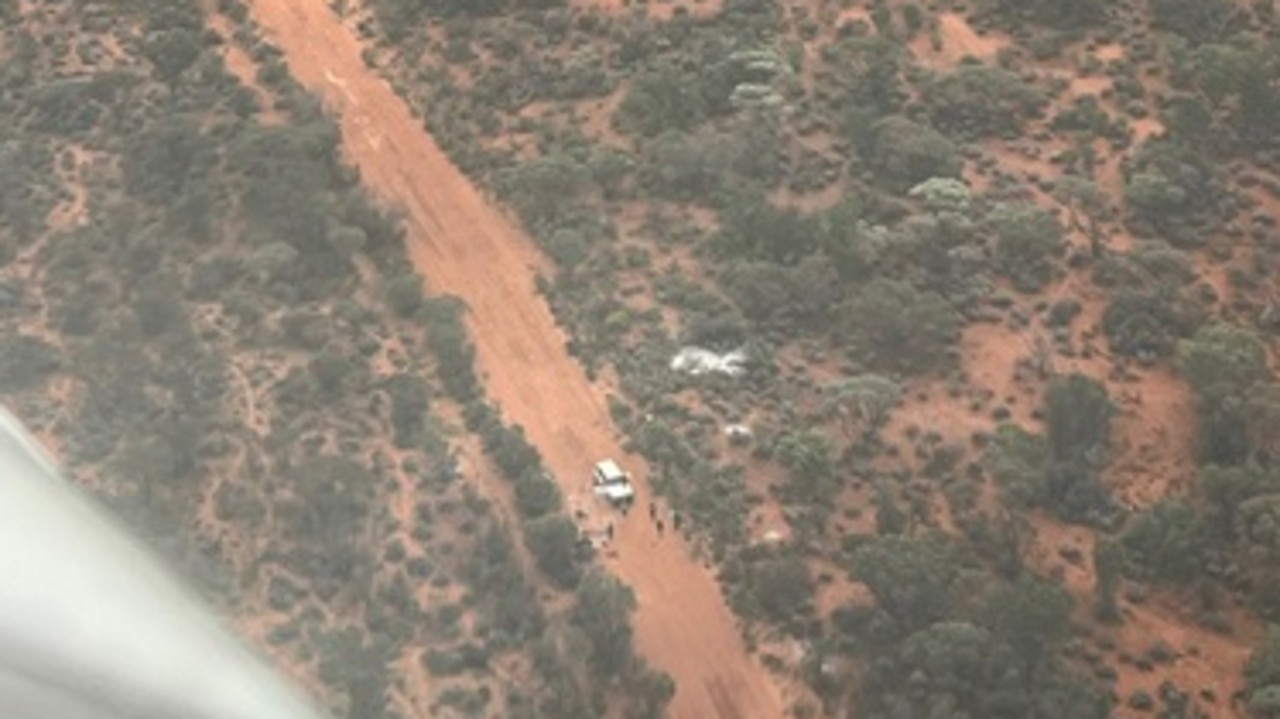
Missing travellers rescued from Aussie outback
A popular holiday island is on the brink of disaster as a sunken shipwreck left to rot for years has started to pollute the nearby environment.
Urgent warnings have been issued over the Greek island of Santorini amid catastrophic fears of toxic waste being released into the sea.
The hulk of cruise ship MS Sea Diamond has been abandoned on the sea floor for 16 years after the 22,000-ton ship ran aground and sank, The Sun reports.

Locals have been desperately fighting for years for the removal of the wreck, fearing a potential catastrophe from the pollution coming from the ship’s fuel tanks.
In a letter sent to the Greek Parliament’s Special Standing Committee for Environmental Protection this week, residents have demanded the necessary decision for the immediate removal of the ship.
“The shipwreck remains on the seabed and continues to pollute, at a slow but steady rate, it erodes daily and at any time it can cause an incalculable ecological disaster,” the letter read.

But local authorities have so far failed to salvage the shipwreck, resulting in a long-running dispute over which one is responsible for its removal.
Local campaigners told The Sun that the island is “heading for disaster” in a major row over a disintegrating shipwreck.
They say the government “has failed the community” in preventing the looming environmental disaster.
It is feared that the toxic chemicals released from the wreckage could poison the island’s coastlines and make it dangerous for beachgoers.

Major pollutants inside the Santorini shipwreck include large volumes of motor fuel and lubricants, hundreds of litres of battery electrolytes, copper cables, toxic heavy metals and other dangerous chemicals.
Experts suggest it could at least take at least 400 years for these pollutants to decompose.
And now they fear the rotting wreck could push the island into a catastrophic event, branding it a “ticking time bomb”.
Loucas Lignos, head of the campaign group The Coordinating Committee of Thira Citizens for the Lifting of the Sea Diamond, explained how the wreck could spark disaster for Santorini.
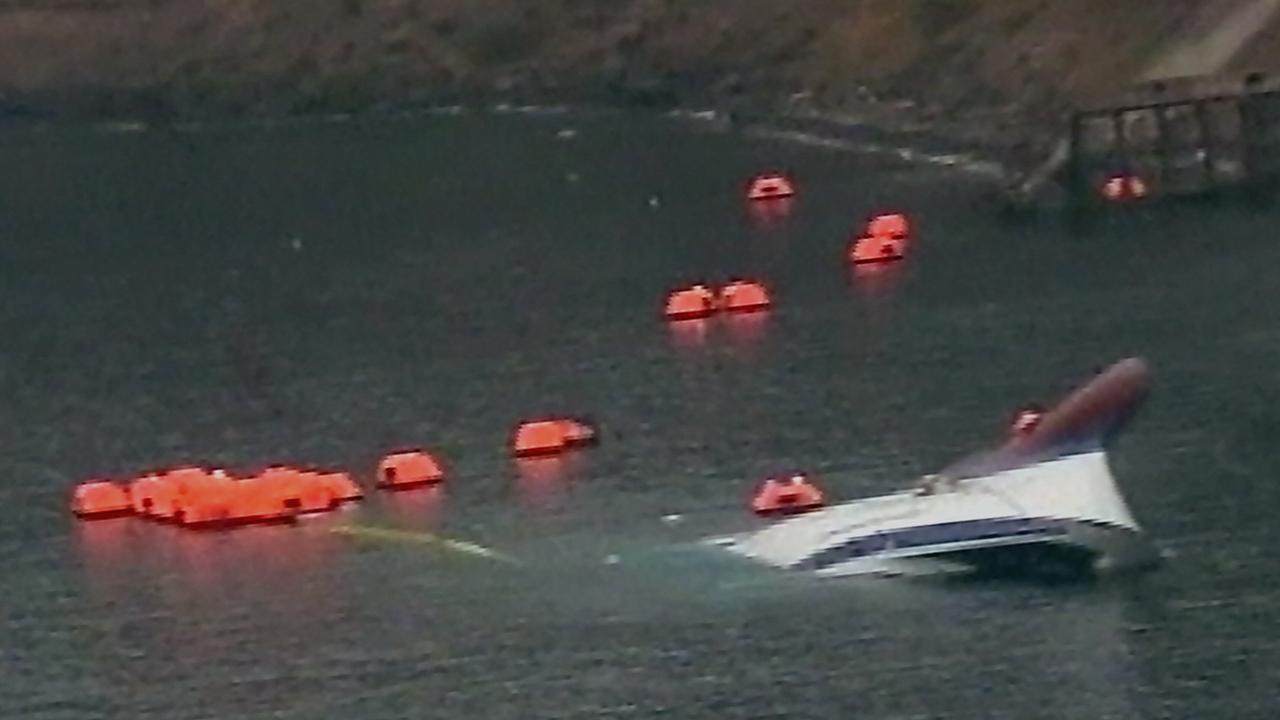
He told The Sun: “The shipwreck is located exactly in the caldera of Santorini, around 800 metres from the port. It is sunk about 100 metres underwater.
“It has 300 tonnes of fuel oils and other toxic chemicals, machine oils, in the generators, wires that are filled with copper, other materials from PBC and plastic that will slowly be diluted into the water over time.
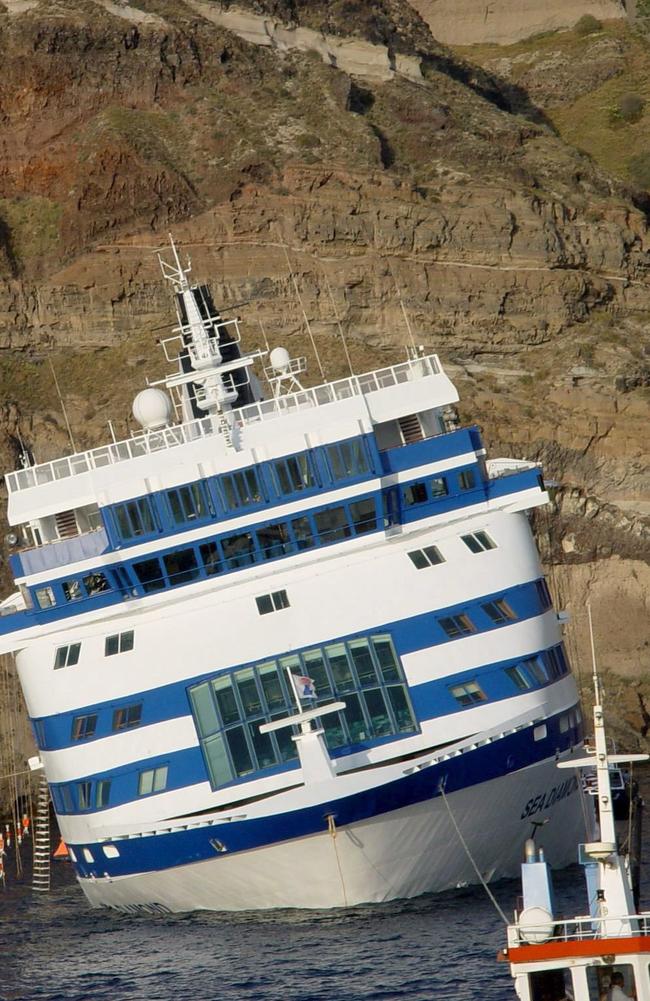
“All these carcinogenic substances are dangerous for humans. At the same time, desalination procedures cannot filter through the dangerous heavy metals.
“The main problem is that these chemicals can enter the human body through bioaccumulation- either via desalination of the water or by fish consumption.
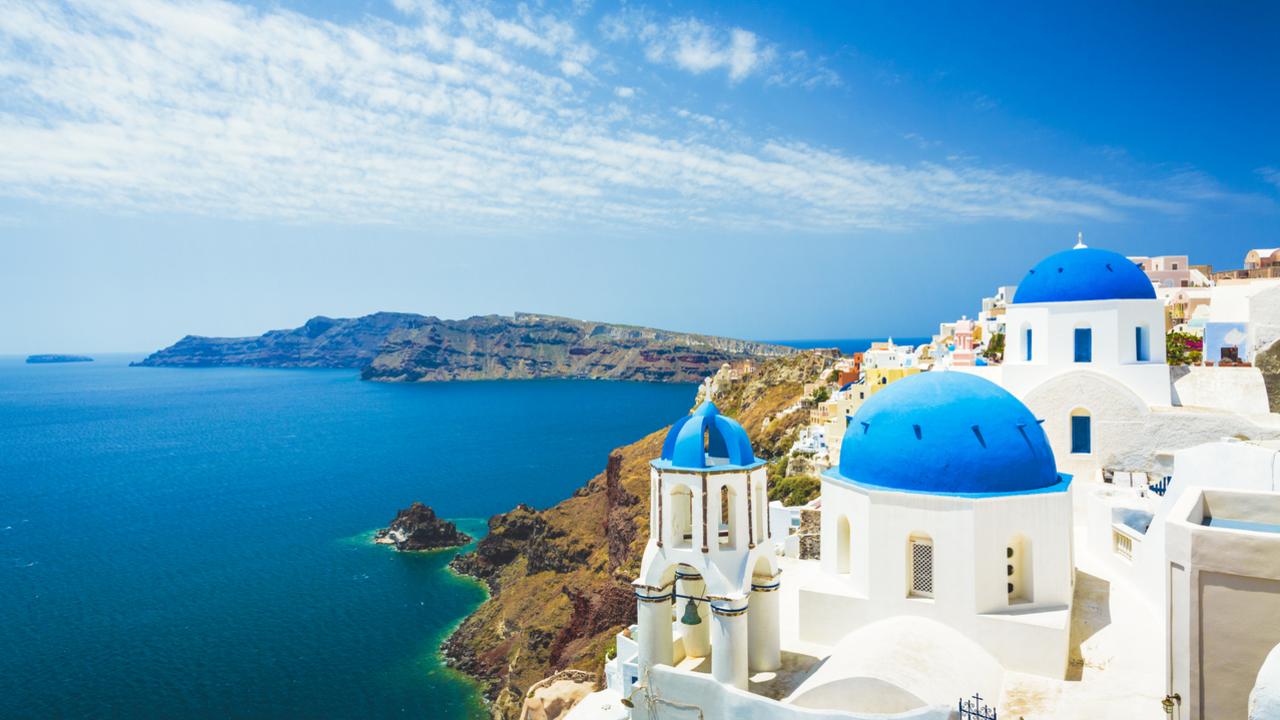
“If that happens it will be a huge environmental disaster for the Santorini beaches.”
It was April 5, 2007, when the cruise ship, owned by Louis Hellenic Cruises, sank on a reef off the island with a total of 1,195 passengers.
The majority of those on-board – mostly Americans and Canadians -were safely evacuated.
More Coverage

The only victims were French dad Jean Christophe Allain, 45, and his 16-year-old daughter Maud whose bodies were never found.
In the months following the disaster, an attempt to decontaminate the waters surrounding the wreck was made, followed by an unsuccessful pumping operation two years later. The wreckage of the 469ft ship was then left to rot – and remains in the sea today as an artificial reef polluting the nearby environment.
This article originally appeared on The Sun and was reproduced with permission
They say a rising tide lifts all boats – if only it did the same for these campers.
A man aged in his 70s has been rushed to hospital after crashing a plane while trying to land at an Australian airport.
A group of travellers have been rescued in the Aussie outback after becoming stranded with their vehicle in remote terrain.
Premium Content
The island of Santorini is hiding an explosive secret
Over three thousand years ago, a volcanic eruption ended an ancient civilization. A new study offers clues about what the next major eruption could look like.

The Greek island of Santorini is an undeniable aesthetic marvel, with its iconic white-and-blue houses perched high above an azure bay. But this paradisical locale has a spectacularly violent origin story.
Santorini is arc-shaped and has a flooded interior because, in the distant past, colossal eruptions have rapidly excavated a hole out of the center of the island. After each eruption, the Santorini volcano starts to recharge its magma supply, readying itself for another gigantic blast. The most infamous of these outbursts took place in the year 1560 B.C. One of the most powerful eruptions in the past 10,000 years, this explosion and the resulting debris and tsunamis arguably marked the beginning of the end of seafaring Minoan civilization.

The island is currently somewhere in the middle of this cataclysmic cycle, and volcanologists are presently most concerned with the island’s Kameni volcano. Effectively a rooftop extension of the considerably larger Santorini volcano, it’s a small mostly underwater edifice at the heart of Santorini with two peaks, Palea and Nea Kameni, poking above the water.
In the year 726, one of Kameni’s eruptions generated significant explosions and threw out myriad molten matter. Based on volcanic rocks recovered from the eruption, this was thought to be the worst-case scenario that Kameni could produce.
Now, a new study, published in Nature Geoscience , reveals that the actual eruption was one to two orders of magnitude more powerful.
They estimate that at least 100 billion cubic feet of lava, ash, and scorching-hot rocks were expelled from Kameni, making it comparable to the formidable 2022 detonation of the submarine Hunga Tonga–Hunga Ha‘apai volcano in the Pacific. “Such an eruption happening today would have major implications,” says Jonas Preine , a geophysicist at the University of Hamburg in Germany, and the study’s lead author.
This is unwelcome news, both for the 15,000 people who live on Santorini, and for the two million tourists who visit it every single year. “It raises the possibility that moderate to large explosive eruptions may be more likely than previously thought,” says David Pyle , a volcanologist at the University of Oxford who was not involved with the new work.
But “this is not a reason for the people of the Aegean to be panicking right now,” says Preine. The risk of a major eruption in the near future at Santorini is low, and there are no signs that one is on its way soon. And this study boosts volcanologists’ understanding of the island and its eruptive risks, allowing scientists to better shield people from future dangers.
“Submarine volcanoes are expensive to study,” says Preine. “But it’s worth it. There’s a whole zoo of hazards that could be associated with them.”
Investigating Santorini’s volcanic history
Santorini is one of many caldera-forming volcanoes around the world—those that seem to operate on cycles culminating in massive explosions that form a cauldron-shaped depression (the ‘caldera’). The island’s volcanic activity dates back around 650,000 years, and in that time, it has produced at least five of these catastrophic blasts, including that civilization-crippling one in 1560 B.C.
Since then, the island’s volcanic story has been written by the two-peaked Kameni volcano. Producing both effusive, lava-spewing eruptions and decently explosive ones, it last erupted in 1950, and has been quiet aside from some seismic unrest between 2011 and 2012. But that doesn’t mean it’s sleeping.
“The volcano is still fairly active, so there is, of course, always some risk,” says Isobel Yeo , a submarine volcanologist at the National Oceanography Centre in Southampton, England who was not involved with the new work. And when it comes to submarine volcanoes, scientists are acutely aware that they “are capable of taking us by surprise.”
The 726 eruption has been a focus for those hoping to understand how hazardous Kameni might be in the future. Historical accounts sound frightening: it was said that the waters of the bay began to boil, before “the entire sea was on fire,” says Preine—after which, deafening explosions blanketed the sky with ash and the land with pumice stones.
You May Also Like

Canary Islands volcano roars to life for first time in 50 years

Did anyone survive Pompeii?

Startling volcanic activity has town in Iceland bracing for crisis
But the volcanic evidence found by scientists didn’t seem to quite match up to those apocalyptic descriptions. “Pumice only forms and is distributed in explosive eruptions,” says Rebecca Williams , a volcanologist at the University of Hull who was not involved with the new work. But “a significant challenge to fully understanding the eruptive history of an island volcano is that most of the rock record is lost to the sea.”
The 726 eruption was no exception: only small traces of it were left on land. As a result, even though this was known to be a dangerous event, “the impact of this eruption was never really taken seriously,” says Preine.
What will Santorini’s next eruption look like?
Hoping to decode more of Kameni’s obfuscated volcanic past, members of the International Ocean Discovery Program drilled into the marine basins of the caldera at various sites, extracting sediment cores each time.
In doing so, they found a considerable volume of ash and pumice that they traced back to the 726 eruption. It quickly became clear that this eruption really was as significant and severe as the historic accounts had portrayed it, one that likely involved thunderous underwater booms giving way to towering columns of ash and pumice.
An explosive eruption throwing out 100 billion cubic feet of erupted matter is certainly a frightening thought. But the reality was likely more nightmarish.
“The estimate they provide is at the lower end, because they are using only the volume of material deposited within the caldera,” says Yeo. “Lots of material was likely transported and deposited away from the volcano during the eruption.”
This study raises the possibility that Kameni is capable of greater harm than anyone suspected. A similarly explosive eruption today “raises the possibility not only of substantial ash and pumice fall, but also tsunamis generated by possible ’sector’ collapse of the island, which is built on unstable pumice deposits,” says Kathy Cashman , a volcanologist at the University of Oregon not involved with the work.
The team’s discovery also means that Kameni’s worst-case scenario is, well, worse than previously thought. Fortunately, scientists have long taken the island’s volcanic risks into consideration.
“Santorini should be taken seriously given the volcano’s tsunamigenic potential and the large number of people that could be affected,” says Amy Donovan , a volcanologist at the University of Cambridge who wasn’t involved with the work. “While this paper does say that 726 was bigger than we thought, it doesn’t significantly increase my concern about what was already a concerning volcano for multiple reasons.”
Unsurprisingly, the volcano is also vigilantly monitored around the clock. “Any signs of unrest are likely to be detected in their earliest phases and warnings issued,” says Yeo.
The implications of this research won’t remain local to the island. Santorini is widely considered to be one of the key sites whose study led to the modern science of volcanology. It’s been extensively examined, its every accessible detail forensically analyzed countless times. “And still, it gives us large surprises,” says Preine. “This volcano that you’re looking at every day has some secrets that we’re still discovering.”
What, then, does that say about other caldera-forming volcanoes around the world, especially those submerged beneath the ocean? “If we’ve been unaware of this at Santorini, we’re surely unaware of similar eruptions at other volcanoes,” says Preine. “This is a huge blind spot for the volcanology community.”
The clock is ticking. “Almost no submerged volcanoes are monitored,” says Yeo, “and this needs to change.”
Related Topics
- VOLCANIC ERUPTIONS
- ANCIENT HISTORY
- NATURAL DISASTERS AND HAZARDS
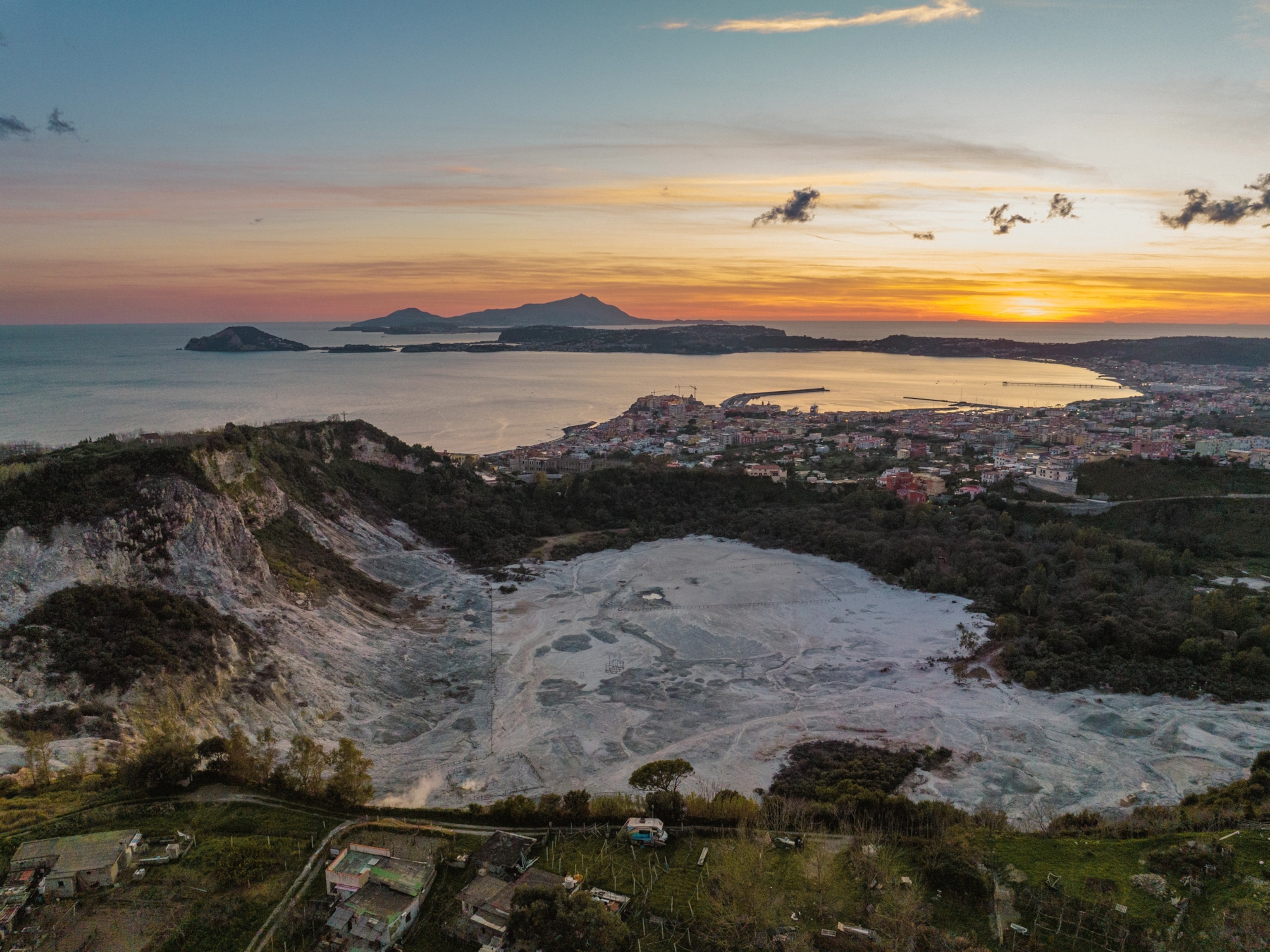
A huge volcano near Naples has been convulsing. What does it mean?

AI just deciphered part of an ‘unreadable’ ancient scroll. Here’s what it says.

These crystal lava shards are ‘four dimensional videos’ of a volcano’s underworld

Volcanoes don’t just erupt on schedule—but they have been in Iceland

3,600-year-old tsunami ‘time capsule’ sheds light on one of humanity’s greatest disasters
- Environment
- Perpetual Planet
History & Culture
- History & Culture
- History Magazine
- Mind, Body, Wonder
- Paid Content
- Terms of Use
- Privacy Policy
- Your US State Privacy Rights
- Children's Online Privacy Policy
- Interest-Based Ads
- About Nielsen Measurement
- Do Not Sell or Share My Personal Information
- Nat Geo Home
- Attend a Live Event
- Book a Trip
- Inspire Your Kids
- Shop Nat Geo
- Visit the D.C. Museum
- Learn About Our Impact
- Support Our Mission
- Advertise With Us
- Customer Service
- Renew Subscription
- Manage Your Subscription
- Work at Nat Geo
- Sign Up for Our Newsletters
- Contribute to Protect the Planet
Copyright © 1996-2015 National Geographic Society Copyright © 2015-2024 National Geographic Partners, LLC. All rights reserved

IMAGES
VIDEO
COMMENTS
The United States travel advisory gives Greece a Level-One travel warning. This is the lightest warning reserved for countries with the lowest crime rates and minimal safety concerns. Basically, for tourists, it means exercising "normal precautions." Greece is categorized as a Level-One country in the Canadian travel advisory, too. But like ...
Reissued with obsolete COVID-19 page links removed. Exercise normal precautions in Greece. Read the country information page for additional information on travel to Greece.. If you decide to travel to Greece: Enroll in the Smart Traveler Enrollment Program () to receive security messages and make it easier to locate you in an emergency. Follow the Department of State on Facebook and Twitter.
Santorini Island Warnings and Dangers Santorini is one of the Cyclades Islands and is located southeast of Greece's mainland. While beautiful, there are ... Expert travel tips, dream destination ...
A travel writer answers 3 common questions for anyone planning a trip to Santorini this year Heidi Fuller-love 2022-05-10T13:01:00Z
Yes, Santorini is a very safe destination. Of course, there are risks everywhere and Santorini has its share of freak accidents: falling rock, aggressive donkeys, crazy young guys on ski jets. And like everywhere the biggest risk in Santorini is vehicle accidents. Always wear a seat belt, don't drink alcohol and drive, don't tour wineries ...
2 Reasons why Santorini is a safe holiday destination! 1. The Greek government was one of the first governments in the world to introduce strict lockdown measures, restricting the spread of the virus and keeping its citizens safe from the pandemic. As a result, you will travel to a place, which the government and local authorities have kept ...
The Greek island of Santorini is one of the country's most popular tourist destinations. Every year, an estimated 811,000 passengers pass through the island's airport — and thousands more visit by ferry and cruise ship.. Most tourists flock to this storied island thanks to the iconic views of Oia, the main town, with its whitewashed houses, blue roofs, and stunning sunset views.
As in many European cities, there are warnings about crimes targeting tourists. The U.S. Department of State urges caution in Greek cities as crimes like pick-pocketing and purse snatching are known to take place in tourist areas, on public transportation (especially the Metro), and in Thessaloniki shopping areas. Car break-ins have been reported and the U.S. Embassy has received reports of ...
FCDO travel advice for Greece. Includes safety and security, insurance, entry requirements and legal differences. ... Get email alerts Warnings and insurance Still current at: 27 April 2024 ...
Santorini Travel Guide. Last Updated: March 12, 2024. Santorini is perhaps the most famous Greek Island. It sees a lot of older tourists and honeymooners (it was made famous as a honeymoon spot by the 1982 movie Summer Lovers ), and is a frequent stop for cruise ships. From its iconic sunsets to its historical ruins to its numerous vineyards ...
6 Santorini Travel Guide: Where to Stay in Santorini. 7 Santorini Travel Guide: Getting Around Santorini. 8 Where to Eat in Santorini. 8.1 Seafood Tavern at Ammoudi Bay. 8.2 Melitini Restaurant in Oia. 8.3 Lolita for Gelato in Oia. 8.4 Salt & Pepper in Fira. 8.5 Naoussa in Fira. 8.6 Art Café in Fira.
The East Mediterranean's most active underwater, and potentially dangerous, volcano, Kolumbo, is five miles northeast of Santorini and part of the same volcanic system. Submerged in the Aegean ...
Why Go To Santorini. A massive volcanic eruption around 1650 B.C. forced the center of what was then a single island to implode and succumb to the sea. Some say that this was the original home of ...
The best times to visit Santorini without the crowds. Peak travel time to Santorini is July and August, when prices soar and hotels, viewpoints and beaches are packed with tourists. The shoulder season months of April, May, early June, late September and October are better times to visit.
All international travelers should be fully vaccinated against measles with the measles-mumps-rubella (MMR) vaccine, including an early dose for infants 6-11 months, according to CDC's measles vaccination recommendations for international travel. Measles (Rubeola) - CDC Yellow Book. Rabies. Greece is free of dog rabies.
Day 3. Ancient Thera, Perissa, Santo Winery, and Fira. For our last day, we'll be stopping in the better known towns we haven't visited yet properly: Fira, Firostefani, and Imerovigli. To treat outselves for all the walking, we'll also stop at Santo Winery to sample local wines and cheeses.
Drink plenty of water, wear light clothing, stay in air conditioning or shaded areas, and follow the advice of local authorities. Medications such as codeine are subject to special rules. Carry a prescription and a letter from your doctor. Measles is common in Greece. Make sure your vaccinations are up to date.
Travel I've visited the Greek island of Santorini twice — and if you think it's just a tourist trap, you're going to all the wrong places. Alison Millington. 2020-03-04T14:38:18Z ...
While you're in Greece: ensure that your belongings, including your passport, are secure at all times. don't keep your passport and other types of ID at the same place and carry a photocopy rather than the original. avoid showing signs of affluence. avoid carrying large sums of cash or unnecessary valuables.
TRAVEL ADVISORIES AND ALERTS: THE DETAILS Enroll in STEP. Subscribe to get up-to-date safety and security information and help us reach you in an emergency abroad. ... You are about to leave travel.state.gov for an external website that is not maintained by the U.S. Department of State.
Call us in Washington, D.C. at 1-888-407-4747 (toll-free in the United States and Canada) or 1-202-501-4444 (from all other countries) from 8:00 a.m. to 8:00 p.m., Eastern Standard Time, Monday through Friday (except U.S. federal holidays). See the State Department's travel website for the Worldwide Caution and Travel Advisories.
Urgent warnings have been issued over the Greek island of Santorini amid catastrophic fears of toxic waste being released into the sea. The hulk of cruise ship MS Sea Diamond has been abandoned on ...
March 25, 2024. The Greek island of Santorini is an undeniable aesthetic marvel, with its iconic white-and-blue houses perched high above an azure bay. But this paradisical locale has a ...